You're currently viewing a custom sorting.
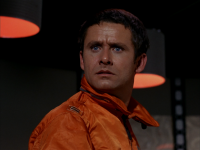
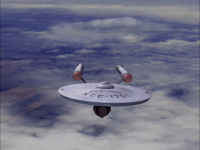
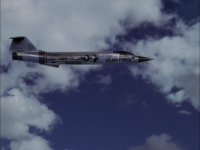
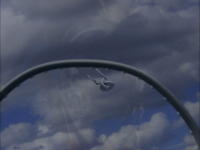
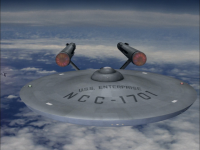
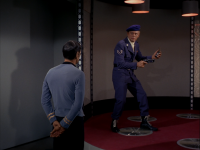
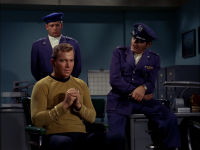
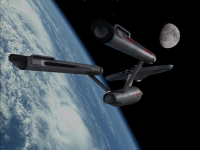
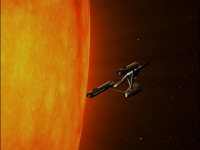
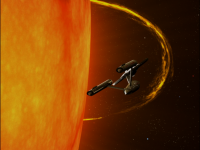
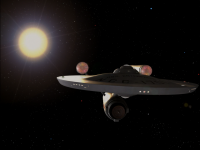
Star Trek TOS - 1x19 - Tomorrow Is Yesterday
Originally Aired: 1967-1-26
Synopsis:
The Enterprise is thrown back to 20th century Earth. [Blu-ray] [DVD]
Filler Quotient:
3, bad filler, totally skippable.
- Pretty lame episode with no significant long term continuity.
Problems
- The pilot beamed off the aircraft shouldn't have been standing upright after transport because he was sitting in the plane cockpit.
- Kirk mentions that the Enterprise is a "United Earth" ship, which seems to contradict the previously retconned establishment of "The Federation" in the previous episode.
- In the remastered version of this episode the remastered shot of the Enterprise orbiting Earth with the moon in the background has an error. The moon is partially covered in darkness, but in the area covered by darkness you can see stars through the moon as if it were transparent.
- Kirk's interrogator threatens to lock Captain Kirk up for two hundred years. A bemused Kirk replies, "that ought to be just about right." However, in fact it would have to be three hundred years for that line to be "just about right" due to it having previously been established that Star Trek takes place in the 23rd century.
Factoids
- Kirk said in this episode that there are only twelve ships like Enterprise in the fleet at this time.
- Spock's rank is established to be that of lieutenant commander in this episode.
- This episode was meant to originally be a follow up to the time warp in The Naked Time.
Remarkable Scenes
- The Enterprise being chased by US fighter aircraft.
- The look on the pilot's face after having been beamed up.
- Spock meeting the pilot.
- The computer being awkward.
- The pilot arguing that his sudden absence from Earth would have just as adverse an effect on the timeline as his returning with information from the future would followed by Spock countering the pilot's argument by claiming that according to his research, the pilot never contributed anything significant to history anyway. Ouch.
- Spock discovering that the pilot must be returned to Earth after all so that he may father a child who goes on to make significant contributions to history.
- The Air Force sergeant's behavior after having been beamed up.
- Kirk's interrogation.
My Review
A gravitational anomaly accidentally propels the Enterprise into the past whereupon the crew accidentally contaminates the timeline. I've never been a fan of the use of time travel in science fiction mostly because the power to travel through time is unimaginably dangerous in its implications and the resultant time paradoxes are a storytelling nightmare. Most time travel stories irresponsibly gloss over this stuff and this episode is no exception. While this episode goes to great length to clean up the timeline to remove all contamination, it does so at the expense of the credibility of the Enterprise's century because we've now learned that the magic time travel technique Spock invented in The Naked Time is a pretty damn reliable tactic. Twice now we've seen the Enterprise travel through time just by Spock crunching some numbers and plugging them into the ship's computer and twice now the implications of this power have been ignored as relatively trivial.
The truth is that no society, not even one as enlightened as the Federation, or United Earth, or whatever they're calling themselves now is going to ignore this kind of power the way our heroes seem to be doing. If Spock's magic time travel formula is as accurate, useful, and reliable as depicted in this episode and as depicted in The Naked Time, then why not go back in time and erase the Earth-Romulan war in the same fashion they erased their mistakes in this episode? Why not travel into the future in order to plunder its technological advancements? Why not do any of a million possible things this sort of technology enables? I'll tell you why. Because the writers have failed to properly comprehend what would realistically ensue if time travel technology were actually invented.
But misuse of time travel isn't this episode's only sin. I'd be negligent if I didn't mention the embarrassing "sensual computer" scenes, or the fact that Captain Christopher managed to escape his quarters because nobody felt it necessary to place a guard, or the even more idiotic decision by Spock to inform Captain Christopher of the significance of a child he hasn't even had yet. It's a good thing Spock's magic time travel formula let them erase that mistake.
What was with that whole transporter merging memory wiping thing anyway? Kirk says he'll transport Captain Christopher to a time before any of this happened which will cause him to have no memory of these events. Is the transporter somehow combining the uncontaminated Christopher with the contaminated Christopher and erasing the memory of future events? If so, since the goal is to no longer have a contaminated Christopher, then why not just blow the contaminated Christopher right out the airlock instead rather than risking a dangerous transport operation in the middle of the whole silly slingshot effect? Doesn't this transporter merging of the two of them effectively kill the contaminated one anyway? Because I fail to see the difference between that and merely executing the contaminated version. Either way an uncontaminated version lives out his normal life as history intended.
As written, this episode is simply riddled with far too many technical and logical problems to be worth many points. Let's all hope the next time they use time travel on Star Trek they treat the subject with a bit more care and take the implications of what would realistically ensue due to their plot device a bit more seriously.

Star Trek TAS - 1x05 - More Tribbles, More Troubles
Originally Aired: 1973-10-6
Synopsis:
The tribbles return for more trouble as the Enterprise encounters Cyrano Jones, the Klingons and a new breed of the popular pest. [Blu-ray] [DVD]
Problems
- While Scotty was beaming the passenger from the scout ship onto the Enterprise, he magically acquires and loses a mustache several times, probably because they were using stock footage of the mustached transporter operator guy for half of the cuts.
Factoids
- This episode is a kind of "part 2" for TOS: The Trouble with Tribbles.
- We get to see a Klingon emblem for the first time in this episode.
Remarkable Scenes
- The Klingons attacking the scout ship.
- The Klingons disabling the Enterprise with their new weapon.
- Uhura, regarding the ship being defenseless: "We could always throw rocks!"
- Spock: "You can't afford to lose that grain!" Kirk: "I can afford to lose the Enterprise even less!"
- Kirk winning against the Klingons using the robot ships.
- A tribble eating creature! Hahaha.
- The tribble eating creature trying to sink his teeth into a giant tribble.
- Kirk reluctantly defending Cyrano Jones from the Klingons.
- The Klingons buried in tribbles.
- Kirk buried in tribbles.
My Review
This episode is a funny homage to TOS: The Trouble with Tribbles. Indeed, it's funnier than the original, even if less intelligent a plot. You have to forgive it for that, as TAS was largely marketed to children. Granted it was cliched to deliberately bury people in tribbles again, I would have seen it as a missed opportunity if they hadn't taken advantage. :)
The following are comments submitted by my readers.
- From Orion Pimpdaddy on 2009-10-14 at 5:02pm:
Funnier than the original? This is a tiny fraction of comedy compared to The Trouble With Tribbles.
Oh yeah, is it me, or are they mispronouncing the name of the grain (quadrotriticale) throughout this episode? - From CAlexander on 2011-04-06 at 2:42am:
I didn't think it was as funny as the Trouble with Tribbles, but it was cute. As you say, a less intelligent plot.
- The tactic of using the robot freighters to overload the Klingon battlecruiser was interesting because it was a real, legitimate tactic, rather than the "make up imaginary scientific words" tactics so often used in later Star Trek shows.
- A weapon that can render the Enterprise helpless and susceptible to boarding hardly sounds useless. I guess it was too expensive, and the Federation must have developed counter-measures.
- The Klingon captain's voice is so wimpy sounding, it is really hard to imagine this is the same species that becomes so ultra-macho in later shows.

Star Trek TNG - 2x13 - Time Squared
Originally Aired: 1989-4-3
Synopsis:
The crew encounters a duplicate Picard. [DVD]
Problems
- Picard leaves sickbay and orders Troi to watch the other Picard. An argument between Pulaski and and Troi ensues regarding whether or not Picard is fit to command. Troi sticks up to Picard, but then she just leaves! Defying Picard's order for her to stay! One wonders just how much faith the counselor has in Picard's command ability after all...
Factoids
- Riker's mother died when he was very young.
Remarkable Scenes
- Worf: "Delicious." While everyone else hates the eggs. Ah the everlasting contrast between human and Klingon taste buds!
- Picard: "So you're saying I should sit down, shut up, and wait."
- Picard second guessing himself.
- The graphics of the vortex and the ship interacting with it were well done.
- Picard: "Release him." Pulaski: "Do you know what you're doing?" Picard: "No. Release him."
- The dialog between the two Picards is great.
My Review
The plot of this episode is extremely slow paced. A lot of sitting around, waiting for something to happen. There's nothing necessarily wrong with that, as it's believable for sure. However the whole "out of phase" and "off the mark body clock" stuff is pushing what I consider acceptable technobabble. I also think that early in the episode Picard was acting extremely out of character. Though he improved quite a bit as the episode went on. The story concept is definitely intriguing but I can't help but feel empty at the end with the inconsequential ending. The whole thing seems a bit underwhelming.
The following are comments submitted by my readers.
- From DSOmo on 2007-06-25 at 9:50am:
- One of the last times Picard goes to sick bay, Troi follows him in a subsequent turbolift. Yet when Picard arrives in sick bay (after a commercial break), Troi is already there!
- Having an ensemble cast makes it difficult to provide lines for all the actors in every episode. However, this episode goes a bit far. After Picard kills Picard, he calls for Dr. Pulaski. When Pulaski shows up, Chief O'Brien comes with her! Does he moonlight as a medical technician? Of course, the real reason O'Brien is there is so he could be in the shuttle bay to see the 2nd Picard disappear. This allows him to get a few lines of dialogue in this episode.
- While the Enterprise is flying into the vortex, everyone bounces around in their seats on the bridge. However, O'Brien in the shuttle bay is standing perfectly straight even though the floor is moving around.
- In the episode "11001001," Picard and Riker go to the "Weapons Room," and use a voice print identifier to get access to some phasers. On a ship with civilians (especially children), it is not a good idea for phasers to be accessible easily. Yet in this episode, Picard simply reaches back to a wall panel, flips it open, and grabs a phaser. With these easy access wall panels, why do they need the Weapons Room? - From TashaFan on 2008-09-29 at 2:18am:
Of course the quick access to the phasers is for the convenience of the script... but we can make a case for it. The crew is most likely to need phasers on an away mission, which would mean the phasers should be stowed near the shuttles and near the transporter. And although it's ridiculously easy to steal a Federation shuttle, we can assume the shuttle bay at least SHOULD be a secured area where children and civilians can't wander.
On another subject I have to disagree that the ending is inconsequential. On one level it's a "RESET button" episode - everything ends up how it was. On another level, Picard ruthlessly guns down someone to save the ship... and that someone is himself. Does one have more right to kill a version of oneself from the past (future?) than to kill someone else? In any event the first time I saw thoughtful, pensive, slow-to-raise-shields Picard just shoot and kill the other Picard, and then leave, I was kind of shocked. - From CAlexander on 2011-04-04 at 1:14pm:
I think I pretty much agree with you on your comments. Usually I love this style of episode. But not this time. It is just off. They say things which don't match the action or make sense. Like Pulaski complaining that Picard isn't fit to command because he has been under intense stress. Where did that come from? The whole situation only started a few hours ago! Then suddenly Picard is asking the other Picard for advice. Why? Why ask future Picard for a plan when now Picard knows the same info and could make the same plan? And why did Picard shoot Picard? - From Ted on 2011-07-21 at 12:26am:
An interesting point is raised in your criticism. In order to enjoy SciFi/Fantasy, and in fact all dramatization, one must allow a 'willing suspension of disbelief'. When a dramatization steps beyond an individuals threshold of disbelief, the 'illusion' is compromised and the ability to empathize and enjoy a show is lost. For example, I don't believe in magic/superstition and so I have a hard time enjoying most fantasy movies.
All that said, this episode didn't violate my sense of ST believability and I enjoyed the fact that the phenomenon remained a mystery. All to often in ST, such phenomena are explained with a neat and tidy bit of technobabble that tends to lessen the experience for me. I can certainly understand why you didn't care for it, but I rather like this episode. 8 out of 10 - From Ggen on 2012-02-25 at 11:47pm:
This... did not really work out. There is a somewhat interesting premise and a promising opportunity to explore Picard's psyche, but it doesn't really come together.
One - I don't understand why every space anomaly out there has to be a mysterious lifeform. It seems like Troi picks up a "consciousness" and an intent from everything and its mother... Can't some things just be things? Can't some anomalies just be anomalies? (I'm not faulting how they write Troi, I'm faulting how they write these damn anomalies...)
Two - no question, the technobabble here stretches credibility, especially in light of the countless other time travel episodes where people act more or less normally, despite being "out of phase." The future Picard being sort of comatose and then zombified, not really aware of what was happening around him was just sort of annoying and disappointing.
Three and Four - agree with Kethinov about all the other points... the pacing, the lackluster ending...
- From One moon in blue pants on 2012-03-02 at 7:29am:
I love this episode, it is one of my fav. I love the technobabble scenes in the conf. room. I love the pacing of this ep. It is not rushed like so many others, things are just aloud to happen. I think this might be the first ep. in which Troi has a little betazed orgasm-mind meld kind of moment when reaching out to future Picard. So yeah I give this one a 9. Plus the band Orbital used a sample from worf in one of their songs so it is all just too awesome.

Star Trek Dis - 1x02 - Battle at the Binary Stars
Originally Aired: 2017-9-24
Synopsis:
Face to face with Klingon vessels, the U.S.S. Shenzhou prepares for the possibility of war if negotiations fail. Amidst the turmoil, Burnham looks back to her Vulcan upbringing for guidance.
Problems
- Just when we think the Klingon forehead problem is solved, it turns out that just a decade before every Klingon is shown to be human-like, the entire Klingon high council is shown to have bumpy foreheads and no hair. At this point the best rationalization is to say that Klingon fashion is mercurial...
- In keeping with our fashion problems, the uniforms shown in this series are quite problematic. This series takes place two years after TOS: The Cage, and yet the uniforms look nothing like either The Cage or any of the material aired in later TOS episodes. To rationalize this one, we have to assume that like the uniform confusion in ST VII: Generations, Starfleet was playing around with different uniform designs and different ships got different uniforms...
- Which brings us to the ship interiors! Like the uniforms, we have to assume that Starfleet was experimenting with different industrial designs along with different uniform fashions. Notably, the Shenzhou is stated to be an older design. Indeed, it looks more like Star Trek: Enterprise than TOS. Perhaps all the ship interiors seen on this series are the older design along with the uniforms too?
- A member of the Klingon high council was depicted as female. This seems pretty unlikely given that in DS9: The House of Quark it was established that Klingon females cannot lead Klingon houses without a special dispensation. Likewise, the Duras sisters on TNG used a puppet male heir to control the House of Duras, as females were not allowed to lead a great house. It's possible the Klingon female in this episode did indeed possess a special dispensation though. It's also possible that Klingon culture was less sexist during this time period.
- Burnham's chance of survival for that decompression was probably much higher than 43%. So long as she exhaled first to prevent injury caused by holding her breath, there was little reason to doubt her survival absent perhaps the radiation concern from the binary stars.
Factoids
- Burnham arrived on the Shenzhou in 2249, seven years prior to the start of the series.
- This episode establishes that Burnham is the only human ever to attend the Vulcan Learning Center and the Vulcan Science Acadamy.
- The Shenzhou is stated to be an old ship.
- This episode establishes that T'Kuvma invented the modern Klingon cloaking device.
Remarkable Scenes
- Burnham's flashback to her awkward first meeting with Georgiou.
- Georgiou relieving Burnham of duty for insubordination.
- T'Kuvma summoning the entire high council to the beacon.
- The Klingons attacking.
- Connor: "Why are we fighting? We're Starfleet. We're explorers, not soldiers."
- Connor being suddenly blown out into space by battle damage.
- Sarek rescuing Burnham with a mind meld in a flashback. One wonders if Picard acquired Sarek's memories of Burnham from TNG: Sarek?
- Burnham observing the space battle through the brig forcefield into open space.
- The Shenzhou being rescued by the Europa.
- The Europa being bisected by a kamikaze strike from a Klingon vessel.
- The Europa self-destructing to take out the Klingon ship that rammed it.
- T'Kuvma leaving survivors only to serve as witnesses to his victory to spread fear throughout the Federation.
- Burnham talking the computer into letting her jump through a vacuum. While Kirk talks computers to death, Burnham talks computers into saving lives!
- Georgiou bombing T'Kuvma's ship using a dead Klingon body being retrieved.
- Georgiou and Burnham attempting to capture T'Kuvma only to see Georgiou killed by T'Kuvma and T'Kuvma killed by Burnham.
- Burnham being court martialed, convicted, stripped of rank, and sentenced to prison.
My Review
Star Trek: DiscoveryShenzhou kicks into high gear in this thrilling followup to the pilot's cliffhanger at the end of the first episode. It's nice to see lasting, painful consequences result from Burnham opening pandora's box with the Klingons. Georgiou is tragically killed, T'Kuvma is martyred, and Burnham is in prison for starting a war! Having the main character's life permanently upended in this way sets the stage for a kind of drama never before seen on Star Trek, a welcome change of pace.
This skillfully-written episode makes good use of foreshadowing and parallelism. Burnham's character is shaped by a traumatic attack by the Klingons which killed her parents, leaving her a ward of Sarek. While not depicted in as much detail, it turns out a parallel story played out for T'Kuvma as well, as he apparently lost his parents at a young age too and likewise engaged in a process of self-discovery after "discovering" his father's ship and vowing to restore honor to his house.
Their similar childhoods ironically make them particularly hostile to each other: Burnham fears the Klingons as much as T'Kuvma fears the Federation. Burnham is afraid that the Klingons could take something or someone else dear to her and T'Kuvma sees the Federation as an existential threat to Klingon identity.
Indeed, both of them suffer exactly that which they fear most. T'Kuvma succeeds in provoking a war with the Federation, but in addition to costing him his life, we know from other Star Trek productions that the war doesn't end well for the Klingons. Likewise Burnham watches Georgiou die at T'Kuvma's hands. Then in her moment of grief with her self-esteem at perhaps an all time low, she declares, "We are at war and I am the enemy," shortly before being stripped of rank and sentenced to prison. All this was nicely foreshadowed in the previous episode when Georgiou said to Burnham, "I trust you with my life, but it doesn't change the fact that you're lost." Georgiou's trust was misplaced and Burnham is even more lost now than she may have been before.
Another interesting piece of perhaps unintentional foreshadowing from the previous episode is when Georgiou asked Burnham in the desert how long the storm would take to come crashing down on them. She estimated one hour, 17 minutes, and 22 seconds, or roughly 77 minutes. If you think of the coming of a storm as a metaphor for the battle with the Klingons, the grimmest part of the battle for our heroes is roughly 77 minutes into the screen time of the Star Trek: DiscoveryShenzhou series so far.
While this episode is terrific overall, there are some flaws to take note of. Aside from the copious continuity problems introduced here and noted above, Sarek's mind meld across a thousand light years of space due to some kind of subspace katra bond strains suspension of disbelief pretty hard. And what was with that ridiculously dark room the court martial was conducted in? Shadowy figures convicting our hero isn't dramatic, it's dumb. Do judges in the real world turn off all the lights for dramatic effect when sentencing criminals? No. So turn on some frigging lights!
Those are small nitpicks for the most part though and by and large this was a fantastic piece of drama. Putting Burnham in such a dark place (the figurative part anyway...) is an incredibly compelling way to set up a gripping story about how she grapples with both her personal losses and her responsibility to Federation society for having started the war with the Klingons. It seems clear that Star Trek: DiscoveryShenzhou is not at all interested in repeating Star Trek: Enterprise's mistake of failing to depict the single most important event in the historical canon of the era that it is depicting. Enterprise failed to depict the Earth-Romulan war even with four seasons. But this series started the war with the Klingons in episode two. And that's awesome.
The following are comments submitted by my readers.
- From Mike Chambers on 2017-09-25 at 2:57pm:
Here I am the morning after Discovery debuts, thinking "I wonder if there's a review on kethinov.com yet", and of course there is! You're definitely on top of things.
I've had my worries about how this show would turn out for multiple reasons, and I'm happy to report that so far, my fears have largely been allayed! I am extremely impressed with the first two episodes. It feels very much like Star Trek, but perhaps with a bit of a darker tone than previous series. I may be disappointed in the future if it turns out that the entire series is this dark, as Star Trek is supposed to be optimistic overall.
There is excellent drama here, and they have done a fantastic job so far with building these characters. I'm looking forward to seeing how their situations evolve from this point, and I am now officially excited to see future episodes.
My only real problem is political in nature. They appear to be using the Klingons as an allegory for nationalists, but are mishandling it. They seem to be ascribing a bit of a racial purist motive to it, rather than the cultural and civic nationalism ideals to which the vast majority of nationalists actually adhere to. It's annoying, but this is a product of the entertainment industry, after all. It would be asking a bit much for them to understand the country outside of their bubble, so I'm not letting it ruin my experience.
I have thoroughly enjoyed Discovery so far, and I want more! - From Rick on 2017-09-25 at 9:56pm:
Star Trek being all about war is not Star Trek to me. It appears that this series will be about as far from Roddenberry's vision as possible, as all new productions since Enterprise have been. I understand that these type of stories are the modern tv way, but that way is not for me and apparently Star Trek no longer is either. - From Matthew on 2017-09-26 at 7:16pm:
I found this gripping, particularly the last act of this part which sums up both my excitement and concern for how this series could go.
It features principle and bravery plus the protagonists' plan not going their way with (crucially) very real consequences - that feels quite liberating in that it opens up a rich seam of story-telling. Even 'In the Pale Moonlight' (DS9) doesn't quite go that far (though that's a great episode and I bet the writers took some inspiration from that great 'It's a FAAAAKE' moment!) That could be the foundation of a great series. On the other hand, I worry slightly about the world-building and tone being undermined by aesthetic choices about it being a 'darker' show. That crass scene with the judges' faces in shadow was seriously grating and I'm glad it didn't just bother me.
We'll see how it evolves - I'll definitely be watching (and I'm glad that we don't have to pay 6 dollars a month on top of Netflix to get it in the UK - my other big worry is that the economics don't work out for CBS and that it dies a death nothing to do with its creative merits!) - From Graham Bessellieu on 2019-07-14 at 7:50am:
All about flash; lacks the heart of the best of Trek. - From Mike Chambers on 2020-08-22 at 2:01am:
I happened to be browsing this site again three years after I made that comment up above, and I think I need to officially retract everything I said about Discovery.
I couldn't make it past around halfway through the first season. The depressing darkness and violence just never let up, and I ended up not really caring about the characters.
I agree with Rick and Graham. This is not Star Trek as it should be. The Star Trek we've all come to love. Some might say that things can change. Yeah? I guess, but if this is how it's going to be, CBS can count me out as a continuing fan.
Picard isn't good either, and a lot of the reasons overlap. Kurtzman's gotta go. - From Azalea Jane on 2021-09-06 at 4:25am:
It's weird having it stated/assumed that Burnham somehow started this war. No she didn't. T'Kuvma was determined to start a conflict. He damaged that relay to lure the Federation out to the beacon and attack them. I don't think Burnham's "shoot first" strategy would have worked either; that would have just convinced T'Kuvma even more that the Federation was out for them. The Klingons were going to start shooting either way. No, I think that, short of the Shenzhou high-tailing it out of there immediately, there was nothing that was going to prevent a conflict. Burnham is just a scapegoat. Moreover, despite various comments I've read that accuse her of this, Burnham isn't responsible for Georgiou's death; Georgiou is. As the captain, she made the call to take Burnham's advice of attempting to capture T'Kuvma. She knew the risk and took it.
Life in prison seems super harsh! I could understand being dishonorably discharged, and perhaps face some other consequence, but life in prison?? That's for premeditated murder or something. Burnham didn't murder anyone; she accidentally killed the torchbearer and then she killed T'Kuvma in battle. Mutiny isn't a life offense. Neither is a Vulcan neck pinch. You'd think that, 250ish years into humanity's future, we would have moved beyond such blatantly punitive "justice". Life in prison or quarantine should really be reserved only for people who truly cannot be rehabilitated or reintegrated into civil society without posing a danger. Well, maybe subsequent episodes will help this make sense more. So far I've only watched these two. (And yeah, the shadowy courtroom was cheesy as hell.)
I thought the connection to Sarek was interesting. In 2256, Sarek would have been 91 and Spock 26. I agree the thousand-lightyear telepathic phone call was stretching it, but I suppose stranger things have happened in Trek.

Star Trek DS9 - 2x25 - Tribunal
Originally Aired: 1994-6-5
Synopsis:
O'Brien is arrested by the Cardassians and put on trial for a crime he insists he did not commit. [DVD]
Filler Quotient:
2, filler, but an enjoyable episode nevertheless. You can skip this one, but you'd miss out on some fun.
- There's no essential plot or exposition in this episode that renders it unskippable, but it's a decent episode, even though it could have been better.
Problems
None
Factoids
None
Remarkable Scenes
- O'Brien finding it difficult to leave the station.
- Keiko appearance.
- O'Brien's reaction to being captured by the Cardassians.
- O'Brien's objections to the Cardassian legal system.
- O'Brien to Odo regarding his capture: "They did some dental work that wasn't much fun"
- Odo pestering Makbar at the trial.
- Makbar laying into O'Brien for being a racist against Cardassians.
- The abrupt change in the attitude of the Cardassian court when Sisko showed up with the Cardassian spy.
My Review
This episode was the much anticipated closer look at the Cardassian justice system. We've gotten tidbits of information about it since TNG: The Wounded and onward. This episode bears the most resemblance to TNG: Chain of Command. When O'Brien is first captured by the Cardassians, his treatment is nearly identical to how Picard was treated in that episode. Unfortunately, this trial is largely a waste of time. Sure, all the Orwellian references were kind of amusing, but it was also pretty heavy handed. After a while I was thinking to myself "yeah, yeah, I get it. Totalitarian dictatorship with show trials."
The following are comments submitted by my readers.
- From Pete Miller on 2006-06-12 at 2:45am:
I enjoy any O'Brien episode, but this one is spectacular. I especially love the speech O'Brien gives Odo in the cell about his personal convictions and morality, as well as loyalty to the federation despite his own opinions. He is truly a good man, and one of my favorite characters in Star Trek. It's a damn shame he didn't get more screen time in TNG. Him and Picard would have gotten along well - From milesmust on 2011-09-04 at 1:39am:
This is very clearly a quintessential "O'Brien must suffer" episode (the producers intentionally put Miles through the meat grinder at at least once per season, src: http://en.memory-alpha.org/wiki/Star_Trek:_Deep_Space_Nine).
This is quite fascinating to watch, although I agree with the reviewer there is a touch of absurdity about the court proceedings.
The judge is too lenient at certain times, too stubborn at other times, depending on what the plot requires. It really doesn't seem to make much sense - since the purpose and proceedings of these show trials is so well established, why wouldn't she just find Odo in contempt and have him removed, rather than put up with his attempts to defend Miles?
I haven't fully thought it through, but it might make more sense in light of the revelation at the end: that this was a highly politicized ploy from the very beginning, rather than some ordinary trial. This particular show trial had an interplanetary audience as well as its usual audience, and Odo had a legal right to serve as Nestor (which was a cool twist, btw).
So, pretty good episode, but whether it makes sense or not, much of the trial proceedings are kind of irritating to watch. - From Axel on 2015-05-17 at 7:09am:
So let's see, we have TNG: Face of the Enemy (Troi abducted), TNG: The Mind's Eye (La Forge abducted), DS9: In Purgatory's Shadow (Bashir abducted), and also this episode...O'Brien abducted. It seems to me that the Federation has a border control problem, and going anywhere on your own in a shuttlecraft is pretty risky.
I also thought the Cardassian judicial system was a little too absurd. Granted, trials are often for show in dictatorships and military juntas of any kind, but in this episode it seemed to be almost comically ridiculous. It would be more apropos to have a Cardassian regime that simply makes its victims disappear, denying them the opportunity to be martyrs or visibly oppose the state. This insidious reality of totalitarian regimes is something that has been described by those who opposed both the Nazi and Soviet systems.
In any case, I did enjoy a few of the plot twists and I thought it had some terrific acting. - From Zorak on 2016-05-14 at 4:03pm:
Episodes like this annoy me a bit. It's hard for me to take the plot seriously when it's based off of the fact (shown time and again throughout Star Trek) that any foreign government can abduct a Federation citizen for whatever reason they choose with no consequences. They kidnaped the Chief of Operations for Depp Space 9. How is that not an act of war? The excuse of the week should hardly be relevant. - From ChristopherA on 2020-07-21 at 6:46am:
I was amused by the Cardassian “legal system”. It is sort of a cross between two real-world concepts – show trials which look like a modern trial and pretend to determine guilt or innocence but are actually rigged by the state, and the fact that many cultures have simply given authority figures the job of deciding who is guilty and punishing them, with nothing like a modern trial at all. It was somewhat absurd, but interesting. However, not quite interesting enough to fill a whole episode, it did get somewhat repetitious and stretched.
I agree that the idea the Cardassians could just abduct anyone at any time with no repercussions was disturbing and kept weighing on my mind the entire time. Another episode where I felt our heroes were insufficiently outraged by what was going on, as if the Cardassians were justified in entering Federation space, overpowering and capturing a Federation vessel, and kidnapping a Federation officer simply because they unilaterally declared that person to be a criminal (which, in Cardassian terms, means an enemy of the Cardassian state – a category which likely includes an awful lot of Federation citizens).
Now, I can believe that the episode could have gone forward as shown anyway, with the Federation letting it slide. Previous episodes with the Cardassians have made clear that the Federation really wants peace and is willing to make sacrifices to get it. Starfleet Command may well be willing to sacrifice one life to avoid the devastation of a war they do not feel ready to fight. But you would at least expect more displays of outrage, saber-rattling, and heightened tensions over this act of war.
- From Steven Wrieden on 2023-08-26 at 8:14am:
This was certainly inspired by Franz Kafka's The Trial.

Star Trek Voy - 3x22 - Real Life
Originally Aired: 1997-4-23
Synopsis:
The Doctor experiences family life. [DVD]
Problems
None
Factoids
- Harry beamed a whole shuttle directly into the shuttle bay in this episode. Interesting.
Remarkable Scenes
- The doctor's "ridiculously perfect" family and Torres' reaction.
- Tom hitting on Torres.
- Tom getting sucked into the space anomaly.
- The death of the doctor's holographic daughter.
My Review
The doctor chooses another name in this episode. This time it's "Kenneth". I guess the events of the episode make it seem pretty obvious why he doesn't stick with this name either. One wonders how Torres could be so cruel to the doctor as to program up something like that. The episode would have been better if Torres' involvement in it hadn't ceased immediately after she reprogrammed the doctor's family. Overall, it's very moving in the end, and I enjoyed the anomaly of the week plot too. But the distinct lack of real consequences leaves one sort of unsatisfied.
The following are comments submitted by my readers.
- From Rob on 2008-04-26 at 7:52pm:
I cannot stand these 'holodeck emotional attachment' stories. None of these characters are real... they aren't sentient, they're just
3-D video game characters. I don't understand why anyone would get so invested in a simulation that they wouldn't just "reset program" when its not going the way they want. I have the same problems when Fair Haven comes into the picture later. None of the emotional struggles people seem to have with these make-believe characters makes any sense to me, so I can never get into the emotions of the story. - From Nicholas Donaghy on 2008-05-07 at 4:41am:
Yet look at how passionate some people are in discussing their favourite Star Trek characters. They are no more real to viewers than holodeck characters are to the crew - indeed, perhaps less so, as it is possible to directly interact with holodeck characters in a way we cannot with TV characters.
Should we discard any episode dealing with the Doctor as he is not "real" and thus nobody should care about events involving him? Are any scenes suggesting the crew has an emotional attachment to the Doctor inherently meaningless and silly?
Further, in this episode, the focus of this episode is on the family's impact on the Doctor, rather than the family themselves. If holodeck characters are a tool to develop main characters, that seems quite a useful purpose for them. - From thaibites on 2014-04-20 at 2:24pm:
I always used to complain that TNG was a soap opera. Well, this tear-jerker is more soap opera than All My Children. It's well-done, but it's still a soap opera.
I have some new names for this series:
As the Voyager Turns
All My Voyagers
Voyagers Hope
Secret Voyager
Days of Our Voyager
The Young and the Voyager
Guiding Voyager
Another Voyager
- From Sylvain on 2015-04-14 at 10:43pm:
Can anyone claim they don't feel anything at all when reading a depressing story? People get upset when their favourite characters from a book or TV series die, so I find it perfectly logical that The Doctor would be devastated after these events. He was quite emotionally invested in the program.
Kethinov, in your review you're calling Torres cruel, but I'm not sure you understood that she only added some randomized behaviour to the characters. The development of the family could've gone in any direction. I'm quite sure she did not plan the dramatic end of the program.

Star Trek Voy - 6x14 - Memorial
Originally Aired: 2000-2-2
Synopsis:
The crew experiences strange visions. [DVD]
Problems
None
Factoids
None
Remarkable Scenes
- Torres and her television set from the 1950s complete with commercials.
- Neelix freaking out after Naomi burns her hand.
- The Delta Flyer crew reconstructing their memories.
- Seven of Nine trying to cheer up Neelix.
- The crew discovering the source of the memories.
- Chakotay: "Words alone cannot convey the suffering. Words alone cannot prevent what happened here from happening again. Beyond words lies experience. Beyond experience lies truth. Make this truth your own."
- The debate about whether or not to leave the memorial running.
My Review
Chakotay, Tom, Harry, and Neelix reconstructing their memories reminded me much of TNG: Schisms. In fact, most of the episode is a rehash of several others. Other notable examples are the monument being kind of like the probe in TNG: The Inner Light, and the forced war experiences being kind of like Chakotay's experience in Voy: Nemesis. The rehash itself is only slightly boring and annoying, but the episode starts to really miss the mark with the ending. Nobody should be forced to experience something they don't want to. Janeway's decision was wrong. So given all of this, it's hard to give this episode much of a rating.
The following are comments submitted by my readers.
- From Pete Miller on 2007-01-11 at 9:46pm:
You're right about this episode being a giant melting pot of a lot of ideas from previous episodes. There are all kinds of borrowed themes from episodes like Schisms, The Inner Light, and even several of those dark DS9 war-guilt episodes. That's what kept this episode from being good. As a matter of fact, that's pretty much what kept Voyager itself from being good. It's one big rehash for the most part. - From David in California on 2008-03-18 at 4:59pm:
I completely agree that Janeway (urged on by Neelix) completely failed to understand the moral issues of the situation. Choosing to ignore some basic, clear violation of people's rights such as forcing them to undergo this trauma (and failing to do something simple one can do to prevent it) on the grounds that it's for some "good cause" or to "teach a valuable lesson" is bizarre, IMO.
And in this case especially useless, because Janeway herself recounted that there were similar historical instances in human history (which apparently nobody really "forgets" even though nobody is forced to experience them firsthand or Janeway wouldn't know of them!) But more importantly, it's apparent in the Star Trek Universe that just about every sapient species also has similar historical atrocities and tragedies in their past. So what's so damned special about this species' specific experiences that makes it so vital to the understanding of others? This idea, I submit, is simply stupid--not just a point of controversy or difference of values or disagreement over the issues covered in the story. I submit it's a huge gaping plot-hole which renders the premise of the episode absurd.
As to the issues actually raised in the episode, the common sentiment that the only way to know something is wrong/bad and to avoid it is to remember some specific instance of it happening and then somehow you automatically, by that alone, realize it's "bad" because, presumably, you feel the bad feelings, is silly.
Questions of right and wrong, good and bad, ought-to and ought-not-to, are not just down to feeling an emotion. Some people's emotions are twisted--feeling "good" when they cause harm to others, such as a sadist or powerluster or whatever. Rather it's some degree of thinking which is needed to lead one to decide "not to repeat this mistake again". What I just typed is a cognitive proposition, not a feeling, even if it's accompanied by various feelings. You gotta figure out what your values are as a person or society, and then consider the "good" to be supporting them and the "bad" to be opposing them--the "right" to be acting in line with them and the "wrong" to be acting against them. All that is done with thinking, ultimately, and the emotions that come about are results, not causes.
So I'm triply (if I'm counting right) opposed to the ideas the writers are moving from here, and to what Janeway did as a character.
Now, frustratingly, whenever you see me chime in here with lengthy criticisms of an episode, it's not that I found it particularly bad as compared to others where I don't bother to comment. It's always when there are some aspects of the episode I really liked, and so I feel strongly about the producers getting it wrong in other places. Wasted potential rather than just a "meh" reaction. Here, the intense performances, the conflicts played out between the crewmembers, the action, and the kind of New BSG style of addressing issues of morality in war are all huge positives for me, so to have it all break down in ways I strongly take issue with prompt me to post these commentaries.
Finally, I just want to note that by titling this episode "Memorial" they removed any possibility of suspense or mystery as to what is going on. I can't believe this was done. Ok, it's not the most difficult of plot mysteries to solve and maybe most people would have gotten it more easily, but still. You don't title your story with a word which puts across clearly the "reveal" of what's really going on no matter what. It's bad form even if you think nobody in the audience will be in suspense anyway. For me personally, I figured things out a good deal before I think I would have by simply knowing the title.
- From Tony on 2008-08-31 at 3:35am:
Heloooo. Am I the only one to notice that Janeway set warning beacons around the Monument so no one would have to experience it if they didn’t want to? How is she forcing people to experience it? - From Jem Hadar on 2010-05-16 at 7:44pm:
^^
If they need to go through that space? - From Lee on 2013-04-24 at 1:12pm:
I actually only wanted to comment because of one thing. I'm fairly certain that probably no one noticed this and / or no one cares for it. The guns of those alien people sound awesome! You know, I never really liked the sound of phaser rifles or the Jem'Hadar guns, but the gun sounds in this episode have the right amount of "brunt" to it, like a cannon firing, but also still sound like energy / particle weapons.
But since I don't want to spam like this, here my review: I, like many others, didn't really like the episode. I liked the acting of everyone really much and the plot wasn't necessarily bad, but it all doesn't make too much sense and once again Janeway totally misses the point and comes to a stupid decision. Overall sub-par. - From Hugo on 2015-05-24 at 7:19pm:
Like someone said, the title gave away the whole mystery. I support Janeway btw, in the spirit of the Prime Directive, one shouldn't just interfer when passing by.
Also - wasn't this one of the 10 lamest teasers ever in Trek?
One interesting point that I saw on the discussion page about the Memory Alpha entry for this ep - they never question the "truth" in what the memorial tells them - maybe there is another side to the story... - From Mike on 2017-07-16 at 6:12pm:
Assuming the warning buoy actually makes it clear to passers-by what they are about to experience, I don't have an issue with Janeway's decision. The probe in TNG: Inner Light certainly didn't give any warning about what it did, and you could argue it's just as invasive and traumatizing since it makes a person think their previous life was a hallucination.
But, along with the aliens in Inner Light and whoever built the archive in TNG: Masks, this is yet another story about a civilization that likes to interface and take control of ships/people in order to preserve the memory of their cultures. While not entirely original in its plot, it was a pretty decent episode and worth watching. - From QuasiGiani on 2017-09-19 at 3:38pm:
Just about everything is trivial in the long-run.
War-crimes are not.
Neelix made the right call; and Janeway did the right thing.
(though there are a lot of unresolved or unexplained things about just how defective the system had become as compared to what it would be restored to; and just how effective the warning system would be... "problems"... but, assuming the "eractics" were truly fixed, and the buoy would work it's purpose... Janeway did the right thing)
- From McCoy on 2017-10-18 at 3:27pm:
Of course Janeway did the right thing! What's wrong with you, peaple? You don't understand and that's why there are still wars across the world. Know something is one thing, but experience it is totally different. (And it concerns not only war, but other things - you will never understand what means to love someone if you never loved yourself).
You know why we didn't had atomic war yet? Because during cold war people still remembered what a real war means. Now we are slowly forgetting... I know what I'm talking about. My grandmother still lives and she survived II world war in Poland. We have no idea what people of that time experienced. We can listen them but we will never fully understand. Really. We have NO IDEA!
10/10
Great, moving episode, and with good use of sf.
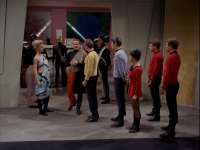
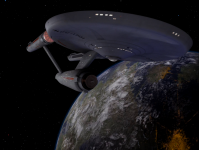
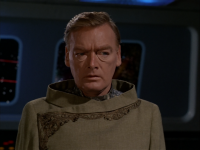
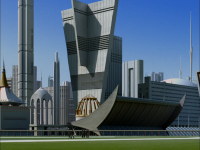
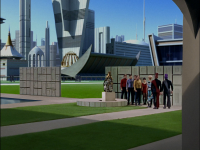
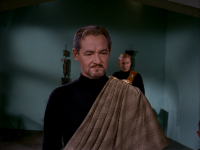
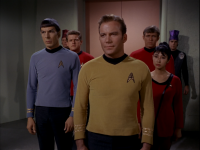
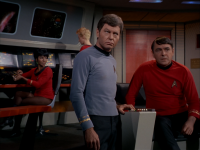
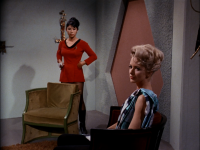
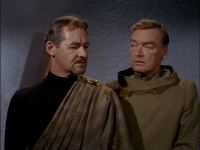
Star Trek TOS - 1x23 - A Taste of Armageddon
Originally Aired: 1967-2-27
Synopsis:
The Enterprise is diverted by two planets fighting a computerized war. [Blu-ray] [DVD]
Filler Quotient:
2, filler, but an enjoyable episode nevertheless. You can skip this one, but you'd miss out on some fun.
- There's no essential plot or exposition in this episode that renders it unskippable, but it's a decently entertaining episode, even if the actual entertainment value may not be exactly what was intended.
Problems
- How can the Enterprise be attacked by "sonic" weapons through the vacuum of space in which no sound can travel?
- Spock at one point incorrectly refers to the aliens' planetary system as a "solar system." This is a common error. The term they were looking for is planetary system. The planetary system we live in is called the Solar System because our star is named Sol. As such, the term "Solar System" is a proper noun, not a generic term.
- Vulcans are inexplicably referred to as "Vulcanians" in this episode.
Factoids
- The USS Valiant was lost at this planet 50 years ago.
- This episode establishes that Vulcan mind melds can occur without physical touch, but it is strongly implied that they have reduced efficacy in this case.
- This episode establishes that the Enterprise cannot fire full phasers with their defense screens up.
Remarkable Scenes
- The revelation that the war on this planet is a computer simulation and that people are executed on each side like some sort of a lethal game.
- Spock: "Sir, there's a multilegged creature crawling on your shoulder."
- Scotty: "The best diplomat I know is a fully activated phaser bank."
- Scotty refusing to follow the Federation diplomat's orders.
- Kirk destroying the war computer.
- Kirk: "I've given you back the horrors of war."
- Kirk convincing Anan to open peace talks with his enemy.
My Review
No matter how tragic it may be for the society in this story to have been locked into this terrifying "neat and painless" war for so many centuries, the greater tragedy is the profound stupidity of their society in the first place for inexplicably denying itself the obvious solution to their centuries-long problem. Instead of fighting a real war until peace is attained through annihilation of their enemy or through treaty negotiations brought about by fear of said annihilation, both sides have decided without a credible reason to just volunteer casualties at regular intervals; the numbers decided by a computer program. The resultant status quo is more terrifying than any real war could possibly be and this society's inability to see the plain obviousness of that is staggeringly hard to swallow.
Underscoring their profound stupidity is the fact that in a single day, captain Kirk single handedly ends their centuries-long war merely by blowing up the computer they used to make pretend warfare. Setting aside simple questions such as why there aren't backup computers or why they don't just equip all citizens with some sort of instant-vaporization collars rather than employ a limited number of vaporization chambers with clearly insufficient capacity to meet their "quota" given even the most minor disruptions, I can only wonder why Kirk's simple idea hadn't occurred to at least one person across those two planets in the last 500 years. Perhaps their entire race is genetically predisposed to poor critical thinking skills, despite their conspicuously unexplained resemblance to humans.
The aliens of the week aren't the only thing to pick on though. Ambassador Robert Fox continues the conspicuous trend of Federation officials tending to be unreasonably difficult to deal with and Kirk's own actions in destroying the war computer would seem to be in violation of the Federation's Prime Directive non-interference policy. Moreover it's never quite explained just why establishing a port in this vicinity is so important. Ambassador Fox does mention that thousands of Federation lives have been lost over the last 20 years in this region, but he doesn't bother mentioning why. We're apparently supposed to believe that the Federation having a friendly port in the region would somehow prevent that. But why? It couldn't be due to the war because all a ship has to do to escape the war is get to a higher orbit, as is demonstrated by Scotty.
Speaking of Scotty, his time in the big chair during this episode was fantastic. Scotty in command was a delight to watch and I greatly enjoyed seeing how his dealing with McCoy's signature badger-the-man-in-command routine differed from that of Kirk and Spock. Likewise, despite the writing of the aliens making them out to look terribly stupid, it gave Kirk several opportunities to deliver lines that were quite profound. It would have been nice if the writers had earned Kirk this distinction without it being at the expense of the authenticity of the aliens, but many of Kirk's lines were nevertheless insightful. My favorite was "I've given you back the horrors of war." In fact a great deal of this episode is a joy to watch in spite of its half-baked premise. As such, perhaps the best way to describe this episode is as a well executed bad idea.
The following are comments submitted by my readers.
- From David in California on 2008-02-26 at 7:16pm:
Wow, so again I must dissent from the review and the average rating and say that I'm much more positive on this episode! (As with "Return of the Archons".)
I suppose as a more "causual viewer" of Star Trek and not a dedicated Fan, this might be expected as I'll not be bothered by some of the understandable Fannish concerns. I did guess that there would be some objection to Kirk and the crew's actions as regards the Prime Directive, but thought the objection from Fans would be stronger.
I'm not bothered by aliens looking like humans without further explanation, personally. I generally accept a sci-fi "parallel evolution", or perhaps "genetic seeding" conceit to explain this and I just apply that to Star Trek, but I suppose I'm learning here that this isn't the way it works for ST Fans in the ST Universe.
Also, I'm not bothered by the Prickly Federation Official (TM) as I think it sometimes makes more dramatic sense for the Enterprise crew to be more-or-less on the same page and for the opposing point of view and conflict to come from others in the Federation. Otherwise in order to explore issues and choices that come up in the plot, you can sometimes get contrived arguments between the crewmembers that aren't always consistent with their characterizations, IMO.
This is, however, the first time I was really bothered by the Useless Epilogue (TM) on the bridge, which is just insulting, IMO, even to 1960s audiences who were, I'm sure, perfectly capable of grasping the themes and motivations of the preceding story. This episode should have ended before the needless wrap-up and silly Spock-needling humor.
Dissenting from the review, I found the actions of the society plausible, especially if I consider a generation raised on this notion (as opposed to the first few generations who did this.) I would imagine that what we didn't see in the episode was periodic pockets of dissenters who don't go along with the program and are probably underground and controlled by strong police measures. If I just assume this exists but didn't play a role in the story, then the plausibility increases.
Not to be controversial here for the sake of it, but the parallel that comes up for me with our own society is in certain areas of modern welfare-state wealth redistribution. Bear with me and I'll explain.
Even those who support such things--just about everyone--do acknowledge when pressed that what's going on there is that property is taken coercively from some in order to give to others.
If someone comes up and hits you and grabs your wallet--we call it theft. But by having a "civilized" system of coercive taxation where some of the money is simply handed over to others, we don't tend to see it as "theft" in the same way (at least most do not) even though on an abstract level something is being taken forcibly by some and given to others.
People who think such "wealth redistribution" is a positive good (likely many ST Fans) often offer the practical argument: "Well, if we didn't do this, then the poor would rise up and just take what they want more directly. You'd have a rebellion of sorts by the 'underclass' and things would get really violent. By forceably redistributing wealth in this more 'civilized' fashion, we avoid that ugliness from taking place."
Ever heard that? I'm sure most have. Now, I realize that taking property forceably isn't as morally wrong or a violation of rights as killing--theft is a lesser crime than murder, obviously--but I think the principle here is similar to what we saw in the episode. Some view the above "practical" argument for wealth redistribution as basically advocating that rather than a government protect people from criminal theft, it should simply do the job of potential criminals for them. Some find that notion disturbing in the same way as the scenario here in the episode--just of a lesser degree.
I hope the similarity is clear. In that case, the government provides a surface-level "civilized" version of something which might otherwise normally take place in a more brutish, violent and ugly manner. To head off the one kind of "theft", you introduce the other. Is that really so different from what the society in this episode was doing as regards war?
Finally, what I loved about the episode was Kirk and crew taking a principled stand against all of this and taking positive steps--without debate--to end the horror of what was going on. Kirk's solution of acting the part of the violent "barbarian" to basically frighten the misguided leaders, and the notion that if one takes away the visceral horror and property and infrastructure damage of war then it becomes more "acceptable" and therefore prolonged, was quite thoughtful, IMO, and it was enjoyable to see Kirk playing all of this out with some style and even humor.
I found the whole crew to be displaying the kind of "heroics" acting from moral certainty I'd personally prefer more of in Star Trek, but I realize goes somewhat against the tone and "message" of the show and what Starfleet is supposed to stand for and so on--and that this is dear to the show's Fans, which I respect. So it makes sense that stories like this which appeal to me are few and far between, and maybe confined to TOS alone.
If I imagine this same scenario playing out in, say, Voyager, I realize there would be a whole business of Janeway or Chakotay or whoever trying to make a case for non-intervention into this horror, which would probably have me yelling at the screen!
Obviously I really loved this episode. - From Arianwen on 2010-07-21 at 10:51pm:
In answer to David (off-topic, I know) I have to say that taxation gives to all, to finance public institutions and infrastructures - it doesn't "take from some and give to others".
Either way, I find this episode very interesting. The irritating diplomat was, well, irritating, but he did provide a more complex plot than might otherwise have been the case. It could have been improved by a better defence of his side of the argument - someone on the crew siding with him, for instance - because otherwise it just turns out as "diplomacy is bad". Fox did have a point and although his blind trust was annoying, he was right (sort of) to try to find a peaceful solution. The problem is that as he's a complete idiot it's rather hard to see it. - From Baron on 2010-11-11 at 11:29pm:
Do you even like the show or sci fi in general? This was one of the best star trek episodes and sci fi episodes that I've ever seen. The point of the episode was that all war is insane. No sane civilization would start a war. Forcibly making millions of people kill themselves in a death chamber was an obvious reference to the Holocaust. Which would still be on the minds of most people watching this show since it took place only 22 years before this episode. The Holocaust was just as insane as this computer holocaust. At the end they even drive home the point that we should do everything we can to stop wars.
The Prime Directive limits the storytelling of star trek alot times. It's also violated alot of times anyway with no consequences, so I wonder what actual power it has in the Federation. - From ChristopherA on 2012-07-10 at 3:04am:
A good episode, I like the plot and the resolution. I agree with the other commentators that the scenario in which this society finds itself is a very reasonable sci-fi scenario and not does not indicate they are “stupid”. Lots of things seem stupid in hindsight, but they expressed very well their belief that breaking the agreement would result in the end of both cultures, and they dared not risk the consequences.
I do agree that almost everything in the episode is way too easy for Kirk and company – from the repeated escapes, to holding the high council hostage, to disrupting the disintegration chamber network, to having a single computer be essential to the treaty that has lasted 500 years. I treat this as an artistic abstraction, as if what really happened on the planet would take more than a one hour episode to portray, and we are seeing a simplified rendition of it meant only to capture the essential points.
- I agree with Arianwen that Fox has a reasonable point of view which is disguised by making him a complete bozo. But I love that this gives us the great scene of Scotty flat-out refusing to follow Fox's orders.
- Scotty generally gets a great chance to show his command ability. Plus a notable quote – "The haggis is in the fire now for sure." They have interesting sayings in the 23rd century.
- I agree that the fact that the episode never explains the purpose of the treaty port is a bit odd, because it is hard to figure out why the Federation would have such urgent need for a port on a planet that, apparently, it knows almost nothing about. But this isn’t a big deal, Kirk has his orders, presumably the answer to this question is complex and irrelevant to the plot.
- I used to think this episode was a classic example of Kirk violating the Prime Directive due to his personal moral convictions, but now I'm changing my mind after seeing it again. I'm not sure the Prime Directive applies to a civilization as advanced as Eminiar. But even if it does, it is clear that the Federation has given orders to Ambassador Fox and Kirk to interfere with the culture and obtain a treaty port "at any cost". If anyone has broken the Prime Directive, it is whoever gave that order. While Kirk's approach is unique, he pretty much has to do something drastic in order to follow orders. To avoid interference with the culture would result in the failure of his mission.
- From Strider on 2012-07-24 at 6:22am:
I don't get what makes this culture so "advanced," anyway. Because they have computers? I mean, they walk voluntarily into death chambers so they don't mess up their pretty city. And they are so ignorant of the values of other cultures that they just expect other people to go along with that?
Kirk, Spock, Scotty, and McCoy are completely awesome in this episode. I don't know that Kirk would have gone so far as destroying the war computers and completely restructuring this society if he weren't so irritated at being held prisoner and being expected to just consent to the deaths of everyone on his ship. He's got this, "Do you seriously think you can mess with me" thing going on that's characteristic of Kirk at his best. - From Glenn239 on 2012-10-22 at 12:52pm:
“No security men were harmed during the filming of this episode”
A solid ‘5’. I liked Scotty’s competent command decisions. I liked a planet that finds the Enterprise’s technology threatening and imposing rather than the usual ‘magic’ gimmick, where the antagonist of the week fires some sort of intergalactic pixie dust and the Enterprise and all its technology is suddenly held hostage to destruction. I also liked Kirk’s kick ass approach.
Re – Prime Directive. I don’t think it was violated. I’m guessing that the Prime Directive can not apply to the preservation of any culture currently practicing genocide, and since this one was unquestionably doing so (3 million dead per year, I think), the prime directive may actually require that the Enterprise use force stop it.
Re – Single computer crucial to prosecution of the “war”. No, I didn’t get the read that sabotaging the command center was a fatal blow. The reason why the war ends is because Scotty has been ordered by Kirk to execute something called General Order 24, an attack on the infrastructure of the planet in response to their hostile actions against the Federation representatives. This is obviously a bluff on Kirk’s part, but the planetary council doesn’t know it and they surrender for fear of it. Blowing up the computers was entirely secondary, simply enriching the bluff with a humane show of force.
Re – Speaking of General Order 24, it has to be a pre-arranged bluff, right? The Federation simply can’t have a standing order of that nature. “Oh, you said General order twenty THREE, ‘Shore Leave for everybody’. I thought you said General Order twenty FOUR, ‘Blow up the planet’. ”
Re – Treaty Port. The requirement might refer to unpoliced shipping lanes, where a port would allow better protection against piracy. - From Scott Hearon on 2014-03-29 at 9:44pm:
I'm very much with Kethinov on this one. There are actually a few elements that are somewhat well-done. However, his description of this episode as "a well-executed bad idea" is spot-on to me.
On its surface, there are a few things going for it - having the crew divided into those who are perilously embroiled in a bizarre interplanetary war, and those who are on the ship, attempting to sort it out while dealing with conflicting diplomatic directives.
However, the notion of the computerized war doesn't hold up to scrutiny. Either culture would HAVE to realize that the optimal solution when dealing with a hostile enemy is to eliminate that enemy, not to agree to engage in an eternal war. In fact, what IS the point of the war, if neither side plans to actually completely defeat the other side? It is ridiculous to think that neither side in this episode would, after five centuries, realize the utter pointlessness of this exercise. Clearly the writers hadn't either. It smacks of something that seemed like an interesting notion of speculative fiction, but it really shouldn't have gotten much farther than a few minutes of consideration.
And yes, I find "Badgering, Belligerent Diplomat #3" rather annoying. There must have been a more mature way to provide tension between a Federation official and the Enterprise's command. The guy, just like his predecessors, comes off as so dimly aggressive that I had to question just how he became a diplomat in the first place. Certainly not with his people skills, that's for sure.
Just too many major problems to overcome a few of the lesser strengths in this one. I gave it a "3." - From Chris on 2017-11-08 at 8:51pm:
So, aside from most of the obvious observations regarding the bizarre, eternal war, no one has even mentioned the idiotic notion of the entire Enterprise crew beaming down to certain death in order to save the landing party being held hostage!
Scotty and McCoy were already suspicious but Spock confirmed it explicitly! I can hear the how the real conversation would have gone...
ANAN: We hold your Captain, his party, your Ambassador and his party prisoners.
ANAN: Unless you immediately start transportation of all personnel aboard your ship to the surface, the hostages will be killed. You have thirty minutes. I mean it, Captain.
Scotty: HA HA HA Ha ha ha ha ha ha ha!!! We'll be right down! No! I'm serious... really! Just give us a minute to digest how stupid you think we are...
Sorry, Captain. After you're done in, we'll General Order-24 the hell out of them!
I could go on further about the earlier part where Anan seems a bit incredulous that other beings are not as enlightened as they are and would blindly accept that the solution they've come up with is not simply the greatest feat of diplomacy conceived!
A High Degree of Conscienceness is beyond absurd! - From Chris on 2018-04-06 at 6:25pm:
A follow-up nit...
If Mea-3 was declared a casualty in the attack, shouldn't pretty much everyone else in the room, Kirk, Spock, Anan et al, also have been killed?
And what about injured personnel? - From Chris on 2018-04-07 at 9:48pm:
A couple, ok a few follow-up nits...
If Mea-3 was declared a casualty in the attack, shouldn't pretty much everyone else in the room, Kirk, Spock, Anan et al, also have been killed?
And what about injured personnel?
The Eminians could not come close to hurting the Enterprise with its planetary defenses, I'm sure the Vendekans couldn't either. Since the Enterprise had her shields up, and tri-cobalt explosion probably isn't going to damage it.
And why wasn't the Enterprise 'disrupted' when they dropped shields to transport Mr. Fox and his aide?
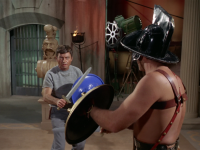
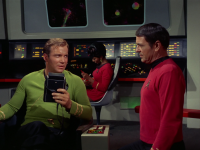
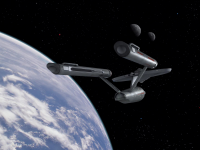
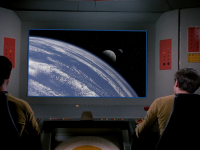
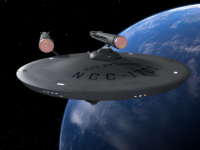
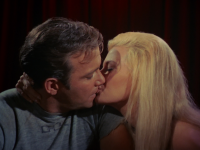
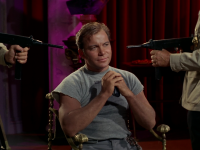
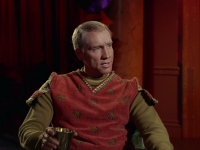
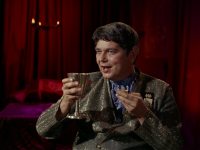
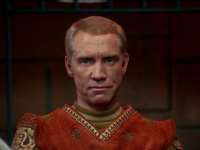
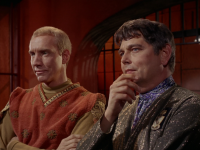
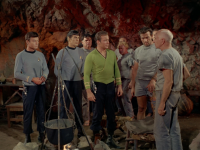
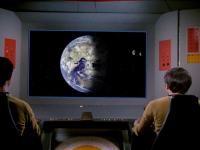
Star Trek TOS - 2x25 - Bread and Circuses
Originally Aired: 1968-3-15
Synopsis:
Spock and McCoy are forced to fight in Roman-like games. [Blu-ray] [DVD]
Filler Quotient:
3, bad filler, totally skippable.
- One of Star Trek's worst episodes and complete filler.
Problems
- "Hodgkin's Law of Parallel Planetary Development" is patently ridiculous. It's not a sound premise to build an episode off of.
Factoids
- This episode is a candidate for my "Worst Episode of TOS Award."
- 37 million died in Earth's third world war according to Spock.
- Kirk and McCoy define the Prime Directive in fairly specific language in this episode: "No identification of self or mission. No interference with the social development of said planet. No references to space or the fact that there are other worlds or civilizations."
- This episode establishes that the dematerialization process of the transporter insulates the target from projectile attacks like gunfire.
Remarkable Scenes
- Guy with a gun to Spock: "What do you call those?" Spock: "I call them ears."
- McCoy and Spock arguing about logic in the jail cell.
- McCoy and Spock arguing at the dinner table.
- Spock's terrific performance as a gladiator.
- McCoy and Spock arguing in the jail cell again.
My Review
Miri, The Omega Glory, and now Bread and Circuses. Why do alien planets mysteriously take on specific and precisely identical characteristics of Earth cultures seemingly at random so frequently? Why, "Hodgkin's Law of Parallel Planetary Development" of course! I applaud the episode for at least trying to come up with an explanation for this nonsense, but unlike the meddling of John Gill from Patterns of Force, this rationalization doesn't quite work. The very idea of something like "Hodgkin's Law of Parallel Planetary Development" existing as a natural law flies in the face of realism. There's just no way an alien planet, even an alien planet full of human-like aliens, is going to develop its own Roman Empire precisely identical to ours in nearly every way, except with 20th century American English, 20th century American technologies, and other such specific references.
It's kind of a shame too, because unlike Miri and The Omega Glory, this was a pretty entertaining episode. Sure it was a story about yet another Federation citizen tainting a society with yet another alien race that looks exactly like humans and yet another set of plot contrivances which exist solely to get the cast captured and forced to fight for the amusement of others, but when you set aside the cliches, this episode actually has a lot to offer. The idea of a Roman Empire which never fell and became much like the 20th century United States is intriguing. In this fictional society, slavery evolved into some form of wage slavery and the gladiator games were broadcast live on television with a characteristically familiar obsession with television ratings. Sure these details are gimmicky, but they're also pretty damn funny.
And then there's Claudius Marcus, who is one of the most delightfully amusing villains we've yet seen on Star Trek. Unlike most victims of cultural contamination by superior aliens, Claudius has no interest in procuring the advancements of the Federation for himself or his society. Instead, he perversely gets off on holding the Federation hostage to its Prime Directive. He even hilariously taunts Kirk by admitting that while he's well aware that the Enterprise could lay waste to the entire planet from orbit, he also knows Kirk is legally prohibited from doing so. He then spends the whole episode toying with the crew like a cat would with a bird for no reason other than his own amusement. On some level, you've got to respect that carefree recklessness. Finally, there are also several great moments featuring McCoy preying on Spock's insecurities about his human side, which was a nice touch.
But the fun ends there. And aside from the obnoxious issues with the episode's premise mentioned at the beginning of the review, there are also problems with its internal plot logic as well. Perhaps the most prominent example is the plot's bizarre dismissal of sun worship as not historically consistent with Roman theology. Apparently the writers have never heard of Sol Invictus. Likewise, the plot's dismissal of sun worship as a symptom of a primitive society while elevating the idea of worshipping the (alleged) son of god as a characteristic of an advanced society is downright offensive. Why should one religion be considered more valid than another? The way the story ends, after Uhura's exposition about the sun vs. son wordplay, everyone seems to rest easy by concluding that now that the aliens discovered Christianity, all the problems with their society will soon end.
That's an ending which aside from the sheer ridiculousness is hardly in the spirit of Star Trek which, for the most part, seems to advocate a progressive future without superstition guiding society's laws and moral code any longer. It's as shameful for Star Trek to resort to such blatant Christian evangelism as it is for Star Trek to tell a science fiction story on such a painfully weak premise as "Hodgkin's Law of Parallel Planetary Development." Do yourself a favor and skip this one.
The following are comments submitted by my readers.
- From rhea on 2008-04-27 at 8:24pm:
The episode also explores the relationship of the trio and Spock’s true feelings for Kirk more than most other episodes did (The Tholian Web is one other in which this is done expertly). Spock coming as close to admitting that he cared for Kirk (by denying McCoy’s accusations of not having feelings in a way) – it is wonderfully done, very much in character for Spock. The same happens in The Tholian Web, when Spock answer’s McCoy’s “It does hurt, doesn’t it” with “What would you have me say.” Such good writing!
I therefore love the McCoy/Spock arguments in the jail cell. This and Spock “kicking some Gladiator ass” made me give this episode quite a good rating.
- From Orion Pimpdaddy on 2010-08-21 at 12:06am:
This is a dull episode. For a modern day Rome, the city seemed pretty dead (except for the shaky of urban 1960's file footage). Everything just seemed like an excuse for a fighting sequence. One scene that WAS exceptional was the emotional conversation Spock and Mccoy had in the jail cell. It was remarkable. - From Wiley Hyena on 2012-05-14 at 7:02pm:
The reviewer missed the mark here. Just because there is a Christianity theme here doesn't mean it is evangalism, nor does it interfere with the progressive nature of the show. Historically, the Roman empire succumbed to Christianity and adopted it. So I think the reviewer places too much criticism on this point, when the purpose of the episode was to explore a world where the Romans actually maintained their empire into modern times. This episode is very entertaining and one most remember as a kid. Give it a 6. - From Strider on 2012-06-21 at 3:26am:
I've read some pretty disparaging reviews of this episode, and while some of the science is a little screwy, I think there's some truly wonderful character work in it. This is Kirk at his most Kirk-like...confident, in charge, watching out for his crew but trusting them as well. I was getting tired of too many angsty, doubt-ridden, weak Kirk moments. Kirk is a strong, totally in control leader all the way through, and it's awesome.
Spock lets some emotion out--irritation, humor, anxiety--and gets called on it by McCoy, leading to a deeply emotional moment between the two as they share their concern for Kirk. McCoy is at his most bitchy and in Spock's face all the time, but still prods Spock to new levels of self disclosure.
I'm not thrilled with the treatment of the Prime Directive--up till now, didn't we understand that the PD was absolute unless they had to defend themselves? How can there possibly NOT be an exemption for that?
And I do sort of wish that Kirk hadn't sexed the slave...can he NEVER resist a woman EVER? I mean, she was a SLAVE, she can't give free consent! A new low for studly Kirk.
The Sun/Son thing, indicating that Christianity arose within the Roman Empire in this reality as well, makes sense, and I understand why they couldn't really follow up on it. It was a neat little twist that could have been more, but it's okay that it wasn't. It didn't bother me.
On a personal note, speaking as a woman, these men in these costumes are so hot I watched the episode 3 times in one day. Spock fighting in the arena in those tight pants? Whew... And I didn't realize McCoy was so tall, but he's almost as tall as Spock. Add the emotional intensity, and it was a pretty satisfying episode, despite the occasional plot ridiculousness.
Anyway, good character work... - From Dos Flores on 2012-12-28 at 6:47pm:
"It's kind of a shame too, because unlike Miri and The Omega Glory, this was a pretty entertaining episode. Sure it was a story about yet another Federation citizen tainting a society with yet another alien race that looks exactly like humans and yet another set of plot contrivances which exist solely to get the cast captured and forced to fight for the amusement of others, but when you set aside the cliches, this episode actually has a lot to offer. The idea of a Roman Empire which never fell and became much like the 20th century United States is intriguing. In this fictional society, slavery evolved into some form of wage slavery and the gladiator games were broadcast live on television with a characteristically familiar obsession with television ratings. Sure these details are gimmicky, but they're also pretty damn funny."
This is all quite true, which makes your overall episode rating of 0 a bit baffling. Zero? Not one point? Huh...
Lots of problems, to be sure, but even you seem to see at least some entertainment value. And you've rated other episodes more highly while apparently finding much loss to say in their favor. I guess I'm just wondering what's up with that. - From Kethinov on 2012-12-28 at 8:27pm:
It doesn't matter how charming the villain was or how amusing certain plot details were. The premise was fundamentally unworkable. I don't award points to episodes with fundamentally unworkable premises. - From Alan Feldman on 2013-03-25 at 2:43am:
BREAD AND CIRCUSES
Factoid: Ian Wolfe, who played Septimus here, also played Mr. Atoz in "All Our Yesterdays".
OK, here's my chief question about this episode:
Just how did Kirk et al. expect to get to Captain Merik and haul him away? The closer they get, the more likely they are to be caught -- especially with Flavius Maximus, perhaps the most recognizable slave on the planet, leading the way! (Flavius should at least wear a disguise.) And they're somehow going to keep an entire machine gun-toting police force at bay while they question Merik? Even if they used their phasers, chances are _someone's_ bullets would get them.
And why did our heroes beam down in Federation garb?
What was Claudius Marcus doing by an iridium quarry?
Great discussion with Bones and Spock in the cell. And other fun moments here and there, as already mentioned by others.
I think this is the strictest application of the Prime Directive in the entire series. No chance at all for Spock to ask Kirk at the end of the episode if they violated it. Even in "The Omega Glory", where Kirk enters into his log, "A star captain's most solemn oath is that he will give his life, even his entire crew, rather than violate the Prime Directive", Spock gets to question Kirk about their actions at the end.
Let's see, in real Rome there's the huge Colosseum. Here we have a tiny TV studio.
Notice that when Kirk fires at the cell door lock, nothing hits it!
CLAUDIUS: Question, Captain?
KIRK: The rules. If Spock should finish his man off first, would he be able to help
CLAUDIUS: We believe men should fight their own battles. Only the weak will die. My word as a Roman. Ready to order your men down, Captain?
Why this is a surprise to anyone is beyond me. On the other hand, why have two fights at the same time? What is Spock supposed to do when he finishes his opponent off first? Just stand there and watch? Walk off stage? Wave to the crowd?
MERIK: Maybe now you understand why I gave in. The Romans have always been the strongest, and they've had practice for over two thousand years in enslaving men, using them, killing them.
Hmmm. I wouldn't want to serve under this dude! And I don't follow his reasoning.
CLAUDIUS: Quite true, Captain Kirk. The games have always strengthened us. Death becomes a familiar pattern. We don't fear it as you do.
"We don't fear [death] as you do?" I don't see Claudius volunteering to fight. Ridiculous. Not fearing death gets weeded out by natural selection.
Amazing how well Scotty's power disruption was timed! Virtually down to the second!
Here's one thing that violates Hodgkin's law: Kirk's night with Drusilla. Bizarre.
The wikipedia article on Roddenberry says that "he . . . considered himself a humanist and agnostic. He saw religion as the cause of many wars and human suffering." Yet he co-wrote this episode, which favors Christianity! Go figure.
A zero? You'd rather watch "The Empath"? Other than that, I mostly agree with your review.
AEF, aka betaneptune - From Trekkie on 2014-04-03 at 8:16pm:
Your review is too biased. You only give this a 0 because you're biased against Christianity. This much is clear. If you truly understood the spirit of star trek you would have caught the meaning.
At the end, McCoy said the 'sun' philosophy was "A philosophy of total love and total brotherhood." Then they all smiled, knowingly. Clearly, the united federation of planets is based on such a philosophy.
Part of that philosophy is also to respect others. By not keeping your bias out, this is why your review fundamentally fails in our terms, and as well on the spirit of Star Trek. - From Kethinov on 2014-04-04 at 12:44am:
What are you on about? The ending of this episode was just oozing with Christian evangelism. It's hard to miss. As for my "bias" against evangelizing Christianity, I can well assure you that had any other religion been as shamelessly evangelized in this fashion, I'd be equally annoyed. - From Trekkie on 2014-04-04 at 11:32pm:
You missed the point of what i was trying to explain. The point I was trying to make was that this episode gave us insights into some of the very root philosophies in the united federation of planets. All of the people on the bridge, in the scene at the end of 'Bread and Circuses', understood what was happening on the planet after Uhura explained it wasn't the 'sun' but the 'son'. They all had understanding expressions of what that implied.
Kirk said "Caesar and Christ. They had them both. And the word is spreading only now." Then McCoy said in understanding "A philosophy of total love and total brotherhood." To which Spock also understood by saying "It will replace their imperial Rome, but it will happen in their twentieth century." Then kirk longlingly says "Wouldn't it be something to watch, to be a part of? To see it happen all over again?". His line shed light on an understanding that he had which we don't have. Perhaps that philosophy was the key one that helped bind people after the 3rd world war, and/or was a basis of the united federation of planets.
In TOS season 3, the episode 'Whom Gods Destroy', when Garth was mocking the peace mission to Axanar, Kirk said "They were humanitarians and statesmen, and they had a dream. A dream that became a reality and spread throughout the stars, a dream that made Mister Spock and me brothers." Garth asked Spock if he agreed and Spock said "Captain Kirk speaks somewhat figuratively and with undue emotion. However, what he says is logical and I do, in fact, agree with it."
'Bread and Circuses' is a very powerful episode that sheds light on some deep roots about the philosophy of the united federation of planets, a philosophy of total love and total brotherhood. It showed that both humans and vulcans understand this philosophy is a stable ground to build on. It just so happens to be one of the deepest philosophies of this planet as well, now, and today, in real life.
So this is why i strongly disagree with your 0 for this episode, because it showed us a bit about how their world got to where it was, and it ranks least a 7 imho. - From Kethinov on 2014-04-05 at 1:27am:
That has got to be the most generous interpretation I've ever seen for any episode of Star Trek. Personally, I think you're reading way too much into it (as would most other people I suspect).
But that's not really what's important here. Regardless of whether or not there is supposed to be some deep spiritual insight in this story about the Federation's origins if you read between the lines hard enough, it doesn't really matter.
What matters is the entire story was implausible from the very first moment. "Hodgkin's Law of Parallel Planetary Development" is scientific rubbish, unworthy of a science fiction.
The story was entertaining, but we should not award points to blatant pseudoscience. - From Harrison on 2014-07-20 at 1:39am:
It's cornball, the core premise is painfully implausible, and there's a shamelessly manipulative appeal to shallow, majoritarian morality -- perhaps to mitigate earlier episodes that offended by purveying what was perceived by some as communitarian, even anti-capitalist ethics.
With two liberal Jewish actors in the lead roles, there may have been some overcompensation going on, perhaps to blunt criticism that Star Trek was internationalist, Social-Democratic propaganda. There were a few episodes in season 2 and 3 - "Omega Glory" being the most obvious - that struck me this way.
But the episode doesn't warrant a zero by any standard. There's solid acting, and some unusually strong character development for the series. The notion of 20th century Rome is a clever one, and the writers did pretty well fleshing it out in a 50-minute window. - From Kethinov on 2014-07-20 at 6:38am:
If the core premise was painfully implausible, that's it. It doesn't matter how good the actors were or how entertaining the villain was. It can't be worth any points if the core premise was painfully implausible.
I find Voy: Threshold to be highly entertaining. One of my favorite zeroes to rewatch. Absolutely chock full of comedy, both intentional and unintentional. But I don't give it any points either because it's equally implausible. - From Alan Feldman on 2014-11-10 at 3:01am:
"BREAD AND CIRCUSES" post #2:
Notice that in the news broadcast at the beginning of the episode, one of the fighters is Claudius Marcus! Is that our "delightfully amusing villain," or someone else with the same name?
In my first post I said this was probably the strictest application of the Prime Directive in the series. Actually, this is _not_ true at the beginning of the episode. Quite the opposite, in fact!
Our heroes beam down in Federation garb and bring their phaser guns. Spock brings his tricorder and bones brings his own device. Kirk tries to grab his phaser when our heroes are first caught by the escaped slaves, he uses his communicator to ask Scotty to count people from afar, and Bones examines the natives with his little cylinder thing. And all this starts less than a minute after Kirk and Bones recite the PD!
Add to that the following:
KIRK: Perhaps you've heard, let's say, an impossible story or a rumor of men who came from the sky or from other worlds.
SEPTIMUS: There are no other worlds.
KIRK: The stars.
SEPTIMUS: Lights shining through from heaven. It is where the sun is. Blessed be the sun.
When Kirk and Bones recite the P.D., they're doing it for our benefit, not Spock's, of course. But surprisingly it doesn't come out all that awkward.
This is one of the few episodes where the unexpected speaking of English is mentioned and remarked upon. The other episodes include "Tomorrow is Yesterday" and "Metamorphosis." Any others? I wish I had a text file of each transcript! It would make questions like this quite easy to answer (well, assuming no typos, of course).
As for sun worship in the Roman Empire: Why can't there be something that's not exactly "paralleled"? That would be more likely than everything being paralleled, no? Not "illogical" in my opinion.
Re "pseudoscience": In TOS, phasers and photon torpedoes somehow make sounds in the vacuum of space, which is not possible. (They sound pretty cool, though!) Faster-than-light travel is almost certainly a no-go. (If you learn the theory of special relativity and how well confirmed it is, you will see why.) And see my list of absurdities in my review of "Sky is Hollow." But I watch Star Trek for fun, the characters, the great chemistry between the characters, how they deal with situations, action sequences, interesting ideas and such. Keep in mind that there's only so much you can do with the limited time and money they had to work with (hence, Hodgkin's Law of Parallel Development). Sometimes it's either Hodgkin's Law or nothing. ... In spite of all this, I still love the show.
I agree that Bones saying, "We represent many beliefs," is hardly characteristic of an enlightened future. But it does represent enlightened _tolerance_.
SPOCK: Sun worship is usually a primitive superstition religion.
Current religions are, in part, modern-day superstition. He said nothing about any religion's validity -- just that sun worship is characteristic of primitive societies. And some religions are sillier than others. Why would they be all the same?
Yeah, the evangelism bit at the end is pretty obnoxious and cringe-worthy. And ironic in that Shatner and Nimoy are both Jewish.
>----o----<
To Strider - Kirk weak? He's only human and it's nice to see he has _some_ weaknesses. And I always rooted for Spock when he played Kirk in chess, and was always a little annoyed when Kirk won. But he's still our hero.
On Kirk resisting women: he resisted Eve in "Mudd's Women," Helen Noel in "Dagger of the Mind," and Dr. Wallace in "The Deadly Years." (I assume you meant women who were after him. OK, it's not clear what happened with Eve. I suspect some random rewriting occurred.) Oh, and there's Yeoman Rand! He resisted the Dohlman in the end, and without McCoy's cure. He resisted almost all the women that weren't after him.
AEF - From derek on 2016-04-07 at 9:38am:
Actually there is nothing in real-life science proclaiming that humanoids and even a duplicate of the Roman Empire could not evolve on another planet. - From Kethinov on 2016-04-08 at 6:17pm:
*rolls eyes* - From Chris on 2018-03-21 at 8:27pm:
An absolutely stupid episode which should have been burned on a pyre!
I'm really confused as to how it was even cleared for production by Roddenberry knowing his feelings on religion!
I view the man much like myself or most of our Founding Fathers... a Deist.
The show was a complete amalgam of nonsense and stupidity!!!
... and my eyes rolled at Derek's comment along with yours!
- From John on 2019-08-09 at 2:03pm:
I don't agree with your implication that Christianity is superstition, but to each his own. - From Azalea Jane on 2023-08-29 at 6:01am:
UGH. The implication that these egalitarian pacifists were actually Christians, and that this is a good thing, utterly turns my stomach. Keep that obscene Christian filth out of my good, wholesome Star Trek! (Didn't Big J say something about not bringing peace, but a sword, and setting brother against brother? Didn't he also conspicuously fail to condemn slavery? But I digress.) Plus, all of this misunderstanding is hinging on a PUN? Son/sun? I wonder how they translate that whole thing into any other language.
I could barely believe it. I thought it was a misdirect at first. But no, here's my beloved Star Trek, otherwise famously secular and humanistic, suddenly condoning one of the most backwards, brutal, destructive, illogical, asinine, insane belief systems ever devised by our species. Sure, you can give the writers the benefit of the doubt and interpret this to mean that these people were about to go through their "Christian phase," so to speak, presumably ultimately on the way to the secular, fully-automated luxury socialist space utopia we see in Star Trek, but I do NOT buy the assumption that Christianity was at all inevitable or necessary to progress.
This would have been kind of an OK episode without that end twist (delivered by my girl Uhura, to make it even worse). Ridiculous premise, even for Star Trek, but it wasn't without merit. The scene between Spock and McCoy in the jail cell was quite good. It's painfully obvious throughout TOS (so far) that Spock is severely overcompensating. Of *course* he feels all the things McCoy points out. Even if he were full Vulcan, the emotions are still there; Vulcans just suppress their outward expression. But he's part Human, and he's in heavy denial/repression of his Human half. (This is explored, quite well IMO, in Strange New Worlds, where we see a somewhat younger Spock serving under Pike. Spock wasn't always so stridently anti-emotion and didn't always so thoroughly reject his Humanity.)
This episode leaves me feeling so icky, I feel like I need to go rewatch "Who Watches the Watchers?". Or take a shower. Or both.

Star Trek TNG - 1x23 - Skin of Evil
Originally Aired: 1988-4-25
Synopsis:
A strange entity taunts the crew with vicious pranks. [DVD]
Problems
- Geordi drops his phaser into the alien slime just after Riker is engulfed.
- The feasibility of the skin of evil alien is questionable.
Factoids
None
Remarkable Scenes
- Picard unrelentingly hounding the chief engineer.
- Tasha's death and the subsequent attempts to revive her.
- Notice how the second Riker is incapacitated, Picard takes the opportunity to plunge himself into immediate danger on the planet? (Again?) Something Riker would certainly object to?
- Data under control of the skin of evil.
- Riker all tarred. I bet Jonathan Frakes loved filming that.
- Data's commentary on the funeral.
My Review
This episode is the result of Denise Crosby feeling that her character had become too "Uhura-like," meaning always present but underutilized. This forced the writers to kill off her character abruptly. I'm not opposed to the abrupt death of a main character, however the manner in which Tasha died in this episode was wholly disrespectful. She was quite literally offed by sentient slime without warning, without drama, and without even the narrative focus. The dramatic center of the episode briefly shifts over to Tasha after she's attacked, but with people still in danger on the planet there is no time to grieve. Instead, we're treated to more painfully acted scenes with the evil slime. Then, at the end of the episode, we're treated to a bizarre "play this if I died" recording that Tasha made, complete with up to date commentary regarding everyone in the room! Did she update her personally-written eulogy just before going on every away mission just in case? Quite morbid and unrealistic, just like the alien slime that killed her. The only reason this episode is rated as high as it is is because Tasha's death scenes and funeral (especially ending the episode with the funeral) managed to touch me despite the overall lameness of the episode.
The following are comments submitted by my readers.
- From Orion Pimpdaddy on 2006-05-12 at 2:16am:
This episode deserves a 7 because it is emotional. Sure, you don't get the typical Hollywood exaggerated death scene where the character has a heroic last stand right before they get hit by a weapon and gets to say some meaningful last words before they silently close their eyes as if they are falling asleep. What do we get instead? We get a cold, gritty, quick, unusual death. That is what a death in Starfleet would be like. The scene in sick bay is dramatic, and the funeral sendoff at the end was top notch. This episode deserves more than what others have given it.
- From DSOmo on 2007-06-06 at 7:53am:
Just after Armus engulfs Riker, the rest of the away team runs up to the edge of the "oil slick." When they stop, Geordi's phaser falls out onto the ground. Does this seem like a first-class holster design? - From DSOmo on 2007-06-10 at 6:28am:
I forgot to mention, this episode has one of the worst examples of the "don't give a straight answer" syndrome (see my commentary for Encounter At Farpoint, Part I). Just after Armus rises from his "oil slick," Picard calls down to the away team and says, "What is it, number one? What are you seeing?" Riker responds, "Trouble." - From Evan on 2008-05-26 at 12:33pm:
I absolutely love the "death is that state in which one exists only in the memory of others, which is why it is not an end" line. - From Thorsten_Wieking on 2008-09-01 at 7:06pm:
Regarding Tasha's final recording to her friends - I don't think that this is unusual to be that cuurent with events. In one DS9 episode, O'Brian mentions that he just recorded yet another final message for his wife and how many times he has done this before (just like the rest of the senior staff). So maybe Tasha indeed did make those recordings every now and than. After all, she came from a violent planet where death seemed to be the norm and hey - she works security. Remember the approx. lifespan of a red shirt in TOS? Maybe they have a special course at the academy for "To-be" security officers "How to record a touching eulogy about yourself", SCNR just kidding.
Cheers
Thorsten - From CAlexander on 2011-03-23 at 3:51pm:
I'm not sure what to make of this episode. But I have to say, it really puts the nail in the coffin for the idea that the Captain can't beam down in dangerous situations. Tasha is killed by the monster, Riker is held hostage by it, and Picard then beams down alone so he can chat with the monster face to face! - From Jeff Browning on 2011-10-20 at 1:26pm:
Hate to be contentious guys, but for me this was one of the worst TNG episodes ever. My main issue is the funeral scene. It's the worst example of TNG being overly sentimental, cloying, and corny that I can think of. Everytime I have watched this episode, I end up cringing.
The one consololation was that they killed of Tasha Yar, who I found to be one of the most anoying major characters in early TNG. Fortunately, Denise Crosby does much better as a guest character, both in the reboot episode, and later in the two-parter at the end of Season 1 where she plays Tasha Yar's daughter. - From mattymjp on 2013-07-20 at 8:51am:
This is the first season episode I remember the most from when I watched them as a 9 10 year old, for obvious reasons. I especially remember the shot of Riker's face in the oil slick, and that shot still holds up even today!
Watching this again I was suprised how much I enjoyed it. I thought it was well written, especially the face off between Picard and Oil man. "I'm a skin of evil left here by a race of titans". Great stuff.
And what happened to Marina Sirtis? Her acting up to this point had been awful, but in this episode she's amazing! Maybe with Denise Crosby leaving she knew she had a chance to increase Troi's screen time and she stepped up her game. - From Quando on 2014-09-25 at 5:43am:
At the beginning of the episode, when chief engineer "Leland T. Lynch" is reinstalling the dilithium crystals to restart the engines he orders them to set the matter/antimatter intermix ratio at "25 to 1." But in the prior episode, Wesley's starfleet acadamy test established that "there is only one possible intermix ratio for matter and antimatter: one to one.". 25 to 1 will blow up the ship. Maybe that's why they fired Leland T. Lynch as chief engineer. - From Jake Sisko on 2023-03-09 at 11:38am:
My father would have sent Garak down there with Odo. Odo to mix with it in a weird way and Garak would bore it with stories that may or may not have been true about the Obsidian Order.

Star Trek Voy - 3x02 - Flashback
Originally Aired: 1996-9-11
Synopsis:
Tuvok experiences a repressed memory. [DVD]
Problems
- Valtane dies in this episode, yet in the end of Star Trek VI: The Undiscovered Country he is seen as alive and well aboard the Excelsior.
Factoids
- This episode was partially intended to see if an Excelsior show helmed by Sulu would be doable.
Remarkable Scenes
- Tuvok: "Mr. Neelix, I would prefer not to hear the life history of my breakfast."
- Tuvok's meditative chant: "Structure, logic, function, control. A structure cannot stand without a foundation. Logic is the foundation of function. Function is the essence of control. I am in control. I am in control."
- Tuvok's "obvious error" regarding scanning the nebula for cloaked Klingon ships.
- Janeway and Tuvok appearing on on the Excelsior. It's Captain Sulu!
- Janeway mentioning Sulu doesn't look anything like his portrait at Starfleet headquarters. Tuvok claims it's because holographic imaging resolutions weren't as good in the 23rd century. Nice way to fix the Sulu's-too-old-for-this-part-problem. ;)
- The scene where Tuvok protests Sulu's actions.
- Janeway and Kim discussing the 23rd century with envy.
- Sulu to Janeway: "Who the hell are you?"
- Janeway's and Tuvok's method of being inconspicuous.
- The doctor eliminating the memory virus.
My Review
A very cool episode. It's always fun to draw connections between episodes in the distant past. Sometimes it can be done in a silly way, but this one is very well done. The connection between this episode and Star Trek VI: The Undiscovered Country is very convincing and the events are nicely woven into a virus of the week plot on Voyager. The virus plot may have been something of a cheap excuse, or a lame plot device, but I've never seen a lame plot device exploited so nicely. Overall, this is one of Voyager's better offerings. And since Tuvok is my favorite character on Voyager, this is an episode to remember.
The following are comments submitted by my readers.
- From captsulu on 2011-09-07 at 6:24am:
"The virus plot may have been something of a cheap excuse, or a lame plot device..."
You hit the nail on the head.
This episode lost points as far as I'm concerned the moment the Doctor mentioned the word "virus." Why was it even necessary, plotwise? It wasn't explained very well at all. How is it actually transmitted? How does it "disguise itself as a memory engram?" All of this virus business is just hurried and rushed and crammed into the final few minutes of the episode.
Quite unnecessarily so. They could've just let it go with the initial premise, let it be a genuine repressed memory that has resurfaced because of present associations (the nebula back to Excelsior, when Tuvok failed to save Dmitiri, back to childhood, when he failed to save mysterious human girl).
That would've been quite adequate, no hurried bizarro virus plot twist required.
Seeing Sulu in command and the old style uniforms and stuff was cool... but not cool enough to let this lame virus thing slide. - From packman_jon on 2012-06-16 at 4:20am:
"Trials and Tribble-lations" for Voyager - in my mind. Well, at least in the terms of people in the TNG-era talking about the TOS era. Some fun moments, but not as strong as that famous DS9 episode.
I really wish I had a count on how many times Star Trek 6 is referenced directly or indirectly in the TNG era since that move came out! - From McCoy on 2017-08-06 at 6:38pm:
Remarkable scenes: JANICE RAND!!! How could you not mention her?

Star Trek Ent - 2x09 - Singularity
Originally Aired: 2002-11-20
Synopsis:
On a "typical" day on Enterprise, the crew finds their routine tasks turn into uncharacteristically strange obsessions over trivial matters. [DVD]
Problems
None
Factoids
None
Remarkable Scenes
- The crew starting to obsess over trivialities.
- Reed's various obnoxious alert sounds.
- Hoshi freaking out at people.
- Everybody starting to freak out.
- T'Pol waking up Archer.
- Archer piloting while T'Pol determines the course corrections.
My Review
We've seen it all before. TOS: The Naked Time, TNG: The Naked Now, DS9: Dramatis Personae, Voy: Bliss and even Ent: Strange New World. There've been far too many "the crew is acting strangely..." episodes. Hell, the whole flying between the stars thing reminded me a lot of Voy: Scientific Method too. Suffice it to say, the writers seem to lack originality. Fortunately, aside from the fact that the episode is unoriginal, it is genuinely entertaining and funny. I enjoyed watching Archer obsess over writing the preface to his father's biography, Trip obsessing over redesigning the captain's chair, Reed obsessing over his "Reed alert" which may be the precursor to the "red alert" ;), Hoshi obsessing over food, and Phlox obsessing over Travis' "medical condition." It's yet another cliche that T'Pol, as a Vulcan, is immune to the radiation's effects, but I'll let that one go. The episode may not be spectacular, but it's an improvement over the last four episodes anyway.
The following are comments submitted by my readers.
- From Zorak on 2016-09-29 at 8:50pm:
Definitely agree with your assessment on this one. A marked improvement over the last 4 episodes, but a weak episode none the less.

Star Trek Dis - 1x13 - What's Past is Prologue
Originally Aired: 2018-1-28
Synopsis:
Lorca plans to move forward with a coup against the Emperor, propelling Burnham to make a quick decision to save not only herself, but the U.S.S. Discovery.
Problems
- In one shot when Burnham is fighting with Lorca, she has the phaser pointed at herself instead of at Lorca.
- When Burnham grabs mirror Georgiou during transport, they materialize on separate transporter pads afterward. This is contrary to how all other depictions in Star Trek depict such a scenario. Normally they would materialize on the same pad with Burnham still clutching Georgiou.
Factoids
None
Remarkable Scenes
- Lorca freeing his soldiers, including mirror Landry.
- The hilariously orchestrated battle in the corridor.
- Discovery attacking the Charon.
- Burnham and mirror Georgiou battling Lorca and Landry.
- Burnham to Lorca: "We would have helped you get home. If you had asked."
- Mirror Georgiou killing Lorca.
- Mirror Georgiou making her last stand and Burnham saving her.
- Discovery blowing up the Charon and using the mycelial explosion to get home.
- The revelation that the jump back to the prime universe took them nine months into the future and that the Klingon Empire has overrun the Federation.
My Review
Discovery's foray into the mirror universe concludes here at long last. It had begun to overstay its welcome. This ending for mirror Lorca answers most of the important questions about precisely how he got to the prime universe. It seems he switched places with prime Lorca almost two years before this episode, as it was stated that his soldiers endured 1 year and 212 days of torture. This would seem to confirm that not only was Lorca on this show always mirror Lorca, but it is quite likely that mirror Lorca commanded the prime Buran for quite some time before it was destroyed in the Klingon war and he was given command of the Discovery. Also the precise mechanics of how mirror Lorca got to the prime universe would seem to imply that it is also quite likely prime Lorca died in the process, as he would've been beamed to the I.S.S. Buran shortly before it was destroyed with all hands. As such, barring some technobabbly resurrection, there is a good chance we may never see either version of Lorca ever again.
Unfortunately the end of Lorca's story isn't terribly satisfying. From the beginning he was a character that was difficult to square in any universe. In his earlier episodes when we were led to believe he was an ordinary Starfleet captain, the narrative escalated from mere misdirection to outright lying to the audience on a number of occasions, as detailed in previous reviews. There is no coherent explanation for why Lorca didn't remember Ava's name in Vaulting Ambition other than to lie to the audience. There is no coherent explanation for why Lorca almost blew his cover in Despite Yourself other than to lie to the audience. There is no coherent explanation for why Lorca would develop an irrational obsession with turning the tardigrade into weapons in The Butcher's Knife Cares Not for the Lamb's Cry other than to lie to the audience. These are not examples of clever misdirection. They're just cheap lies to the audience to get some cheap surprises down the road.
For it to be clever misdirection, those actions would have to make sense in the context of Lorca having always been mirror Lorca. But they don't. If you rewatch all episodes of Discovery so far with the knowledge that Lorca was always mirror Lorca, you'll see that Lorca's behaviors and actions don't always make sense in the context of him being mirror Lorca in the same way that the actions of Head Six on Battlestar Galactica don't always make sense in the context of her having always been an "angel from god" instead of a chip in Baltar's head. In both cases, this eleventh hour revelation undermines the character and much of their prior actions all for the sake of cheap shock value at the expense of the story's credibility.
A better version of the Lorca story arc would've imitated how early BSG handled Boomer in the same manner that L'Rell's and Voq's sleeper agent story should have as described in previous reviews. If it was known to the audience from the beginning that Lorca was a mirror universe refugee trying to find a way home and that Tyler was Voq posing as a sleeper agent, the narrative would've had to construct a more intelligent story that makes the characters' actions make actual sense in the context of their true identities. Such an approach would've avoided all that sloppiness, would've significantly enhanced the replay value of the series, and would've been a lot more entertaining to watch in general. But who needs timeless stories with true replay value when you can throw cheap twists at the audience every week instead that fall apart if you think about them for more than five minutes?
A much more significant problem this episode creates though is the now conspicuously unresolved problem of the Discovery crew possessing foreknowledge of the Defiant's fate in TOS: The Tholian Web before it happens. This is especially compounded by bringing mirror Georgiou to the prime universe. While there is still certainly time for a future episode to button this up, It's hard to imagine why they wouldn't mention this to Starfleet so they could warn the Defiant and prevent it from being lost. Here's hoping for some kind of debate over a prototypical version of the temporal prime directive?
Some smaller lingering issues are resolved here though. For starters it's nice to see that someone found the giant distracting artificial sun thing at the center of the Charon notable enough to explain what the hell it was. Also at long last it was nice to see that Saru's threat ganglia are not in fact infallible as was repeatedly hinted at before. It's nice to see that Saru's silly danger noodles superpower won't necessarily be attenuated beyond a reasonable person's suspension of disbelief like previous Star Trek shows have done with similar characters at times. We also finally have a pretty solid answer now as to why the spore drive doesn't remain in use after Discovery: the mycelium fuel it uses is a scarce resource that can be easily exhausted in unsustainable ways by bad actors. Given that, it seems likely that someone somewhere will disrupt the fragile mycelial network to render it permanently unnavigable, if it hasn't been already in the process of getting Discovery home.
That said, could they possibly have made the danger posed by exploitation of the mycelial network more overwrought? Yes, we get it, it's a global warming metaphor. But throwing around a bunch of hyperbolic nonsense about how draining the mycelial network of its energy will destroy all life in the universe—no wait—all life in all universes is unnecessarily heavy-handed in the extreme. So basically if any civilization in any universe develops this technology and misuses it, then all life in all universes could end? Uh, sure. This kind of false profundity conjures up bad memories of TOS: The Alternative Factor, which is not a vibe that Discovery (or anything for that matter) needs to be channeling.
It was likewise quite overwrought to have the Klingon Empire conquer the Federation in the cliffhanger. While nothing in canon necessarily precludes this event, it seems a bit hard to believe nobody across hundreds of episodes and films would've mentioned that the Klingons brought the Federation to its knees at some point in the past. Plus such a dramatic reversal of fortunes significantly exacerbates the stupidity of not sending Starfleet a draft copy of that cloak-breaking algorithm they were working on in Into the Forest I Go before making the jump. This entire cliffhanger could've potentially been avoided if somebody had remembered to send an email.
All that said, even with all those narrative and plotting flaws, this is an exciting episode nonetheless. Watching ruthless mirror characters romp around and battle each other is always fun and the ridiculously well-orchestrated phaser fight in the corridor near the start of the episode might be one of Star Trek's best action sequences ever. Hidden forcefields, hidden phaser canons mounted on the wall, and an emergency site-to-site transporter escape plan. Wow! Were it not for the narrative and plotting weaknesses, this episode's sundry of well executed action sequences and thrilling character moments could've easily added up to a perfect score.
The following are comments submitted by my readers.
- From Dstyle on 2018-02-02 at 4:00pm:
The technobabble in the episode KILLED me. The second generation Star Trek's knew, either intuitively or by design, exactly how much technobabble an audience could withstand. Like:
Geordi: "There's no way we can do it. Unless... unless we reconfigure our warp nacelles to reverse the polarity of the warp field!"
Data: "That could create a negative tachyon field large enough to break us free of the anomaly."
Picard: "Make it so."
And that's IT for the entire episode. This one just had Stamets and Tilly technobabbling for way too long one scene after Saru technobabbled for way too long. I had to take a break and pick the episode up again a day later because it was just too much. - From Nicholas on 2018-02-03 at 7:08pm:
There is absolutely a coherent, and rather obvious, explanation.
Lorca did not forget Ava's name. He deliberately withheld it in order to provoke the guard into going too far, thus setting up his escape.
- From Kethinov on 2018-02-03 at 11:09pm:
There is no reason that pretending to be unaware of who Ava was would provoke the guard into "going too far" and it played no role in his escape. Come on, let's be honest. It was a tortured plot device to misdirect the audience. If the audience was already clued-in to Lorca's true identity, the scene would've played out an entirely different way because there are any number of ways Lorca could've provoked the guard, not the least of which would've been insulting Ava instead of pretending to be unaware of who she was, which would've been far more in character. - From tigertooth on 2018-02-20 at 2:25pm:
I agree with Nicholas. The guard wanted his sister to be remembered. Makes sense that the best way to get under his skin was not to remember her.
That said, there's no doubt that it was also a misdirection for the audience. I just think it worked on both levels. But if one hates any audience misdirection, I would expect them to hate this as well.

Star Trek Dis - 2x01 - Brother
Originally Aired: 2019-1-17
Synopsis:
After answering a distress signal from the U.S.S. Enterprise, the U.S.S. Discovery welcomes aboard Captain Christopher Pike and begins a new mission to investigate the meaning behind seven mysterious red signals. Michael Burnham grapples with her past growing up on Vulcan with her foster parents and brother Spock.
Problems
- The young Michael Burnham shown in this episode is older than the one seen in the pilot.
- It's not clear how Pike could've gotten his orders from Starfleet to take command of Discovery if they were supposedly on their way to investigate the mysterious signal only to suffer a catastrophic systems failure that crippled everything on the ship so much that it made communicating with another ship difficult.
- The exterior shots of the turbolift reveal huge, implausibly cavernous empty spaces all throughout the interior of Discovery.
- Burnham said the landing pods were built for a specific mission and that she was one of the test pilots. There would have been no plausible time for this to have occurred though, since from her time on Discovery up until this episode, events have been so compact that no such mission could have taken place off screen.
- It's completely ridiculous that Saru's eyesight is more acute than any of Discovery's sensors.
- Repeating a mistake common mainly to TOS, this episode has some usage of English Imperial units rather than metric.
- Lt. Commander Airiam voiced her rank when introducing herself despite Pike explicitly ordering everyone not to.
- Why not build the pods or the viewscreen out of transparent aluminum instead of glass that can crack and shatter?
- So Burnham just breaks into Spock's quarters, rummages through his things, reads his personal logs, and invades his privacy and nobody cares?
- In TOS: The Cage, Pike expresses discomfort having a woman on the bridge. Now a very short time later, he's surrounded by women on the bridge and seems to have no problem with it. While this aspect of his characterization in the 1960s is obviously distasteful for modern audiences, it's yet another striking example of Discovery's selective regard for canon. A better story would've made a reference to this line from TOS: The Cage and done something explicit to rationalize it. Maybe Pike had been more sexist earlier in his career. Maybe his personal file projected on the viewscreen should've had reprimands from Starfleet HR for sexist behavior, showing him having completed mandatory sensitivity training. Honestly, even the thinnest attempt to resolve the contradiction in characterization would've been better than flatly pretending that line never happened, as Discovery does all the time with both visual canon and story canon it finds inconvenient.
Factoids
- Commander Nhan is a Barzan, a species not seen since TNG: The Price. The Barzans are not members of the Federation, so it is curious how Nhan became a member of Starfleet.
- Stamets describes a former colleague on the Enterprise who is an ethnobotanist. This could possibly be a reference Sulu, who is a science officer and has an affinity for botany.
- The fortune cookie Pike picked up reading "Not every cage is a prison, nor every loss eternal" is a reference to the episodes of TOS which established the foundations of his character, TOS: The Cage and TOS: The Menagerie.
Remarkable Scenes
- Young Spock slamming the door on young Burnham's face.
- Tilly on reassigning people's workspaces: "I'm drunk on power!"
- Stamets: "Tilly, you are incandescent. You're going to become a magnificent captain because you do everything out of love. But I need you to repeat after me." Tilly: "Okay." Stamets: "I will say..." Tilly: "I will say..." Stamets: "Fewer things." Tilly: "Fewer thin—okay..."
- Connolly's death was pretty satisfying.
My Review
"Sometimes it's wise to keep our expectations low, that way we're never disappointed," Pike warns us, as though he is speaking through the fourth wall; as though he is speaking for the Discovery writers to the audience. After the canon-wrecking disaster that was the first season, that is indeed good advice. This episode of Star Trek Discovery: The Search for Spock sidelines the more interesting questions about why Burnham and Sarek are estranged from Spock to focus on yet another galaxy-wide emergency that occurs only moments after the Klingon war has ended. While building up Burnham's, Sarek's, and even the audience's expectations to see Spock materialize on the transporter pad only to end up with an obnoxious letdown of an understudy in Connolly is a reasonable dramatic move for the plot to build up tension, it is much less reasonable for the narrative to decline to let the audience in on just what drove Spock from his family. The mystery surrounding this is entirely manufactured and could be resolved quickly if the characters ever bother to ask or answer obvious questions about it, but nobody ever does.
As usual with Discovery, rather than establishing a dramatic hook, the narrative just dangles the possibility of eventual reveals and maintains a constant state of galactic emergency. A generally accepted guideline for writing good fiction is that suspense is better than mystery. You can hook an audience by disorienting them with endless mysteries that focus attention on piecing together clues, but better stories lay out all the players and their motives early, captivating audiences based on dramatic hooks alone. Good suspense is of course a lot harder to write and it appears to be beyond the capabilities of Discovery's writers so far. Perhaps they were hoping we wouldn't notice because we'd be too distracted by the nostalgic glee of seeing Pike and the Enterprise again like dangling keys in front of a toddler.
As for the all-consuming emergency of the season, we're not off to a great start. The justification for Pike to take command of Discovery doesn't meet the criteria Saru cites, as there does not appear to be any imminent danger posed by these mysterious signals. This is more like a scientific curiosity than a threat. But everyone seems to be constantly trigger happy on Discovery. Like with mysterious signals immediately being interpreted as a threat, so too were Jett Reno's drones when Burnham said, "I have an incoming target," and everyone whipped out phasers in response to the unknown like a spaghetti western rather than whipping out tricorders like an episode of Star Trek. Even the changes to the title sequence reflect this attitude: the communicator was removed, but they kept the phaser in. This jumpy behavior accords with an overall shift in tone on Discovery from previous Star Trek series that has become more evident over time. These characters are not the professional, disciplined crew of previous Star Treks. Instead we're shown a cadre of largely shrill, undisciplined, seemingly emotionally unbalanced (or at least immature) people whose hyperactive vicissitudes are continuously validated by a narrative that acts as though their behavior is something to celebrate when it so often is anything but admirable. They're constantly either sneering or manic as though none of them ever matured beyond adolescence.
A particularly noteworthy example (though there are so many that could be cited) is a scene when Pike chastises Burnham for not offering a constructive solution to rescue the downed Federation ship and she gets offended, replying that she was getting to that. For some reason Burnham didn't seem to understand that in an emergency situation, you have to get to the point quickly. Pike cut her off after a lengthy debate had already begun and Burnham began her supposedly constructive remark with, "Landing on an asteroid traveling at 5000km/s with spotty telemetry and no transp—" and she wonders why Pike cut her off? He cut her off because he was "thinking of all the syllables that gave their lives" in Burnham's completely unnecessary preamble. Repeating a bunch of facts Pike already knew presumably for dramatic effect is the opposite of constructive.
She could've just said, "We have a third option most Starfleet vessels don't have, captain: dope space motorcycles." Then Pike could've replied, "Sweet, saddle up," or "Hit it," or "The power of math, yippee!" or whatever overly contemporary shorthand the writers see fit to dump on us, cementing the scriptwriting as 2019 in space. Such heavy reliance on slang is not the shortcut to authenticity the writers seem to be hoping for, but instead evokes some of Star Trek's worst eras. Like the times when TOS couldn't escape the 60s, Discovery is dating itself as a late 2010s / early 2020s show with its stylistic choices constantly and it will not age well. While TNG, DS9, Voyager, and Enterprise were not immune to being overly contemporary at times (especially in their earlier seasons), Discovery is amping that up considerably and seems to be worryingly openly celebrating it.
This worrying tone shift of course extends well beyond unprofessional characterization and overly contemporary scriptwriting though. As alluded to in previous reviews, this episode appears to be doubling down on Discovery's slow drift towards just making Star Trek a cheap knockoff of a Marvel Avengers film. By now all the pieces are in place: a lot of manufactured excuses for action sequences like the space motorcycles, excessive CG clutter like the holographic candles in Burnham's quarters, and they even have Iron Man-style spacesuits which appear from mallet space and expand all around you. Perhaps the reason we never see this tech again in chronologically later Star Treks is due to idiotic design flaws, like inability to manually seal the helmet leading to Starfleet to collectively hang their heads in shame and toss this junk out the nearest airlock. Also, why not put on spacesuits before climbing into the space motorcycles to begin with, you know, to avoid the chance of the helmet not sealing properly in an emergency?
Thinking these things through just didn't seem to be a priority for the writers here. They were preoccupied with writing scenes that dump exposition on us at as rapid a clip as possible while the main focus of the camera is on a random alien dumping bodily fluids on someone for comedic effect because haha body humor is funny; Star Trek is a comic book franchise now, isn't that great? What's next, butt jokes?
It's certainly true that not all of Star Trek needs to be humanist philosophy all the time. The best Star Trek episodes are sometimes thoughtful, cerebral affairs like TNG: Tapestry, but Voy: Tinker, Tenor, Doctor, Spy was also a hilarious and welcome addition to the canon. Discovery's ambitions are clearly leaning more towards the latter, and that's not necessarily a bad thing in principle if done skillfully and tastefully. What's so sad about this is Marvel films actually do a much better job of executing on this goofy, immature genre of storytelling, whereas Discovery comes off more as a cheap imitation. More importantly though, everyone knows what they're getting with a Marvel film. It's either your cup of tea or it isn't. If you like that stuff, great. But taking the pre-existing Star Trek franchise with all its history and depth and shoehorning it completely into the butt joke genre seriously undermines what makes the prior art so great. It's as though somebody said let's make Star Trek into the MCU while possessing no understanding of what makes either Marvel films nor Star Trek appealing to people, so it ends up being good at neither.
Lastly on this list of notably distasteful things, while Discovery's disastrous attitude towards visual canon has been discussed at length already here many times, the redesign of the Enterprise's interior offers another unique angle from which to explore this sad state of affairs. Recall the following exchange from TNG: Yesterday's Enterprise:
Guinan: "I look at things, I look at people, and they just don't feel right." Picard: "What things? What people?" Guinan: "You. Your uniform. The bridge." Picard: "What's the matter with the bridge?" Guinan: "It's not right." Picard: "It's the same bridge. Nothing has changed." Guinan: "I know that. I also know it's wrong."
Then, later on, Garett says: "This sickbay, I've never seen anything like it, even on a starbase. And your uniform. What ship is this, captain?"
What those characters are describing is a sense of disorientation due to constantly shifting visual continuity. A similar point is made in TNG: Parallels where Worf complains of being disoriented because sets and uniforms keep subtly changing and creating a sense of—and I quote directly here—"discontinuity." This is exactly what audiences are feeling when they see the redesigned sets of the Enterprise in a show that is allegedly part of the main canon, unlike the Kelvinverse films which deliberately set themselves apart from canon to avoid these problems. Discovery has trapped Star Trek inside something not unlike this Bob's Burgers episode, except nobody's laughing. Every week is a stressful exercise in, "What canon will they crush next?" The best option available to us is to take Captain Pike's advice: "Keep our expectations low, that way we're never disappointed."
While it's mainly quite a letdown to have a season premiere that draws so heavily on beloved canon like Pike, Spock, and The Enterprise fall so flat, there are some good things in here. This episode resolves the lingering question from the first season about why Burnham was absent in TAS: Yesteryear. And Pike's on-the-nose reference to Nhan being a "red shirt" only to subvert the trope and see Connolly die in his blue shirt instead may have been a somewhat obvious move, but still a well-executed and strangely satisfying one. Plus it's hard not to appreciate the roll call scene which feels like it was as much for the audience's benefit as it was for Pike's. It would be nice to add some more depth to Random Communications Officer Man and the other bridge crew. Broadly speaking though, it would be nice to add considerably more depth and care to the writing of Discovery in general. Let's hope we get it sooner than later.
The following are comments submitted by my readers.
- From Mike D on 2021-10-12 at 4:21am:
I made it all the way through this episode and realized I didn't know what the story was. Poor writing? Or was I just bored? I also couldn't get over how awful that internal turbolift shot was--how is that the inside of the ship?! And the actor who plays Pike, jeez. He LOOKS that part, but the poor man just doesn't have any gravitas at all. I won't make it to episode 2.

Star Trek TNG - 5x05 - Disaster
Originally Aired: 1991-10-21
Synopsis:
Troi acts as captain after the Enterprise is damaged. [DVD]
Problems
- Geordi says the cargo would be "sucked" out into space when they open the cargo bay doors. The correct term is "blown" out into space.
- The scene where they depressurize the cargo bay is a little absurd. Total decompression would have caused swift injuries that they don't seem to exhibit and isn't survivable for very long, whereas that scene seems to drag on for an uncomfortably long period of time. It's not like holding your breath under water. The lack of air isn't the main concern. The lack of pressure is the main concern. Maybe the ship has some method of maintaining the pressure on their bodies whilst depriving the air from the room? It's a stretch though.
Factoids
None
Remarkable Scenes
- O'Brien and Keiko arguing over names.
- Beverly trying to convince Geordi to sing in her performance.
- The chaos that ensued when the Enterprise was hit by the quantum filament.
- Picard being stuck in a turbolift with three crying children...
- Troi taking command.
- Ro dumping phaser energy to power bridge terminals and O'Brien freaking out at her.
- Data suggesting that Riker remove Data's head and take it with him...
- O'Brien arguing with Ro about what to do.
- Troi standing up to Ro.
- Data's detached head guiding Riker.
- Worf to Keiko: "Congratulations, you are fully dilated to ten centimeters. You may now give birth."
- Worf to Keiko: "The computer simulation was not like this. That delivery was very orderly." Keiko: "Well I'm sorry!!"
- Worf delivering Keiko's baby.
- Troi insulting Riker's rank.
My Review
This episode is well conceived. I enjoy the way they wove Troi into the position of taking command. Two minor characters, O'Brien and Ro play important roles in the story, as well as Keiko. It was all very diverse and entertaining. It's also interesting to note that this episode takes place almost exactly nine months after TNG: Data's Day. It is logical why Keiko was having her baby now thusly. ;) A memorable and satisfying episode.
The following are comments submitted by my readers.
- From Rozenn on 2006-04-02 at 6:59pm:
I can't for the life of me remember where I read this, but I think the tensile strength of the body is enough to keep the blood in the veins from boiling. So no exploding bodies... - From Pete on 2006-04-15 at 5:35am:
I enjoyed this episode quite a bit. Good acting by the kids, and Worf delivering a baby is priceless. However, I cannot tolerate Picard's overcoat. It's probably the single most annoying thing for me in the later seasons. Whenever I see it I get distracted and think about how much I hate it. I just don't understand why the directors feel like they have to change the uniforms up every year. I mean, the real Navy never EVER changes their uniforms. Starfleet changes them about every other year. It's extremely irritating, and Picard's overcoat is the worst. It makes him look extremely unprofessional. The only things I hate worse are the uniforms they wear in Nemesis. - From Orion Pimpdaddy on 2006-05-09 at 12:27am:
This episode works because there are so many interesting, tiny plots. They are skillfully woven into each other. The cargo bay scene is a very creative idea by the writers, and it does not seem implausible. Also, Riker taking off Data's head is one innovative, and hilarious concept. The three kids are not typical of the kinds of kids you normally see on Trek. These three were off the wall, and entertaining, except for the crying.
It would have been great to know what the final death toll was, since it can be assumed that people died all around the ship. Engineering was vacant. Where did everyone go? Either way, this episode deserves an 8.
- From Bob Bracegirdle on 2006-07-14 at 1:20pm:
Decompression scene is ridiculous. Quite apart from the best policy being to totally EXHALE so there is no air in the lungs, the "holding" on to a frame would be impossible in an explosive decompression - you would be blown out with the cargo. You would have to tie yourself to such a frame.
Incidentally why is the recompression button so far from the decompression one? - From DSOmo on 2007-09-06 at 5:36am:
- Troi asks what a containment breach is! At the beginning of "Contagion," the Yamato explodes when matter and antimatter mix uncontrollably. Troi is on the bridge at the time. Later, in the observation lounge, Geordi explains in great detail about the magnetic seals dropping and the catastrophic consequences of unregulated combination of matter and antimatter. Troi is also at that meeting. Why doesn't Troi know what will happen if the antimatter containment field goes down? How did she get a rank of lieutenant commander without learning about warp engines? No one expects her to be able to field-strip a warp coil, but antimatter containment seems pretty basic.
- When Picard and the children finally find a turbolift door they can open, Picard's waist is level with the deck floor. Picard heaves the top half of his body onto the floor and then yanks and pulls himself the rest of the way. Why is Picard going through all these gymnastics? The ladder goes all the way up the turbolift shaft, with the doors for each deck to his right. Why not just hop up a few more rungs with his right foot and then step off when his right foot is level with the floor?
- While Geordi tries to open the door manually, Crusher places her hand against a wall. She then tells Geordi the wall is hot, and Geordi says, "Where?" Where? Geordi can examine things thermally. He should be able to look at the wall and see the heat. - From Fred on 2008-01-10 at 4:53pm:
For anyone interested, a search on Google, and a wade through many less than useful posts like 'you suffocate and explode', it turns out that Dr Crusher and Geordie's experience was reasonably accurate... except neither of them lost control of their bowels.
In short, they would have survived, and Dr Crusher's summary of what would happen is largely accurate, according to research performed by NASA in the 60s. Our bodies would mostly hold us together, but the expansion of fluids and gases would be what kills you, starting from the outside working in.
One other interesting thing I read, was that if you model the human body as a black blob, it would take several hours for it to loose enough heat to freeze.
For more info, these site's give some good info: http://www.astronomycafe.net/qadir/q62.html
http://www.damninteresting.com/?p=741 - From djb on 2008-03-23 at 11:03pm:
I used to watch this show when it was running, though it started when I was only 6. Many of them, though, I have no recollection of having watched before. This one I do remember. The main scenes I remembered were Picard with the kids in the turbolift, and LaForge and Crusher in the shuttlebay. It was a pleasure to see it again. As a funny little aside, I recognized one of the kids-- I used to go to school with him.
I wonder, if the results of hitting a quantum filament are so potentially severe, why a starship is so susceptible to them. Even if the likeliness of hitting one is low, you'd think there would be some kind of special protection against them, or increased ability to sense them. Since we don't hear from quantum filaments again, this falls into the AOTW category, except this time that stands for "Anomaly of the Week" instead of "Alien of the Week." The premise could have been better.
Seeing counselor Troi completely bewildered at the prospect of commanding the bridge is good for character development, but rather unrealistic. She's an officer, meaning she's been through four years of starfleet training. She holds the rank of Liutenant Commander, meaning she's supposedly quite capable. Wouldn't starfleet training and rank-advancement tests prepare one for this kind of situation? I will say, though, that I like how she gradually transcends the sense of being in over her head (it really doesn't become her) and takes to command quite decently. She's able to put Ro, quite a forceful personality, in her place, without being forceful back. This is a good example of Troi's "gentle-but-firm" personality.
An interesting thing to note here is how she is always wearing off-duty attire even while on duty, which helps lend an informal air to her in general. That is usually good, except in situations like this, where I suspect that she would have taken to command more easily if she were wearing her uniform. I certainly wouldn't want to take command of the ship in my sweatpants!
My two cents on the suttlebay decompression scene: I think it was slightly unrealistic, but not overly so. I doubt that the shuttlebay was 100% decompressed: while the majority of the air would have escaped immediately, I think enough would have lingered after the forcefield was re-activated to allow someone to live for a few more seconds. A total vacuum would have killed them pretty quickly. I think, though, that both LaForge and Crusher would have been severely bruised. What I don't understand is why the atmospheric controls weren't on the same console as the forcefield controls! Aren't these ships designed with tons of redundancy for this exact type of situation? Also, the main problem I had was how quickly the air was returned to normal compression. It should have taken at least a minute, and both of them should have fallen unconscious.
Despite all that, I like this episode a lot. I like the isolated subplots, and I like the interaction of the sub-groups of the main cast. I liked the birth scene, with the normally mild-mannered Keiko yelling at Worf. I liked seeing O'Brien on the bridge (again). I loved seeing the turboshaft; it definitely helps one to grasp how big the ship is. I also like how Picard is forced to learn how to deal with the kids he's stuck with. - From Matt on 2008-04-24 at 12:49pm:
No, they wouldn't "explode". Humans do not explode when in space :-)
Dr Crusher had it about right - the capilaries on the surface of the skin could burst and there'd be some bruising... but no humans exploding :-) - From JRPoole on 2008-07-16 at 4:17pm:
This episode is a personal favorite. The Worf/Keiko interaction is great, and all the subplots--especially the Ro/Troi tension are handled very well. Like someone above, it also annoys me that there's never a mention of the death toll, but that's pretty minor. Good stuff all around. - From paul on 2010-07-12 at 11:29am:
Technically, when you 'suck' in real life, you are creating a vacuum where your diaphragm was, so the air is blown into your lungs from the outside due to the pressure imbalance. So being sucked out into space is the same as being blown out - From Jeff Browning on 2011-10-22 at 10:21am:
One glaring issue: in whose dreams would Captain Picard ever consent to giving a bunch of children a tour of the ship? It does not accord with his character at all! He would have simply delegated the problem to someone like Troi. - From John on 2012-03-15 at 1:36pm:
@Jeff: Picard would do such a thing if he felt it was his duty. No doubt Troi managed to convince him that it was part of his responsibility as captain, the same way she convinced him to do "Captain Picard Day" later on in season 7 ("The Pegasus").
That doesn't mean that he would enjoy it, just that he would force himself to do it and be a gentleman about it. - From Trekkie on 2012-07-07 at 5:49pm:
Picard has never been one to care for and have children aboard his ship.I think this episode may have changed his output on that a bit.I liked this episode, yet it seemed a little rushed.44 minutes is not always enough time to fit all the details of the episode in.It should be more like 50, like TOS(51min) - From ChristopherA on 2019-04-30 at 5:44am:
I really liked the feel of this episode, it really felt like some terrible disaster had struck the ship. I liked how Troi was a little out of her depth, but still able to function. And although I cried "Don't do it" when I saw the cliche of Keiko giving birth coming on, the scene was actually handled pretty well.
There was some extra heavy suspension of disbelief required, however. I don't really believe the ship would completely lose communication (the comm badges are routinely used independent of the ship) but it was necessary for the plot. The fact that engineering was empty was very strange, I totally thought it would make more sense for Data and Riker to rally the trapped engineering staff and save the ship, rather than doing it all by themselves. - From rpeh on 2021-07-25 at 10:39pm:
Watching this again, the most remarkable thing is that despite ship-wide power outages, the artificial gravity and lighting work perfectly throughout.
It's an underrated episode. There are a few scientific problems, and the acting of the three kids at the start is awful. But apart from that there are some strong performances and it maintains the tension right up to the end. And then the comic moment.
I like this one. It's not important enough for a 9 but I'll give it an 8. - From Ensign Obummer on 2021-08-06 at 4:49pm:
Is it just me or did the O'Brien baby turn from a boy into a girl? I'm sure they only discussed male names last episode it was mentioned?

Star Trek DS9 - 7x26 - What You Leave Behind, Part II
Originally Aired: 1999-6-2
Synopsis:
The confrontation with the Dominion comes to a climax, as does Sisko's fate. [DVD]
Filler Quotient:
0, not filler, do not skip this episode.
- Numerous major long term plot threads are serviced here.
Problems
None
Factoids
- This episode is a candidate for my "Best Episode of DS9 Award."
- Garak's 39th episode.
- Well in excess of 800 million were killed on Cardassia Prime during the founder's genocidal campaign.
- One of the punches Sisko throws at Dukat actually landed. Marc Alaimo ended up going to the hospital still in full Cardassian make up to be treated.
Remarkable Scenes
- Female shapeshifter: "My loyal Weyoun. The only solid I have ever trusted."
- Damar and his group charging into the Cardassian Central Command building.
- Garak murdering Weyoun.
- Winn poisoning Dukat.
- Seeing Cardassia Prime completely destroyed in an external shot.
- Odo meeting with the female shapeshifter.
- Odo linking with the female shapeshifter, curing her, and making her finally understand the solids the way Odo does.
- Martok: "This is a moment worth savoring. To victory! Hard fought and well earned." Martok kept the promise he made at this time last year. Martok, Sisko, and Ross shared blood wine on Cardassia Prime.
- Martok, regarding the dead Cardassians: "Bajorans would call this poetic justice."
- Bashir and Garak discussing the aftermath of the war for Cardassia.
- The female shapeshifter officially surrendering aboard DS9.
- Ross: "Today the guns are silent. The great tragedy has ended. We have known the bitterness of defeat and the exhortation of triumph. From both we have learned there can be no going back. We must move forward to preserve in peace what we've won in war."
- Worf becoming Federation ambassador to the Klingon Empire.
- Sisko confronting Dukat.
- Sisko to Dukat: "First the Dominion, now the Pah-wraith. You have a talent for picking the losing sides!"
- Dukat killing Kai Winn.
- Sisko plunging himself and Dukat into the Pah-wraith's fire.
- Sisko's meeting with Kassidy in the Celestial Temple, declaring that his life isn't linear, that he could be back at any time, future or past, and that he *will* be back, for the prophets still have much for him to do.
- Chief O'Brien finding the little toy soldier he thought Julian lost.
- The flashbacks.
- Quark's last scene with Odo.
- Odo curing his people and rejoining the Great Link.
- Lieutenant Nog. Cool!
- Kira examining Sisko's baseball. He left it... he'll be back...
- Quark, after being accosted by Kira for setting up gambling pools on who's going to be the next Kai: "The more things change, the more they stay the same." These were the last words spoken on DS9.
- Jake and Kira observing the wormhole as the camera zooms away from the station...
- Morn Appearances; 1. Is shown during the flashback to DS9: Badda-Bing Badda-Bang. 2. Sells Morn a compound that's "guaranteed to grow hair within a week." 3. Quark's last line, the final words spoken on DS9, were addressed to Morn.
My Review
Even when the founder is captured, the war is still not over, for the Jem'Hadar and the Breen will fight to the last man. She was so bitter, she was willing to let the war drag on until every one of her soldiers were killed before she surrendered. But Odo, in his everlasting forgiveness for his people, was able to finally make the female shapeshifter understand solids as he does when he linked with her and cured her. And so ends the Dominion war. The war was wrapped up early on, which I liked. It gave the episode time to wrap up the Prophets vs. Pah-wraith conflict that's been building as well; Dukat and Sisko duke it out one last time. As a result, Dukat burns in "hell" with the Pah-wraiths for eternity and Sisko is elevated to "heaven" in the Celestial Temple. I like how the writers left the "fate" of his character relatively open ended. He may, no, he *will* return! Worf leaves the station too, going to the Klingon Empire to spend some time with Martok as the Federation ambassador to Kronos. And O'Brien leaves as well, returning to Earth to become a professor at Starfleet academy, I'm sure much to Keiko's delight. She never liked DS9. The finale seems to capture everything that made DS9 so great over the years. The attention to detail in the various send offs for the characters was great; I must say I truly feel more satisfied with this finale than I have with any other before. Even if we never see a DS9 movie, or more episodes depicting the station, I'll be happy with how the show ended. This episode gives us real closure for the first time ever in Star Trek. And so ends Star Trek Deep Space Nine, which is in my opinion the greatest Star Trek series ever done.
The following are comments submitted by my readers.
- From Pete Miller on 2006-07-29 at 6:29am:
This finale makes "All Good Things..." look like an article of trash. DS9 stayed true to itself down to the bitter end. Everyone doesn't live happily ever after and stay together on the station for a set of new movies. No, DS9 is a very human show, a very realistic one. Though I've heard the writers and producers say that DS9 contains so many shades of gray, the finale was very clear cut. When the founder ordered the eradication of the Cardassians, you could see pure evil in her face. On the same token, Sisko made the ultimate sacrifice for Good in the end.
The finale captured everything DS9 was about, as well. It had awesome action sequences, political intrigue, ethereal matters, and of course emotional and moral matters. Towards the end, when Sisko sacrificed himself, I could feel the tears welling up in my eyes. When he kissed Kassidy in the celestial temple and she realized what he had done, I absolutely burst into tears. I'm a grown man, and there are very few things that make me cry. The conclusion was truly powerful, and it is something I will never forget.
In the end, the show is about people. It's about the imperfection of humanity, something not covered in other Star Trek series. However, contrary to many critics' opinions, DS9 shows the most optimistic picture of the future of any of the Star Trek series. It shows that, even with our faults, humans will make the right decisions and contribute positively to the universe in the future when all is said and done. For every man like Sloan or the Female Shapeshifter, there is a greater man like Sisko or O'brien. I wholeheartedly agree with Eric when I say that DS9 is, without question, FAR superior to every other Star Trek series.
Finally I know it's kind of corny to award this to the finale, but I am absolutely compelled to award "Best Episode of DS9" to "What You Leave Behind". It simply embodies everything DS9 is about; all the things I mentioned above. If I had to take an episode of DS9 to someone and say "this episode is what DS9 is", then this is the one. It is indescribably powerful and moving, especially if you have seen all 7 seasons culminate up to that point. It may very well be the best episode of Star Trek period, but I haven't seen all of Voyager or Enterprise yet, so I can't pass judgement.
All I can say is "Deep Space Nine, you will be missed." - From rpeh on 2010-08-05 at 10:05pm:
A good finale; nay, a great one - but not without its flaws. The flashbacks were mawkish and sentimental, and I have a feeling that the war was over a bit too quickly.
There's also a sense of an attempt to seal the fates of several characters - and the DVD extras even have Ira Behr saying that was the intent. Resolving O'Brien and Worf looks to me like an attempt to give closure to TNG more than DS9, but what's next for Kira, Dax, and Bashir?
Turning the battle between the Prophets and the Pah-wraiths into a christian-like Heaven vs Hell struggle didn't sit well with me either.
DS9 set new heights for Star Trek. I think two or three TNG episodes were better than anything the series had to offer, entirely because Patrick Stewart was the best actor ever to grace the Trek franchise, but there can't be any doubt that the average on DS9 was higher than anywhere else, and it had its own fair share of hits.
The only problem is that by wrapping up some characters and not others, the writers essentially ruined any chance of a film being made.
This episode gets an 8 for being too sentimental, but the series gets a full 10. - From MJ on 2011-01-29 at 6:00pm:
Decent finale. But not great. DS9 bit off more than it could chew in this final episode. In TNG, they focused the entire two-part ending on the one problem and involved the entire crew coming together to solve it, while also being able to reflect back on earlier themes throughout the show. In DS9, they tried to wrap up the Dominion War, the Prophets/Pah-Wraith thing, and also send the individual characters on their separate paths all in one two-parter. And it didn’t go well in my view.
The Dominion War ended very suddenly. This was DS9’s greatest contribution to Star Trek, and while the final battle was spectacular, there are just so many unanswered questions. Most of the episode should have been focused on the war and its aftermath, and maybe Section 31 which is a potentially huge subplot. Instead, a lot of time is spent wrapping up this Pah-Wraith struggle, which is probably DS9’s worst contribution to Star Trek and I think damages the show’s credibility somewhat. Not only that, but we have to endure one final scene of Vic Fontaine’s singing rather than actual plot. What a waste of time.
Then we have a series of scenes that try to clarify what will happen to each person. It’s an odd transition between the Dominion War struggle and the Pah-Wraith fight. It slows things down and gets you ready for the end, but then suddenly Sisko goes back to fight a possessed Dukat and "dies" in an apocalyptic battle that also ends very suddenly. Following this is a quick attempt to focus on how this impacts Yates and Jake, and then a series of flashbacks of everyone's fondest memories.
The whole thing was fast, and seemed a very forced attempt to end so many themes and plots that it really didn’t give me the same sense of finale that I had after viewing “All Good Things”. I agree that DS9’s average episodes were more exciting than TNG’s average episodes, and that DS9 had just as many ethical, political, and social messages as TNG. But as finales go, I think TNG outshines this one just a bit. But even if you’re not into the whole comparison thing, it’s just a weird way to end a spectacular saga.
The flashback moments were touching, and Odo’s rejoining the Great Link was a nicely done scene. I didn’t like Odo and Quark’s parting; DS9 has done some awkward goodbyes (like Picard and O’Brien at the opener) and this one was no different.
But overall I’d give part 1 a 9, and part 2 a 6. - From PaulBW on 2012-05-26 at 6:51am:
Underwhelming as a follow up to the excellent part one. Gul Dukat's 15 minutes as a super-villian felt unnessary, especially for all the tedious build-up we had to endure to get to that point. Though I did get sentimental towards the end of the episode when the characters met their final conclusions in the series.
After Quark says, "hasn't there been enough change around here already." I felt like it would of been a perfect moment for Morn to say a word or too. A simple "ya" would have been hilarious. It would play into the times-are-changin theme they got going on this second half. - From L on 2013-08-19 at 10:07am:
Then I guess everything's wrapped up in a neat little package.
Awesome battle scenes.
I think what made this show great was the writing and development of the villains, which was made possible by doing the larger arcs, and also that they were able to make them complex and sympathetic with shades of grey well as all-out evil. The acting of the Cardassians, Vorta, Jem-Hadaar and the Ferengi eclipses everyone else's (all the 'nice' races) performance for some reason, or they're just more compelling to me.
The exploration of darker and heavier themes was also to its merit.
The development of the Ferenghi culture over TNG was very welcome and priceless.
I wasn't particularly moved by the wrap-up however - I think the only flashback that touched me was that showing the relationship of Jake and Sisko, truly one of the greatest father/son relationships ever portrayed on television.
I feel a bit let down by the fact that I didn't really care in the end about the fate of the characters - possibly it's the 'spiritual' ridiculousness of Sisko's fate that poured cold water on it for me, plus the farewell party in the Vegas holosuite seemed pointless and cheesy, as that whole Vic/smooth jazzclub sub-plot always did.
The best flashback to me was the one showing a lanky Bashir in a lycra body-suit playing whatever that squash game was with O'Brien.
This just did not have the same impact as TNG for me, that felt so much more of a family and had a really positive feeling. Perhaps it's the lack of optimism in this ending, as lots of heavy stuff has been going on - we've all lost our Star Trek innocence and future idealism now.
My lack of emotional investment started half-way through the last season with my resistance to the Bajoran culture and religion and the blind faith being advocated, so I'm just glad to have got through it.
I can see why it's praised. Definitely some fantastic moments.
Now onto Voyager. - From Rob UK on 2013-12-01 at 6:23pm:
I will write something more on this episode at some point as in regards to the ending of a Star Trek season i think it is the best, sidetracked.
My reason for writing now is Major Kira who seems to have turned into first a Sith lord (see previous episode as she lurks all cloaked up conducting the dissent on Kardasia) an then in this episode she goes all Princess Leah invading Jabba's Palace with the captured Chewbacca and the thermal detonator as she is dressed as the Breen to save Garrick and co, if she had just said "Someone who loves you" in response to someone asking "Who are you?" from under the Breen helmet we were complete in the homage.
I know Star Wars and Star Trek comparatives i have probably broken all the rules of fandom, anyone sitting there melting at their computer at my foibles please forgive, count to ten and breath deep, no offense was ever intended as i am a fan of it all - From Alex on 2014-05-19 at 11:08pm:
I`ll be honest,i personally thought DS9 was the most overrated steaming heap of manure ever to masquerade as anything to be connected with star trek.The star trek ethos is meant to be to boldly go and explore,not to bore everyone whitless about the inane goings on (and lets face it,for the first 2 series the SCI-FI CONTENT was negligible)at a second rate Babylon 5 effort.The only thing that made it bearable was the introduction of Worf,the Defiant(something to get off that bloody station)and the Dominion story arc which at times was brilliant,especially the episode Rocks And Shoals.To finish this is not a series i will miss in anyway,good riddance - From mandeponium on 2014-08-03 at 12:39am:
This is the episode I've been waiting for since Episode 1 and the start of the Dominion War. It all finally culminates here with the fight that means everything but also changes everything.
It's the last task to save the thing that you love the most. But in doing so, the fighting changes the thing and you can't go back to it. You can't go back to the way things were. You've saved it but it's different now than when you left it. Garak lost 800 million countrymen. He can never go back to the Cardassia he knew. Even if the thing hadn't changed, you still couldn't go back because now you're different. The struggle changed you. Sisko now lives with the prophets.
It reminded me a lot of the end of Lord of the Rings. Maybe DS9 copied it or maybe they both copied the broader archetype: the struggle to save followed by loss.
"We set out to save the Shire, Sam and it has been saved - but not for me," says Frodo as he makes way to the ships that will take him to the White Shores.
- From RichD on 2016-09-29 at 9:26pm:
A great finale for a great series. I recently re-watched the entire series on Netflix. DS9 gets my vote as the best ST series. TOS was the 1st so it must be respected. TNG had the master thespian. ENT and VOY had their moments, but DS9 was much more complex and diverse. It told so many different stories, and it told them well. I loved the series when I first watched it, and I love it even more now after watching it again. I'm almost a little misty that's over, ha!
My top ten episodes:
In the Pale Moonlight
The Visitor
The Die is Cast
By Inferno's Light
The Siege of AR-558
In Purgatory's Shadow
Duet
The Way of the Warrior
Trials and Tribble-ations
A time to Stand
- From ChristopherA on 2021-09-13 at 3:06am:
I like that DS9 has a proper finale to wrap things up. The timing of network television made it hard for many series to have satisfactory finales (look at how poor Babylon 5 went through the ringer), so it is great that the series had a proper finale, though it really varies how well each storyline was wrapped up.
The conclusion to the Dominion war was really the long-awaited part and I thought the finale was really quite an excellent ending to the war, with the Dominion turning on Cardassia, Cardassia turning on the Dominion, and the female shapeshifter fighting to the bitter end until Odo links with her and brings peace by rejoining the Great Link. My only complaint is not with the finale itself, but rather that it seems like there was something rushed in the episodes leading up to this. After the war going on and on seemingly indefinitely throughout the show, with our heroes just able to hold their own, suddenly the Breen appear and turn the tides against the Allies, but shortly after that the heroes turn around and start doing better than ever, despite the presence of the Breen. Maybe the Breen are actually a rather weak military power and became largely insignificant after the special energy damping weapon was nullified? But as early as episode 5 of this very season a big point was made that the power of the Dominion was so overwhelming that their victory was inevitable, and that was before the Breen joined the war. Suddenly, after the Breen are neutralized, the Dominion are outright losing and forced to retreat. What happened? There were a few little things that helped the Federation Alliance, like the Cardassian rebels and the Changeling disease interfering with shapeshifting, but none of it seemed to clearly explain the incredible turnaround. Feels like there were some episodes missing from the middle of the season to explain this.
It is nice that they had the time to wrap up the pah-wraiths storyline, rather than just leave it hanging, but boy did it feel rushed. All that elaborate build up for multiple episodes only to suddenly end without very much happening. Also, I am really starting to agree with some of the other commentators that the religious mysticism is getting out of hand. Originally the idea was that the Prophets really were super powerful wormhole aliens living outside of linear time, and the religious aspects were created by the Bajorans, and by the way that contacting the prophets feels like a religious experience due to the weird and confusing effects of primitive humanoid brains trying to communicate with beings on another plane of existence. Part of what made them interesting was that every experience with them could either be looked at through a religious Bajoran viewpoint, or through a scientific Federation viewpoint. But the Pah-Wraiths just seemed to be inserted from a fantasy novel – reading spells from a mystic tome to unleash the demons from their mystic prison, hand to hand combat between the chosen ones with the fate of good versus evil hanging in the balance. What’s up with that? It just seems out of place.

Star Trek Voy - 7x15 - The Void
Originally Aired: 2001-2-14
Synopsis:
Voyager is pulled into a void. [DVD]
Problems
None
Factoids
- The Vaadwaur, or at least the remnants of the Vaadwaur are mentioned as being present in the void.
Remarkable Scenes
- Seven chiding Chakotay for wanting to change his wine and Paris for wanting some salt regarding the meal she prepared.
- Seven: "In six years you haven't chosen a name for yourself but you've given Fantôme one in a few days." The doctor: "Choosing the right name for myself is extremely difficult. I'm a complex individual." Seven: "And Fantôme isn't?"
- Seven of Nine teaching Fantôme to communicate.
- Janeway forming an alliance.
- The native void species communicating through music.
- The alliance making it through the vortex.
My Review
Rarely do we ever see such brilliant displays of the spirit of Star Trek. This episode could have been just another boring anomaly of the week episode, but instead we're given a character driven drama depicting the struggles many groups of people trying to survive in a barren environment. Indeed, survival is impossible unless you prey off of the other prisoners. Janeway's idealism is exactly the kind of thinking which made the Federation so great in the first place. Pooling the resources of many ships in the void was exactly what was necessary for a long term survival plan. I most enjoyed Janeway's dedication to her principles even when things seemed grim. In the end, we had five alien cultures (including the Hierarchy) cooperating toward their common goal of escape. Probably the most impressive aspect of the show are the native aliens of the void. Initially regarded as vermin, or parasites by the other aliens, and an unintelligent burden to some of the Starfleet crew, Seven and the doctor devise a way to communicate with them, and they repay Voyager for their kindness. The message there is to never discriminate. All things considered, this episode is kind of like a much improved version of TAS: The Time Trap. I wonder if the author was inspired by that episode.
The following are comments submitted by my readers.
- From Pete Miller on 2007-03-26 at 8:11pm:
So Janeway will use the research from Crell Moset, even though it was obtained through illicit means. Yet she won't use the device that the aliens got by killing some other people?
Seems like another Janeway contradiction to me. - From Jane on 2012-06-26 at 8:44pm:
Pete miller you have commented negatively on every Voyager episode omg!! get a life or go back to watching DS9 seriously. - From Psycroptic on 2013-05-29 at 2:18am:
He has a point, she's a very inconsistent character - From Dstyle on 2015-08-10 at 7:29pm:
I watched this episode over a week ago and I can't stop thinking about those awesome aliens native to the Void. Where did they come from? I imagine they were originally a space-faring species that got stuck in the Void millions and millions of year ago, and over time evolved and adapted to become the species they are today. But there are only so many ships in the Void, so there can't be many of this species around. Fascinating.
You know what else I find fascinating? The discussion that has cropped up in the comments to this episode (if you can call three comments spread out over the course six years a "discussion"). I've been thinking a lot about Janeway as I've watched this series and read reactions to the episodes, and there seems to be a lot of anti-Janeway comments: she's a bad leader, she's inconsistent, she makes bad decisions, etc. Some of this is a result of the show being a bit of a disappointment in general: some great premises, but uneven writing and execution. But you know what other show was sometimes inconsistent and uneven? Star Trek: The Next Generation. I bet we can all think of some bad TNG epsiodes where someone was acting horribly out of character, or someone was terribly inconsistent or made some questionable leadership decisions with zero consequences. Yet you don't see comments about what a bad leader Picard is or how he makes contradictory decisions. I don't see a lot of people who dislike Picard because of these episodes, but I do see people hating on Janeway for the same sins. When Picard makes a frustrating or questionable leadership decision he is either given the benefit of the doubt--the issues are seldom black and white, after all--or the blame is placed on the writers (see TNG 2x15 "Pen Pals" for an example of some of this: a thoroughly awful episode IMO). So what's the difference?
You all know what the difference is. Janeway is a woman. I know folks tend to get all offended and clutch their pearls when anyone dares be so impolite to suggest that maaaaaaybe, just maaaaybe, they're being a little unconsciously sexist. But I definitely see sexism at play when I look at the ways all the different Star Trek captains are discusses by the fans. Picard has a bad episode, people blame the writers. Janeway has a bad episode, she's a bad, inconsistent captain.
Here's a fun game you can try: if you're one of the folks who dislikes Janeway, whenever she does something you don't like pretend it was an episode of TNG and Jean-Luc Picard was the captain. Still a bad decision? Or was it, perhaps, the actions of a complex and fallible character? Or just bad writing? Rinse and repeat as needed. - From QuasiGiani on 2017-10-08 at 11:35pm:
Co-operation is logical.
Simply put: this is the litmus test.
Yes, yes, if you do not get this; if you do not recognize this; if you need to get pedantic in the face of this... you are not a true fan.
Clutch* clutch cluck cluck cluck.
It is the truth.
And is The Truth.
Co-operation is logical.
(*DStyle, let the clutchers clutch, let the reactionaries react, as the "cards" are laid bare. You goddamned right.)

Originally Aired: 2004-10-22
Synopsis:
Once the NX-01 finally returns to Earth, the weary crewmen face repercussions of their journeys, both positive and negative. [DVD]
Problems
- A WWIII epic won several movie awards, but in TNG: The Neutral Zone, Data said TV became obsolete by 2040. Maybe conventional TV died, but movies were still made?
Factoids
- Erika Hernandez is the captain of the NX-02 Columbia.
- Vulcan is 16 light years from Earth.
Remarkable Scenes
- Archer: "I've been told that people are calling us heroes. When it comes to my crew, you won't get any argument from me."
- Archer freaking out at Soval for his questions about the events of Ent: Impulse.
- Archer: "Things have changed since Enterprise left spacedock. You spend a lot of your time boldly going into battle."
- Phlox' blow up face trick.
- The joke references to the kalifee from TOS: Amok Time when T'Pol first met with Kos were nicely placed.
- T'Pol and Trip visiting the Fire Plains of Vulcan.
- Archer and T'Pol making up.
- The Vulcan dignitary performing the marriage ceremony. He used the exact same words as T'Pau did in TOS: Amok Time.
My Review
Somehow I expected this episode to be just as good as TNG: Family, but it fell short on several levels. There are three plot threads in this episode, one dealing with Archer and his difficulty in accepting hero worship, another dealt with T'Pol and Trip and their relationship, and another dealt with xenophobia on Earth. There is nice continuity all throughout the episode such as that with Ent: The Andorian Incident and Ent: Shadows of P'Jem regarding T'Les and her forced retirement which makes it pleasant to watch and a nice change of pace, but this episode left me with a feeling of inadequacy. More time should be spent on Earth exploring these and other issues, but unfortunately we're not going to get it. Archer was the most interesting character in the episode, with all his self doubt and anger. It was also nice to see more of Vulcan, even if the scope was still somewhat limited. Finally, the xenophobia on Earth is definitely something that wasn't sufficiently elaborated, but a nice idea. Ent: Home is merely a nice idea for an episode incomplete at best. Each plot threat cannibalized the others until none were sufficiently developed. This episode could have easily been a two parter. Or some of the plot threads could have been saved for later episodes. Less time spent on things like Archer dreaming of fighting Xindi reptilians which was totally inappropriate and more time spent on developing the plot threads would have made for a better episode.
The following are comments submitted by my readers.
- From Pete on 2011-01-11 at 3:07am:
I feel like giving this episode a 10 or something, for the same reason they gave Obama a Nobel Peace Prize once he got elected. I am just so relieved to see the Temporal Cold War over and someone good at the helm of the show.
A decent President? PEACE PRIZE!
A decent Trek episode? 10! - From zook on 2013-09-12 at 7:40pm:
Here's a problem: TOS:Turnabout Intruder had as a major plot point that women were still struggling to get command positions in Starfleet. And here we have a female captain for the second NX-class ship in the Fleet, with absolutely no problem and no big deal. I know it was the '60s in the TOS era, and I understand and applaud their motivations, but for the prequel it would have been nice to see even a little something by way of explanation of this discontinuity. - From Kethinov on 2013-09-13 at 2:34pm:
Zook, that's a fair criticism, but I'm not sure how they could have addressed it on Enterprise. Unlike the Klingon forehead problem, this is a social issue, not a technical one. I always got the impression that the 23rd century when viewed on TNG's perspective or the perspective of later productions was simply meant to be seen as an actual throwback to older culture values.
Or, in other words, in Captian Kirk's generation, the Federation somehow experienced cultural regressions in women's rights... not to mention fashion. ;)
That's a weak rationalization, but it's not impossible. And it's also all we've got. It would have been nice if there was an episode somewhere that went into this in more detail, but I think the place to explore that would have been in 24th century Trek, not 22nd century Trek. Indeed, it's a pretty big missed opportunity to account for apparent anachronisms in-universe. - From Deggsy on 2013-10-01 at 7:56pm:
Given the comment from Zook about Turnabout Intruder and female starship captains, there's a couple of factors to consider:
1. The restriction, if there was any, might have just applied to the 12 ships of the Constitution-class starships like Enterprise NCC-1701.
2. The one talking about women not having command positions, Janice Lester, was off her box, who in 2013 might have gone all bunny boiler over not being selected as an X-Factor finalist. - From Zorak on 2016-10-15 at 5:37am:
It appears I'm alone on my opinion of this episode. Personally, I despised almost everything about it. The cheesy sudden romance of Archer, the over the top and pointless xenophobia induced bar fight.. the Trip and T'pol thing was completely uncalled for as well.. I just don't understand what the point of this episode was.
I can only assume that the point, like the Nazi 2 parter, was to wipe away the established norms of the first 3 seasons and begin with a clean slate. To cancel out the Trip and T'pol relationship, to cancel out Archers moral ambiguity and give him a fresh start, and to give the other characters something to do while they're just faffing about, namely getting all superior and indignant about the easiest and most clichéd injustice there is.. a reminder that our heros are always 100% the good guys and everyone else are a bunch of racist evil bad guys. - From President Obummer on 2020-01-29 at 6:52pm:
So Archer regrets marooning that ship with its innocent crew...well how about going back for them or least sending someone to bring them back the stuff they stole? nope sorry

Originally Aired: 2005-5-6
Synopsis:
A xenophobic faction of humanity threatens to undermine talks to form a new coalition of planets. [DVD]
Problems
- Why were Trip and T'Pol selected for this undercover mission? Isn't this kind of personal involvement exactly the reason why you wouldn't select them?
Factoids
- We get extra information about Colonel Green, who was first featured in TOS: The Savage Curtain. In that episode, he was said to be known for attacking his enemies whilst negotiating with them. In this episode we find that he exterminated millions of people suffering from radiation sickness after World War III to prevent future generations from inheriting deformities.
Remarkable Scenes
- Samuels: "With this Coalition of Planets we seek to strengthen our bonds of friendship, render permanent the peace that now exists among us for the ongoing exploration of our galaxy. Let us dedicate ourselves to these worthy goals so that future generations can look back upon this moment with pride and eternal gratitude."
- Samuels regarding the universal translator: "They are extremely precise. Though when I'm listening to the Tellarite Ambassador I wish they were a little less precise."
- The revelation that the child was somehow T'Pol's and Trip's.
- Reed contacting Section 31.
- Paxton and Greaves watching an historic Colonel Green speech.
- Trip meeting with Greaves, then attending the Terra Prime meeting.
- Trip and T'Pol being captured.
- The moon mining facility taking off.
- The lunar colony going to warp, arriving at Mars, and landing on it.
- Paxton firing on the Moon.
My Review
This episode is nothing special, but not bad at the same time. It picks up on the xenophobia that humanity faces which first flared up in Ent: Home. I'm glad they're going somewhere with this, but I was hoping it wouldn't be taken in the direction of a KKK of the future. Unfortunately, this is exactly what Paxton represents. His racism is blatantly impractical and he's clearly a madman, just like the Colonel Green from 100 years before he admires so much, or Hitler from 200 years before. Only the minor details of this episode redeem it. For one, it's interesting to get a chance to see the Luna colony. I also enjoyed the special effects with the colony lifting off and traveling to Mars. Good stuff there. The most appealing aspect of this episode was the seeming preliminary talks regarding the formation of the Federation. Otherwise, the motives and intent of the antagonist remain unclear, and it's hard to give the episode much more than an average rating. On a side note, Travis gets lots of lines! It's a shame the small part of the story he was conceded was so full of cliche though...
The following are comments submitted by my readers.
- From Mike Chambers on 2013-11-25 at 5:46am:
Factoid: Minister Nathan Samuels who gave that speech at the beginning of the episode played by the same guy who played Tam Elbrun in TNG: Tin Man. Or at least I think it is. It sure looks and sounds like him.

Star Trek Voy - 2x03 - Projections
Originally Aired: 1995-9-11
Synopsis:
Illusion and reality collide for the Doctor. [DVD]
Problems
None
Factoids
- This is the second episode in Star Trek history to mention anything about a bathroom on a starship. The computer mentions the "sewage and waste reclamation systems are offline."
- This episode gives us more facts about Dr. Louis Zimmerman. He designed the EMH and lives at Jupiter station. Also, Dr. Zimmerman looks exactly like the EMH.
- This episode establishes that Barclay helped to design the EMH. He was in charge of testing the doctor's inter personal skills.
Remarkable Scenes
- Barclay's appearance.
- The flashback into Voy: Caretaker.
- The Doctor deleting people, but failing to delete Janeway.
- The Doctor returning to reality, only to find out that it's another illusion.
- The Doctor confirming reality.
- The Doctor reaching his arm out of sickbay just to make sure he really was a hologram.
My Review
This is the first of a long line of Voyager Barclay episodes, as odd as it may sound. Barclay was the best choice for this story though. For one, Barclay has struggled with holodiction, which makes this whole episode a bit ironic. Though Barclay presents a very convincing case arguing the doctor is not a hologram but a real person. Had me fooled pretty well. As such, the plot has lots of intrigue. The one flaw in the logic is Barclay's incessant cries for the doctor to destroy the ship, even though it's clear that the holodeck safeties weren't working. Even a simulated warpcore breach would surely kill someone on the holodeck with the safeties off. So as soon as Barclay started acting like that, I knew exactly what was going to happen. The climax thus became something of an anticlimax to me. The climax retains some greatness in the end, expressing some of the doctor's hidden desires. Kes as his wife and a struggle to be a real person. Fortunately the twist at the end where the doctor returned to reality but was in fact in another illusion sparked my interest once again. It reminded me a lot of TNG: Frame of Mind in which Riker couldn't figure out what was real and what wasn't. Fortunately, this wasn't overdone and the episode ended with a particular charm. I like how the doctor had to test putting his arm outside of sickbay just to make sure he was really a hologram.
The following are comments submitted by my readers.
- From Docfan on 2011-09-09 at 1:48pm:
This intensely psychological episode and doc character exploration simply blew my mind when I originally saw it. I couldn't even come up with a proper comment to do it justice. If you're a fan of the Doctor, or even the least bit interested in his character, this is a must watch.
This episode takes the doctor's ambivalence about his very nature to its full and logical conclusion: a dramatic existential crisis, complete with doubt, aspiration, self-delusion, madness, a declaration of love, and something like a mock suicide attempt (when he blew up the holographic projection of a holographic projector array).
Small details: love the conflicted, just slightly gleeful bemusement when he discovers that he's bleeding, has a pulse, brain wave activity, hunger pangs, etc.
One of my favorite Voyager episodes thus far (top 5). Altogether brilliant.

Star Trek Voy - 7x22 - Natural Law
Originally Aired: 2001-5-2
Synopsis:
Seven and Chakotay are stranded. [DVD]
Problems
None
Factoids
Borg Species Designation: 312, name unknown. They used Tetryon based technology.
Remarkable Scenes
- Tom getting stuck with piloting lessons.
- The Ledosians attacking Voyager.
- Tom diverting from his "training" to go on Janeway's "mission."
My Review
Another disappointment. I expected since the teaser that this episode would make Seven begin to pursue the real Chakotay, but it never happened. Additionally, I'm disappointed at the unprecedented level of arrogance displayed in this episode. What right did Voyager have to make decisions for the Ventu? If I were Janeway, yes, I would have wanted my deflector back. But I would have shared with the Ledosians how to defeat the barrier. It just made no sense that the Ventu should be shielded from "medicine, infrastructure, and education" based on some misguided belief that their primitive culture should be preserved. The Ledosians had every right to be angry.
The following are comments submitted by my readers.
- From Kenobie on 2011-05-09 at 3:51pm:
There was a plant\fruit that made a yellowish rock produce fire. Hmmm... How unlikely would something like that really be? Just imagine that there are fruit juice's that create fire when coming into contact with a certain type of rock. How many natural forest fires would that produce. - From Jadzia Guinan Smith on 2015-07-18 at 8:36pm:
A pretty boring episode. I gave it a 3. I can even see someone finding it dull enough to give it a rating of 1 – but I disagree with almost ALL of the specifics of your review.
You are conflating the Ventus' right to have opportunities for contact with outsiders with the Ledosians' "right" to exploit the Ventus' world and impose their own brand of technological "advancement" on them by force. Those are two very different things.
What exactly gives the Ledosians "every right to be angry"? NOTHING was taken from them! They didn't breach the shield, Voyager did! How did they suddenly develop "rights" over something that Voyager made possible? Oh, and by the way, they ATTACKED Voyager after agreeing to allow the shield repairs. It was Janeway who had a right be angry! She had no obligation to share any technology with the Ledosians and every right (and maybe even a duty) to repair the damage she caused to the shield in order to get her people and her deflector out.
However, I do agree that there's a weird sort of reverse snobbery (or the "noble savage" conceit) in deciding there’s value in the Ventus' way of life. But it’s not particular to this episode – it’s pretty much the nature of the Prime Directive. Part of me has always been troubled the paternalism implied in it. Civilization has always benefited from trade and travel and contact with foreigners. The accidental and spontaneous inputs of the universe are ultimately responsible for all change, whether cosmic, or biological, or technological, or social. Still, it is also sort of understandable that they have concerns about overwhelming an unprepared society with technology beyond its comprehension. Either way, it’s probably a little late to start questioning the Prime Directive! But it’s hard to see the justification in your indictment of the “arrogance” in this episode without the indicting the directive itself.
In any case, if you pay close attention, Janeway's decision is NOT based on a positive, substantive judgment that “their primitive culture should be preserved.” It’s based on a policy of non-interference, in this case involving a need to undo her own crew's prior interference. You ask "who is she to decide"-- and I think she would agree with you. She DIDN'T decide. She didn't impose any new order on this world. She just left things as much the way she found them as possible.
The thing about difficult ethical questions is that they don't always have a neat little answer; sometimes Star Trek writers are too ready to produce such "answers" and be smug about it too. In this case, I thought they did a decent job of articulating the lingering dilemma through Seven's uncertainty. I found Janeway's attitude to be pragmatic rather than arrogant, even if a little unsatisfying.
BTW: I was SO RELIEVED that they didn’t turn this episode into a Seven-Chakotay “getting to know you” thing! I was dreading that.... Voyager focuses way too much on crew-member romantic entanglement. I can’t believe you WANTED another soap opera episode! Ugh.
- From Hugo on 2016-04-14 at 7:32am:
Great analysis and comment, Jadzia!
This ep was too slow for my tastes. The b-plot wasn't that interesting, but slightly amusing and it tied up with the a-plot nicely in the end.
I am interested in learning who erected the barrier, and why.
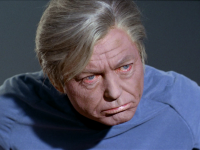
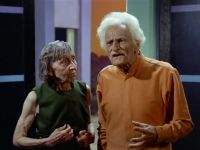
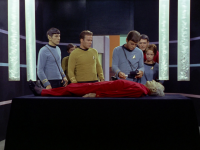
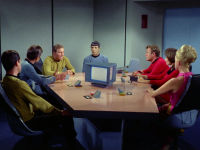
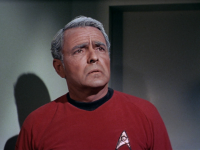
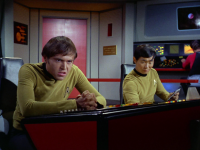
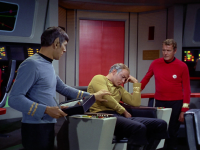
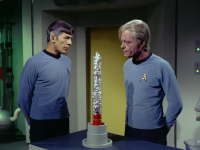
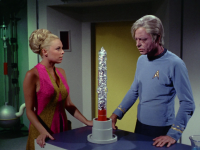
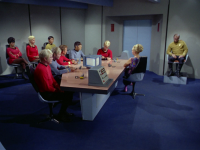
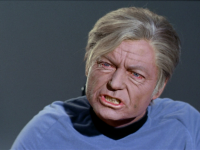
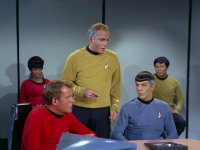
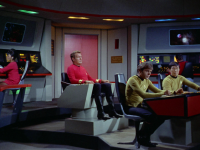
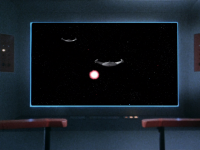
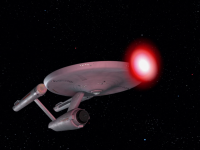
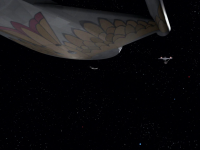
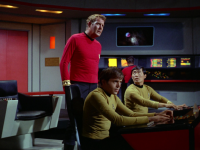
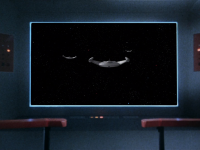
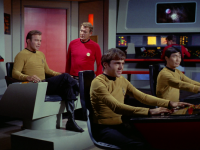
Star Trek TOS - 2x12 - The Deadly Years
Originally Aired: 1967-12-8
Synopsis:
Accelerated aging affects the senior officers and threatens Kirk's ability to lead. [Blu-ray] [DVD]
Filler Quotient:
3, bad filler, totally skippable.
- Pretty lame episode with no significant long term continuity.
Problems
- As Kirk ages, his hairline begins to recede. Then when he gets even older, his hairline advances again!
Factoids
- Kirk is stated to be 34 years old in this episode.
Remarkable Scenes
- Kirk: "Maintain standard orbit, Mr. Sulu." Sulu: "You already gave that command, sir." Kirk: "Oh? Well, follow it!"
- Chekov moaning about his medical adventures: "Give us some more blood, Chekov. The needle won't hurt, Chekov. Take off your shirt, Chekov. Roll over, Chekov. Breathe deeply, Chekov. Blood sample, Chekov. Marrow sample, Chekov. Skin sample, Chekov. If I live long enough, I'm going to run out of samples!"
- Kirk's senile behavior.
- McCoy: "I'm not a magician, Spock, just an old country doctor!" (Count #7 for "I'm a doctor, not a [blah]" style lines McCoy is famous for.)
- Commodore Stocker calling for a competency hearing against Kirk.
- The space battle with the Romulans.
- Kirk pulling the Corbomite maneuver.
My Review
A reasonably entertaining story mired by lousy science and faulty plot logic. Simply stated, a disease which causes the aging process to accelerate should be regarded as irreversibly terminal even in the fantastical Star Trek universe because McCoy's miracle cure is nothing short of a reversal of the aging process itself! To rationalize the story we have to make up a bunch of nonsense about how McCoy's miracle cure can only reverse artificial aging induced by the evil comet's radiation, so as to avoid the implications of the idea that McCoy has found some sort of anti-aging miracle drug. On top of that, the very idea that a mere injection could somehow reverse any kind of radiation damage in the first place is absurd to begin with, much less reversing the aging process itself.
Though I suppose if we assume that the Federation has access to cell damage reversal drugs beyond the wildest imagination of what science tells us is realistic technological advancement and we assume that the artificial aging induced by the comet is a somehow different and more innately reversible form of cell damage, then I suppose the science in this episode could be considered workable. However, if you've forced your audience to go into that level of depth to rationalize the events of your story, then you haven't written a very good story.
In addition to the science errors there are a number of wrinkles in the basic storytelling as well. For instance, why is Dr. Janet Wallace even aboard the ship? It's never once mentioned just what the hell she's even doing there. And why did we spend so much time on a competency hearing for Kirk in the middle of a crisis situation? Since he quite literally aged years waiting for the hearing to end, I had some sympathy for him when he condemned the procedures, regarding them as "the most fool thing I ever heard of. Competency hearing when there's work to be done!" Then finally there's the painfully absurd moment when Commodore Stocker orders the ship through the Neutral Zone despite Sulu's warning for completely no reason.
All that adds up to quite a stinker of a story for the most part, but there are charming aspects as well which render this one of the better picks of the bad episodes. The reuse of the Romulans as antagonists was a nice choice; especially the detail that we never actually see them face to face, in keeping with their tendency for a rather reserved and distant characterization as previously established in Balance of Terror. Another nice touch was Commodore Stocker's personality in general. Despite his completely boneheaded Neutral Zone mistake, he was a generally likable incompetent-Federation-bureaucrat-of-the-week, unlike most of the rest. Finally the reuse of the Corbomite Maneuver was a nice nod to the fans. All in all though this was a story with a lot of wasted potential.
The following are comments submitted by my readers.
- From Orion Pimpdaddy on 2010-05-11 at 8:45pm:
I often cringe when I have to watch an episode of Trek where the crew catches a disease that causes them to grow old. Almost every series had at least one episode where this happens. However, when I start watching The Deadly Years, I realize that it's really not that bad of an episode. It's cool how different members of the landing party age at different rates. I also think they did a great job with the makeup, given the budget of the show. The "trial" DOES seem to slow down the plot a lot, and I wish they would have skipped it altogether. Overall thought, I enjoyed this episode. - From Wiley Hyena on 2012-05-13 at 1:22am:
Reviewer missed the mark here. This episode is one of the funniest Trek episodes of all. McCoy stole the show. Give it a 7. - From Glenn239 on 2012-10-05 at 1:46pm:
Quote: “As Kirk ages, his hairline begins to recede. Then when he gets even older, his hairline advances again!”
Well, in all fairness to the makeup department, that’s pretty much what happened in real life too.
- From Alan Feldman on 2012-10-13 at 6:08pm:
"The Deadly Years"
At about 22m39s Spock tells McCoy that "the ship's temperature is increasingly uncomfortable for [him]" and that he's adjusted the temperature of his quarters to 125 deg., "which is at least tolerable". But he's standing right there where the temperature is normal without so much as a sweater and seems to be all right! Then he asks McCoy if there's something that would lower his sensitivity to cold. How about a parka? A great dialog exchange in that scene, though. And what's that 2 or 2 1/2-foot tall thing on the table?
I thought the aging-makeup was pretty good!
Yeah, the story's not all that sensible, so you watch this episode primarily for the "remarkable scenes".
In reply to Kethinov's question: Commodore Stocker ordered the ship to go through the Neutral Zone because he was in a hurry to save the crew before they aged to death. Time was of the essence. Still a rather risky move*, but it enables us to get the great rescue by the rejuvenated Captain Kirk at the end. Speaking of which, why do the Romulans suddenly stop firing when he arrives on the bridge? Also, why didn't Commodore Stocker at least shoot back?
* Recall that the Enterprise spent a considerable amount of time in Romulan space in "The Way to Eden" and weren't confronted by any Romulans, so it seems reasonable that there is at least _some_ chance they could take a short cut through the Neutral Zone and emerge unscathed.
Notice that Chekov is wearing his wig in the last shot! You can see his sideburn is covered by it. Maybe it's recycled from another episode.
I think the remastered special effects are in general overrated. They often make the "science" even worse than in the original, as in the Doomsday Machine where the just-killed planet killer slowly tilts downward. In the original it just stayed put and actually simply looked dead, and was very well done, to boot. In this episode we have the fireballs flying at the Enterprise in arcs. Say what? Seeing the shields actually absorb/deflect direct hits in this episode was pretty cool, though. But we also have ships making bank turns as if they were flying through air. Also, wouldn't the Romulan fireballs be the same as the plasma balls that destroyed asteroids in "Balance of Terror"? If so, hardly something the Enterprise's shields could withstand.
AEF - From jd_juggler on 2015-03-23 at 3:06am:
Regarding the competency hearing; why wasn't Kirk permitted to have a lawyer, or any representation? A lawyer might have objected to pretty much all of Spock's questions as "leading". - From jd_juggler on 2015-03-24 at 4:55pm:
In this and many other episodes, the 20th century is referred to as "ancient history". That doesn't make sense; when we use the term today it usually means a few thousand years ago, not a few hundred years ago.
Kirk did not have a lawyer or advocate of any kind for his competency hearing. If he had a lawyer, no doubt there would be an objection to pretty much every question asked by Spock - they were all "leading" questions. - From Rick on 2015-04-11 at 3:06am:
jdjuggler,
Leading questions are allowed in cross-examination or in the questioning of adverse/hostile witnesses on direct. Your objection, as it were, is overruled. - From Kevin on 2017-03-14 at 3:20pm:
Entertaining, but full of plot holes. Again, most of the Senior officers go down to a planet. Are there not competent normal guys/girls on this huge ship that can do anything?
Okay the aging process, was kinda fun, and interesting, but wow, they were cured instantly and look like they just hit the make up trailer!! Like no signs that anything even happened.
I really liked the Commodore, he seemed to be a good actor and personality. Shame he was not used more, but how he basically just sat there after he was put in command was stretching credibility. He has literally "Zero" ideas. Shields up, get us out of here, Sulu do something...Anyone have ideas??? He could have said ANY of that and appeared at least credible.
As it is, he appeared to go from a pretty good actor, to a cardboard, "Deskbound clueless high ranking officer" that classic Star Trek uses way too often.
Overall, pretty entertaining, but a lot of issues. - From Chris on 2019-02-10 at 12:35am:
The biggest problem I have with this episode, other than a lot of the other complaints, is the rate of aging!
McCoy says it's approximately 30 years for each day! Yikes!
Kirk's already 34! He'll be 120 in three days? Dead, is more likely! Not to mention Scott, who is aging a lot faster! Galway already checked out!
Spock: "We have a little less than a week..." I'll say!
Dead, Deader, Deadest!
Trek always plays games with distances and times in episodes for dramatic effect but it never works and it's very irritating to me!
As far as Spock needing a parka, We learned during Spock's Brain that their uniforms control temp very well...

Star Trek TNG - 4x05 - Remember Me
Originally Aired: 1990-10-22
Synopsis:
Dr. Crusher is trapped in a world created by her own mind. [DVD]
Problems
- If you can just order the ship to fly itself anywhere you want to go, why does the show ever bother with helmsmen?
- Geordi claimed that the bubble was collapsing at a rate of 15 meters per second and would last 4 more minutes and the bubble had already begun cutting apart the ship. According to these figures, the ship is nearly 4 kilometers long! We could attribute these inconsistencies with the fact that Beverly was in a universe created by her own mind. Besides, when the universe was collapsing in on Beverly, it wasn't chasing her 15 meters per second, as she was clearly outrunning it.
Factoids
- This is the second of three episodes that the Traveler will appear in.
- The Enterprise D was the fifth starship to bear the name Enterprise.
Remarkable Scenes
- Geordi freaking out at Wesley regarding his experiment.
- Beverly to O'Brien: "Was he invisible? Did I carry on a conversation with thin air?"
- People starting to disappear.
- Beverly griping about her missing staff and the bridge crew not understanding what she's talking about.
- Data justifying all the empty space on the space to Beverly.
- Beverly describing the missing crew to Picard.
- Picard trying to justify no crew to Beverly.
- Beverly confusing the computer when everyone disappeared but her.
- Beverly: "If there's nothing wrong with me, maybe there's something wrong with the universe!" Such a wonderfully audacious statement.
- Beverly asking the computer what the nature of the universe is and the computer responding with a prompt and definite but confusing answer.
- The computer attributing the explosive decompression to "a flaw in the ship's design." Sure, I guess. If you built your ship too large for the universe, that would be a flaw in the design!
- Beverly's return.
My Review
Static warp bubble? Excuse me? Now there's some incredibly absurd technobabble for you... This is one of the better Dr. Crusher episodes, except that it is plagued by technobabble and inconsistencies. The idea behind the episode itself is great, and fun in its execution. I enjoyed seeing Picard and Data justifying the immense size of the ship against an ever diminishing crew. It's also nice to see the Traveler back with Wesley. A loose thread picked up (but not wrapped up until later). I just wish the writers would have spent more time coming up with less absurd technobabble.
The following are comments submitted by my readers.
- From DSOmo on 2007-08-05 at 8:04pm:
- The graphics at the beginning of the episode, showing the Enterprise arriving and docking at Starbase 133, are the same graphics used in "11001001." However, on that episode the Enterprise was at Starbase 74. I understand the necessity to reuse these expensive-to-produce visuals, but why not make reusing them make sense? Wouldn't it have made more sense just to call Starbase 133, Starbase 74 instead?
- When Quaice turns up missing, Data scans the entire ship for life forms. He also suggests they check the transporter ID traces to see if the man went back to the starbase. One of the graphics shows the Enterprise docked at the starbase and connected by a tube. Quaice could have just walked off the ship. - From DSOmo on 2007-10-18 at 6:14am:
Near the end of the episode, when Crusher leaves the bridge, she boards a turbolift. When the turbolift starts to move, the light in the window goes from top to bottom. If the light is going from top to bottom, the turbolift is moving up. But Crusher boarded the turbolift from the main bridge. She is on deck 1. There is nothing above the main bridge to go up to. How can Crusher be going up? - From djb on 2008-02-01 at 5:52am:
Although it wasn't the best episode, this one was in the "alternate universe/timeline" vein, like Parallels and Yesterday's Enterprise, and I especially enjoy episodes like that. Notice the theme running through all three of them: something changes and only one character notices. Guinan in Yesterday's Enterprise, Worf in Parallels, and in this episode, Dr. Crusher. (There are others but they don't occur to me at the moment.)
One of the purposes of Star Trek, in my opinion, is to explore questions as to the nature of the universe, time, reality, perception, consciousness, etc. This is evident from the very start in the first Trek pilot, "The Cage." While the execution of this kind of philosophical/existential exploration may not always be perfect, I admire the willingness on the part of the writers and producers to go, basically "where no one has gone before," despite the imperfections. Crusher certainly went where no one has gone before in this episode: her own universe. Freaky! (There's something for your memoirs.) What if you suddenly started noticing drastic changes that no one else noticed? Put yourself in her place: I think she handled it quite well. A lot of people would go mad.
I liked the return of the Traveler, though his abrupt appearance was a little contrived. I also like the brief explanation as to the various uses of a ship of that size, because anyone who has looked at the plans of the ship knows it can hold a whole lot more than a thousand people. Probably my favorite moment in the whole episode is Dr. Crusher literally being hurled back into reality! Must of been a ton of fun for McFadden. Overall a nice character piece for Crusher, nice continuity with season 1, and a less-than-perfect yet enjoyable episode. - From Rob on 2008-04-13 at 11:38pm:
The part that always gets a laugh out of me is when Crusher and Picard are the only people left aboard and Beverly's utter astonishment at his attitude...
"This is all perfectly logical to you, isn't it?! You and I just roaming about he galaxy...," ect.
Just the way that Gates delivers these lines is really funny and the bemused look on Patrick's face.
- From CAlexander on 2011-03-11 at 7:04pm:
The first time I watched this episode, I was distracted and missed some of the key scenes on the real Enterprise when they discover what happened. That greatly improved the episode, as the good part is all about Dr. Crusher and the collapsing universe. I have fond memories of some of the ludicrous things like Picard's "We've never needed crew before" and the idea that it was a "structural flaw" that the ship wasn't designed to fit within the universe.
Watching it in full, though, makes clear why this episode is memorable but not great. Unlike the other great "alternate universe" episodes, the main character can't move the story forward in any way. We see that the universe is collapsing, and it is cool to watch, but that is it. The resolution is in the real universe with Wesley and the Traveller, but I found that quite dull. I just don't understand how the cliched idea of Wesley being "the Chosen One", who can "use the Force" to rescue his mother, is in any way interesting in the context of Star Trek. - From sphere on 2011-08-17 at 7:18am:
This was a great episode. It was spooky to see people disappearing so completely that no even remembered that they ever existed. The scene with Crusher and Picard absolutely alone on the bridge, alone on the entire ship - Picard still convinced everything that everything was fine and that Crusher had lost it - was haunting, compelling, and very well acted.
"We've never needed a crew a before..."
What a great line.
The twist that it was Crusher that disappeared and not everyone else was very well done and quite unexpected. I mean, I knew it was all going to get resolved somehow, but not in such an elegant way. I like how that revelation was executed too - just a sudden cut to Picard making a log entry in the "real" universe.
What almost ruined the whole episode for me was "The Traveler." He is like an amalgamation of every New Age cliche into an ever-smiling, infinitely annoying, quite unnecessary character. I found him very irritating to watch.
And what the heck was up with the solution to all this? The solution is for Wesley to type equations blindfolded, like some kind of nerdy Kung Fu monk, while listening to "The Traveler's Motivational Hypnotherapy, Disk 1?" Very, very annoying.
I want to give the bulk of this episode a 9, and the ending a 1, and I really don't want to average the two... so I think I will abstain from voting and recommend this episode, despite its unsatisfying, and rather irritating ending. - From Jeff Browning on 2011-09-29 at 4:33pm:
A huge problem you missed. In "Where No One Has Gone Before", Kozinsky is shown to be a complete idiot and a charlatan. So why is Wesley performing an experiment based upon his equations? And why does Wesley consult with him on the issue concerning the warp bubble? - From Will on 2011-09-30 at 8:59am:
In response to "If you can just order the ship to fly itself anywhere you want to go, why does the show ever bother with helmsmen?":
A helmsman would be required for battle scenarios, which could potentially happen at any time. - From Inga on 2012-01-30 at 12:08pm:
When Beverly ordered the computer to monitor Picard's vital signs, the computer reported his body temperature as 37 point something. The norm is 36.6, so was he ill? - From Glen on 2013-10-11 at 9:43pm:
It is interesting to go back and read the comment about absurd techno-babble when there are researchers looking into warp bubble technology today. - From Mike Chambers on 2013-11-22 at 10:19am:
Inga: It's because Picard is just so super-cool, obviously.
Great episode. One of my favorites. The vibe as everybody disappears slowly is very creepy. McFadden's acting as all of this is going on is spot-on. I'd have reacted exactly the same, very believable.
I just wish the Traveler didn't have to come and ruin the ending. He's so ridiculously annoying. Why don't he and Wesley just get it over with and spoon with each other already?
I'd have given this episode an 8, but I have to take off a point for the lame appearance of the Traveler and magical Wesley-fixes-everything-again ending... so it's a 7. - From Mike on 2017-07-30 at 1:25pm:
CRUSHER: “Data, I interned with him…I’ve known him for 15 years”
DATA: “I do not doubt you, Doctor. But I have tried 173 phonetic variations of the name…”
How can anyone dislike Data?
THE TRAVELER: “As long as she thinks she is alive, she is alive.”
RIKER: “What the hell does that mean?”
Well put, Riker. That’s pretty much what I’ve wondered after everything the Traveler has ever said.
This was a good episode. They didn't make it immediately obvious that it was Dr. Crusher who was caught in the bubble. It was also a well shot episode as they did a decent job of making people disappear in Crusher's midst. I do think pretty much all the inconsistencies can be explained, as you point out, by this universe being Crusher's own creation to include the idea that the ship can fly itself. - From Rick on 2018-03-08 at 2:31pm:
Kethinov, I believe you have made an error in your problem section. The episode is still partly to blame but not in the way you state. The warp bubble is a three dimensional thing. Geordi likely meant 15 m cubed per second. Given the way that Wesley’s computer simulation warp bubbles collapse, they spherical bubble collapses with an ever decreasing diameter. So it isn’t that every edge of the sphere is moving at 15 m/s but rather that the volume of the bubble loses 15 m cubes per second.
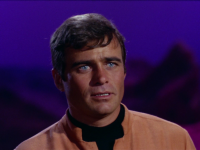
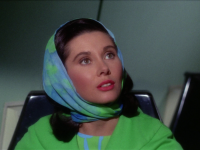
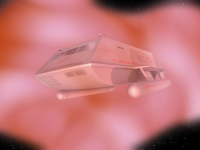
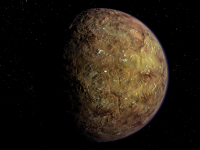
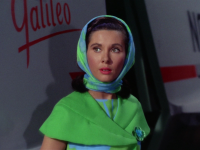
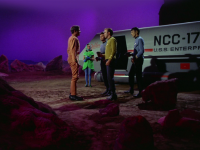

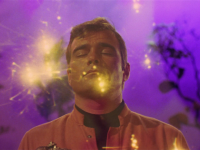
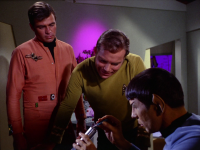
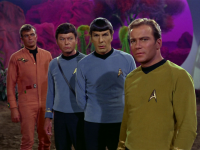
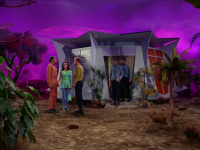
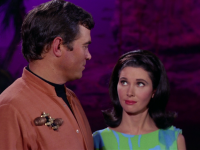
Star Trek TOS - 2x09 - Metamorphosis
Originally Aired: 1967-11-10
Synopsis:
The shuttlecraft Galileo makes a forced landing on a world with a single human inhabitant. [Blu-ray] [DVD]
Filler Quotient:
1, partial filler, but has important continuity. I recommend against skipping this one.
- The Zefram Cochrane character is first introduced in this episode, although it is his chronologically final appearance.
Problems
None
Factoids
- This episode establishes that Zefram Cochrane invented warp drive.
- This episode establishes that Zefram Cochrane is at least 237 years old.
- This is the first episode to feature a Federation universal translator device.
Remarkable Scenes
- Cochrane's sudden appearance before the landing party.
- McCoy, regarding Cochrane: "Talks a lot, but he doesn't say much."
- The revelation of who Cochrane really is.
- Cochrane: "Believe me captain, immortality consists largely of boredom."
- Kirk enticing Cochrane to rejoin the universe.
- Kirk conspiring to attack Cochrane's companion.
- Kirk negotiating with the companion.
- Cochrane agreeing to stay with his now in human form companion.
My Review
This was a charming story with a premise that should not have worked anywhere near as well as it actually did. If I were to describe the episode to someone as "Kirk, Spock, McCoy, and annoying Federation bureaucrat of the week crash land onto a random alien planet," I would likely receive yawns in response. However, adding in details like "whereupon they discover the long lost Zefram Cochrane, the inventor of warp drive, still alive despite being aged over 200 years, sustained by a neurotic alien entity which has fallen in love with him," I suspect I might raise a few more eyebrows.
The appeal of this episode lies solely with Cochrane. It takes an unfortunate twelve minutes into the story before the narrative finally allows Cochrane to reveal his backstory (we can't let the plot move forward too quickly now, can we!), but when he finally does, the implications are fascinating. What kind of life has this man led? As he interacts with the landing party, the story grapples with concepts like immortality, eternal captivity, and inter-species love in remarkably compelling ways.
However, I would have enjoyed a deeper exploration of Cochrane's life on pre-Federation Earth. Why did he invent warp drive? How did he achieve the breakthrough? What were relations with the Vulcans like before the Federation existed? Given Cochrane's "parochial" and arguably racist and xenophobic attitude towards aliens, I can only imagine that Cochrane's era was a considerably different one. But the episode spends little time on the totality of Cochrane's long, storied past.
Both Nancy Hedford's character as well as the entity fell considerably more flat, as Nancy spent most of her time acting irrationally and the entity came off as a female version of Nomad. Even with the two of them combined at the end of the episode, there still wasn't enough personality between them to add up to being a compelling character. It's also worth noting that the companion unilaterally inhabiting Nancy's body could be seen as morally questionable, but since Nancy seemed to be all for it after the fact, it could be dismissed as voluntary. I suppose since her only other choice was death, the moral ambiguity is somewhat moot.
Speaking of death, I found it intriguing that Kirk repeatedly argued that the eternal captivity of Cochrane and the landing party would lead to their deaths. Kirk's statement was at best a metaphor and at worst a lie. Nevertheless, it was a perceptively persuasive tactic. Kirk basically recognized that the landing party was brought to this planet because Cochrane wished for companionship. Kirk expanded on Cochrane's dissatisfaction with the boredom of captivity to convince to the entity that her solution would be ineffective in the long term because that boredom would merely reassert itself in short order. Sure, some of his rhetoric may have been a bit less than accurate, but what good diplomat doesn't fudge the truth every now and then? ;)
A final wrinkle in the story is Kirk's refusal to reveal the discovery of Cochrane to the Federation, nor the true fate of Nancy. I can understand Cochrane's desire to avoid fame, but doesn't Nancy have at least a single person in the Federation who cares about her? Parents, siblings, family of any kind? Won't they want to know what happened to her? Won't they want to come visit her? Perhaps throw a wedding party? Kirk was responsible for Nancy's safety, as he himself so appropriately pointed out in the middle of the story. It was irresponsible for him to lie about her fate after the fact.
Overall though this was a terrific story. I'd love to see the Zefram Cochrane character again in subsequent episodes or at least learn more about his apparently pivotal role in the history of Earth and the Federation.
The following are comments submitted by my readers.
- From rhea on 2008-04-27 at 6:25pm:
I can think of one reason why the episode is disliked, at least by me for: the racist-sexist notion in Cochranes reaction to the gender/sex of the Companion. As long as he does not know it is female he believes it to be a good buddy. When it turns out to be female and maybe in love with him, he is so utterly disgusted, I want to slap him - hard. So what does it mean: companionship is ok, but interspecies/interracial love is disgusting?? Then the Companion decides to give up immortality and live on in Nancy Hedford's body, and all is well again? I for one am happy he stayed on the planet, for all the poison he was spewing against interspecies relationships.
Some may say he felt raped, sexually violated, but I am not sure that I accept that. - From Orion Pimpdaddy on 2008-07-19 at 5:36am:
Decent episode. I love the part where Kirk is talking to Cochrane about how far the Federation has come in terms of the numbers of planets humans inhabit and how much intelligent life is out there. - From Rick on 2010-05-10 at 2:06pm:
Also, Cochrane would be hailed as the "inventor" of the warp drive, for earthlings, but obviously, all the other species discoverd warp drive for themselves. They make it sound like cochrane invented warp drive for everyone in the galaxy, but of course, that's not the case. - From Old Fat Trekkie on 2011-12-08 at 9:16am:
If for nothing else, this episode is great due to the conversation between the Companion and Kirk.
On one hand you have Kirk hamming it up while uttering "Companion ..." on the other, "The man must continue ... It is necessary."
Who thinks this stuff up? - From Scott Hearon on 2014-04-06 at 1:20pm:
I give it a 7/10.
Kethinov covers the same gripes and weaknesses that I have for the episode. Those aside, there was a lot to like about it.
I feel that, rather than the drawn out reveal of who Cochrane was, that time would have been better spent showing us an exchange between the Companion and Nancy. A negotiation between them could have been extremely heart-felt, philosophical, and engaging. As it was, it did raise very serious questions about the ethics of the invasion of Nancy.
More time could also have been given over to the exploration of Cochrane's bigotry. It's actually an interesting idea, and we could perhaps have gotten a glimpse of his true motivation. Maybe it wasn't innocent curiosity about the universe that guided him, but rather a desire to find and dominate other life forms. An idea like this could have set up some interesting exchanges between him and the Enterprise crew about the Federation's mission. This would have been a great opportunity to reveal the true heart of Star Trek, as Roddenberry conceived it.
These missed opportunities aside, there was a lot of great food for thought in this one, with a few great little moments. One that immediately comes to mind is Spock's desire to learn as much about the Companion as possible, seeing it as an invaluable opportunity to learn. That's great stuff. - From Rick on 2017-02-07 at 3:17am:
You guys are completely missing the point on Cochrane's reaction. He felt sexually violated. Understandable reaction.
Cochrane would still be famous throughout the Federation since he discovered warp drive for the planet that would spur the founding of the Federation. Without him... no Federation. - From Chris Long on 2017-11-22 at 9:19pm:
I really liked this episode and your review for me was spot on.
The thing I didn't like about it was Nancy's fever. As was/is done in so many TV shows then and now, they always describe fever symptoms backwards!
People with fevers are NEVER hot, but are always cold due to the elevated body temp relative to the ambient air temp! McCoy is no doctor IMO!!! ;-)
Just a peeve of mine...

Star Trek DS9 - 3x05 - Second Skin
Originally Aired: 1994-10-24
Synopsis:
Kira is kidnapped by the Cardassians, who try to prove to her that she is really one of their people. [DVD]
Filler Quotient:
0, not filler, do not skip this episode.
- Kira's Cardassian "father" will become a more important character later and Garak's role in this episode is also important to his ongoing character arc.
Problems
- Why didn't the Defiant cloak through Cardassian space instead of risking exactly the kind of incident with the Galor class warships they ran into?
Factoids
- Kira declares her hatred of holosuites in this episode.
Remarkable Scenes
- Kira meeting people who remember her who she's never met.
- Kira a Cardassian.
- Kira chatting with "her father."
- Sisko and Odo extorting Garak to help them.
- Kira seeing her own dead Bajoran body.
- Garak bluffing(?) his way past the Galor class warships.
- Kira uncovering the plot to ruin the Legate.
- Garak killing his old nemesis.
- The Legate telling Kira never to trust Garak despite how he helped them.
- Kira's expression of respect to the Legate in the end.
My Review
This is a nicely constructed episode. The mystery plot is enticing all the way up to the end. All through the episode, the mystery just gets more and more confusing; personally, I enjoy an episode I can't immediately figure out which surprises me in the end. I like how the climax involved a minimal amount of senseless violence. Garak's pointed murder of his old nemesis being the exception, but this is Garak we're talking about. He's forgiven! It annoys me once again that the Defiant is being used as Sisko's personal taxi, but we're given a better reason this time, the ship almost came to blows with Cardassian warships. Finally, I enjoyed the ending, especially the final scenes. Usually in stories like this, the victim (in this case Kira) is left with a profoundly traumatic experience. But Kira has developed a new respect for Cardassians, similar to what we saw of her in DS9: Duet. This episode could have been much better though if so much time wasn't wasted on the mystery. I'm not sure what they could have replaced it with, but if you watch this episode and compare it to DS9: Duet, something about DS9: Duet just feels like stronger storytelling. A fairly average episode.
The following are comments submitted by my readers.
- From martin on 2007-09-26 at 8:21pm:
I think the Defiant did not cloak because of their deal with the Romulans about not being permitted to use it outside the Gamma quadrant. - From Pemmer Harge on 2010-06-19 at 9:51pm:
The best episode of Deep Space Nine - From McCoy on 2017-01-04 at 8:30pm:
You've rated this only 5? Same as previous, boring Dax story? I really don't understand. This episode is absolute 10 for me. Intiguing mystery, solid emotions, great development of Kira-Cardassians relationships. Truly, one of best DS9 episodes!

Star Trek DS9 - 6x20 - His Way
Originally Aired: 1998-4-22
Synopsis:
A new Holosuite program gives birth to "Vic," a 60's crooner who also provides advice for the lovelorn. [DVD]
Filler Quotient:
0, not filler, do not skip this episode.
- Numerous major long term plot threads are serviced here.
Problems
None
Factoids
- This is Vic Fontaine's first episode.
Remarkable Scenes
- The crew's reaction to meeting Vic.
- Odo "playing" the piano.
- Vic describing how difficult it was to get an holographic image of Kira. He got it from one of Julian's spy programs ;) Good connections with DS9: Meridian and DS9: Our Man Bashir.
- Vic transferring himself to the other holosuite to talk to Kira.
- Vic setting up Kira and Odo.
- Odo figuring out that he's been on a date with the real Kira all along.
- Odo and Kira's frustrated public display of affection on the promenade.
- Morn Appearances; 1. Is sitting at the bar when Bashir walks in to talk to Quark. 2. Can be seen barely when Kira goes into Quark's. 3. Watches Kira and Odo kiss.
My Review
Well, all I can say about this episode is "finally!" DS9 fans have had to wait for five years for Odo and Kira to finally realize they're in love with one another. While I'm not fond of the episode in general, nor am I all that fond of Vic Fontaine, the fact that this episode finally brings Kira and Odo together is worth a few extra points. Talk about tying up a loose end.
The following are comments submitted by my readers.
- From Abigail on 2008-12-18 at 5:11am:
I sometimes feel that the writers of DS9 were unaware that you can develop characters through normal sci-fi epsiodes. You don't have to invent an episode with no external plot to do so. If I wanted to watch a goofy soap opera, I would. No need to turn "Star Trek" into one. - From Christopher Wright on 2012-01-16 at 9:20pm:
I disagree with the previous comment. I am not normally one for sappy romance stories, and redcuing this episode down to such isn't fair. The romantic tension between Odo and Kira has been so well-developed and stretched out that when the kiss came I almost jumped up and yelled "yeah!" with clenched fist. I also liked Vic a lot. This episode should have a higher rating. Lastly I would like to say that the costume design on DS9 if by far the best. Odo's tux and hologram Kira's dress were very nice touches. Those combined with Quark and Garak's wardrobes in other episodes really show off the designers' talents. - From hugo on 2013-01-20 at 7:40pm:
through the first half of this ep, i thought this was developing into a yawner - no suspense or sense of urgency. Then I found myself smiling through the rest of it, don't really know why. I liked vic too! - From carsonist on 2013-09-29 at 4:36am:
I can't believe how annoying this episode is. Instead of a second plot, they have four unbelievably long songs. Vic is fine, but takes up a lot of time in a series in its next to last season during a major war.
Kira and Odo getting together is great, but there's nothing else that happens in the whole episode. You could cut the whole thing down to maybe ten minutes. - From Scott on 2018-10-15 at 2:15am:
I didn't think I would like it, but I did. Normally the holosuites are an overused story device, but Vic's just a great character. Wouldn't it be great to have a guy like that you could talk to about your problems?

Star Trek Voy - 6x16 - Collective
Originally Aired: 2000-2-16
Synopsis:
Voyager encounters Borg children. [DVD]
Problems
- Why didn't the Borg destroy the cube instead of just arbitrarily declaring it irrelevant? If the Borg children hadn't accidentally blown it up, it would have just sat there for any alien species to salvage. Which brings me to my next point. Why didn't Voyager steal transwarp coils? You could argue that they didn't have the time; that all their resources were directed at saving the away team, but given the heist they made in Voy: Dark Frontier, you'd expect they could pull off another one with a quickness.
Factoids
None
Remarkable Scenes
- The teaser. Holy crap! Just like TNG: The Mind's Eye ;)
- The Delta Flyer fighting the Borg cube.
- Voyager's encounter with the Borg cube.
- Seven of Nine encountering the "neonatal" drones.
- Harry, within the Delta flyer, within the Borg cube.
My Review
Mixed feelings about this one. On one hand it's got great special effects, a compelling story (mostly), and very real consequences. On the other hand the episode utterly fails to live up to its premise. The story it decides to tell isn't half bad, but the story they could have told with it could have been much better. And the flaws along the way ruin some of its greatness. Specifically, the idea of rescuing Borg children from the maturation chambers is a good one, but the idea of a Borg ship with all the drones excepting the children dead was a bad one. It's also inconsistent with Borg behavior. It's been said that the Borg usually return to salvage their technology. At the very least, they should have destroyed the cube. In a better version of this episode, Voyager could have encountered a damaged Borg ship and gone hunting for transwarp coils again (why didn't they do that by the way?) and they could have accidentally destroyed the power source to the maturation chambers. So now Voyager is faced with rescuing the dying children or completing their heist. They choose to save the children. Same outcome, better story. With a full compliment of Borg aboard, a much more exciting one too. In short, this was a fair episode, great consequences, decent ride, below average plot. Could have been improved upon easily.
The following are comments submitted by my readers.
- From Pete Miller on 2007-01-12 at 8:57pm:
I agree that the story could have been better, but I still think it was an above average plot. Certainly better than Tsunkatse, which got a 7. But I do agree that a lot of it was unrealistic as far as the Borg just leaving the cube floating in space for anyone to salvage. I wouldn't put it past them though, with their ridiculous arrogance. - From szycag on 2008-09-29 at 6:43am:
This episode is absolutely vile. The last thing I want to see is bad child actors parading around as Borg. I understand the circumstances of the plot, but even considering them... it's just a major disappointment and it's done all wrong. Voyager's writers seemed intent on trivializing the Borg to the level of just another ST villain. Yeah, it's cool to see them out of their element once in a while, but not like this. The leader kid's acting is especially bad. - From Harrison on 2012-12-20 at 4:55pm:
Yes, a flawed episode that could have been a great one. The flaws are disruptive to the general Trek narrative, undermining hitherto established basics -- eg, that the Borg return for their technology, or destroy it, when a vessel is disabled. Adding to the list of problems ... what happens to the Borg baby? The writers took care to establish the children as recurring characters, yet the baby is never, ever mentioned again in any episode. - From TheAnt on 2013-10-09 at 11:09am:
The Star Trek take on Lord of flies
Even though this isn't one of the very best of Voyager, it still stand out as one of the better episodes of the series.
One detail I especially like is that the deck of cards which take all attention for the 4 in the shuttle so that they are caught in the first place.
Also foils the plan to blow up the cube shield generator when the Borg girl use the cards to follow and find ensign Kim.
Thumbs up and a must see!
- From Dstyle on 2015-07-30 at 7:49pm:
You know that Collective voice you hear whenever you communicate with a Borg cube? "We are the Borg, you will be assimilated, your biological and technological distinctiveness will be added to our own, resistance is futile, et cetera et cetera..." I always assumed that was thousands of drones on the cube speaking as one. I guess not. I guess it's just... like, a vocal filter anyone on the Cube can use.
And why the heck do the Borg keep biographical data on the individual drones? Seems like an incredibly inefficient use of computer memory, especially if all of the drones had access to those files.
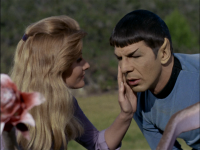
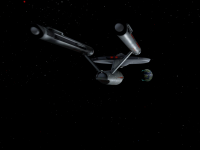
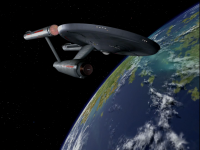
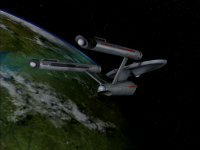
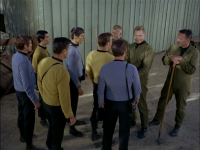
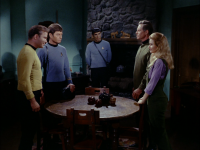
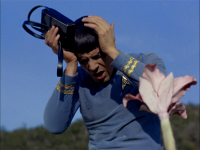
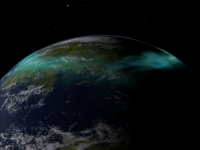
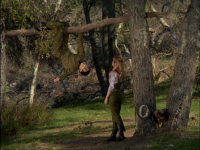
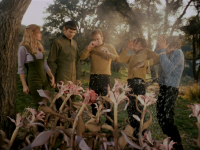
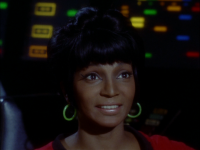
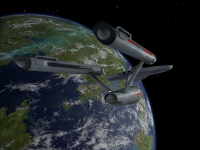
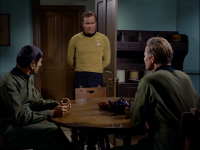
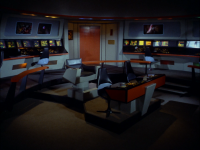
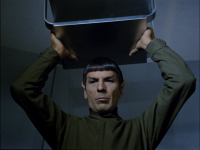
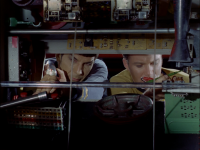

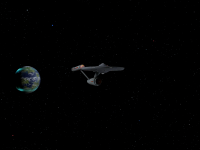
Star Trek TOS - 1x24 - This Side of Paradise
Originally Aired: 1967-3-2
Synopsis:
The Enterprise visits a colony where indigenous flower spores provide the settlers with peaceful contentment. [Blu-ray] [DVD]
Filler Quotient:
3, bad filler, totally skippable.
- Pretty lame episode with no significant long term continuity.
Problems
- Vulcans are inexplicably referred to as "Vulcanians" in this episode.
- Who beamed up Kirk when he returned to the ship to find it deserted?
Factoids
- When asked for his full name by Leila, Spock answers, "you couldn't pronounce it." This implies that all Vulcans do indeed have multipart names like humans, but casually shorten their names so that other species can interact with them.
- According to Spock, his mother was a teacher. His father was an ambassador.
Remarkable Scenes
- Spock hanging from a tree.
- Kirk getting irritated at all the infected crewmen.
- Kirk alone on the bridge.
- Kirk insulting Spock.
- Kirk: "Maybe we weren't meant for paradise. Maybe we were meant to fight our way through, struggle, claw our way up, scratch for every inch of the way. Maybe we can't stroll to the music of the lute; we must march to the sound of drums."
- Spock: "For the first time in my life I was happy."
My Review
Much like The Return of the Archons, the pacing of this episode is mind numbingly slow. It takes twenty minutes for the story to finally get to the point which is (for the most part) the emotional unraveling of Spock. Once Spock's emotional control is finally destabilized, we get a reasonably amusing story which explores Leila's unrequited love for Spock and Spock's secret desires to explore his humanity. Unfortunately these themes are not explored in much depth though because the story focuses mostly on the silly mutiny aboard the Enterprise. While Kirk does an excellent job dealing with the silly mutiny in a professional and innovative fashion, the mutiny wasn't a terribly interesting plot thread to begin with.
Another one of the episode's missteps was the overwrought capabilities of the flower drug in the first place. By the end of the story we learn that consumption of the flower spores can not only insulate people from deadly radiation, but that it can also vastly improve physical health, an effect which McCoy even mentions is permanent in the final scene. For that reason alone these flowers should be harvested and studied for their medicinal use, but no serious mention is ever made of their incredible scientific potential. They are instead only regarded as a pest for their mutinous side effects. Once again a Star Trek episode fails to thoroughly think through the implications of a plot device.
Overall the episode is mildly entertaining. If you can sit through the first twenty minutes without getting too terribly bored (which is challenging), it can be a lot of fun to watch the main cast run around doing crazy things once they all get infected. The story also offers some decent character development for Kirk as well as Spock. A better episode however would have limited the scope of emotional destabilizations just to Spock for the sole purpose of exploring his constant struggle with emotions due to his "half-breed" nature. We got a taste of how good a story that could be in both this episode as well as previously in The Naked Time and I believe a story focused solely on that would be a superior piece.
The following are comments submitted by my readers.
- From Orion Pimpdaddy on 2007-12-14 at 6:54pm:
I truly think this episode deserves a 10. Am I crazy? Well, I just think that almost every moment is entertaining. The moments that stick out the most are:
-Spock daying “I don’t think so, sir.”
-Spock hanging from a tree and looking playful
-Kirk making Spock angry. This part has some of the most funniest dialogue in the franchise! Your father was a computer, and your mother was a librarian. You should be squatting on a mushroom. Classic!
-Kirk walking around an empty ship. They writers actually allow Kirk to reflect on it.
-Dr. McCoy starting a fight
-Spock’s love story, which is done very well.
I think this episode also has a meaningful lesson: A society in paradise cannot advance itself.
To top is off, there’s a great, grim line from Spock that ends the episode, as opposed to the cheerful jokes that often end TOS episodes.
Great episode!
- From tony on 2009-01-17 at 2:33am:
When Kirk beamed back up, there were many crewmen left. In fact, he ordered some back to their station. - From Orion Pimpdaddy on 2009-10-27 at 8:18pm:
I just watched this again on Blu-Ray, and I still love it. The picture quality has been upgraded dramatically. Specifically, there are many scenes that take place outside in the sunshine, which shows off the high contrast of HD. - From Alan Feldman on 2014-07-04 at 3:53am:
"This Side of Paradise" or "The Amish on Drugs, but without a religion"
Re the problems you mention:
Vulcans and Vulcanians. Just like Australians and Aussies, Dutch and Netherlanders, New Jerseyans and New Jerseyites, or Brits and Britons, etc. No biggie. Several states in the U.S. have multiple names for their residents (see http://en.wikipedia.org/wiki/List_of_demonyms_for_U.S._states ). Some countries do, too. BTW, I do prefer "Vulcan," but I can go with Vulcanian. Adds some variety and spice, if you like.
"Who beamed up Kirk?" When Kirk returns to "an empty ship," there must have still been a few remaining to beam down. There's nothing I see in the episode that's inconsistent with this. In fact, just before he goes back, Spock says, "Almost the entire ship's complement has beamed down." So Kirk could still get back up to the ship. Once he reaches the bridge, _then_ the very last of his crew leave the ship.
>----o----<
I think the first 20 minutes is fine. Spock is already infected halfway through the 16th minute. Think of it as "the first fifty pages" of a novel, if you have to.
Hey, for once the planet isn't rotating way too fast! In fact, it looks like it's not rotating at all, which is how it would really look. Bravo!
A fun episode, but as usual, there are some problems.
>----o----<
This is paradise? Working the fields? Not _my_ idea of paradise! If you ask me, in "paradise," _someone else_ works the fields, _someone else_ does the dishes. OK, to be fair to all involved we'd need to make robots to do all the grunge work. I suppose that's the trouble with paradise: somebody somewhere has to pay for it. Even the berthold rays can't do everything. And what about entertainment? Ah, the spores numb you from the awfulness of boredom.
And they also give you perfect health! But can they regrow an amputated limb? That would be pretty good! --- Yes, it'd be cool to use it as the all-purpose cure. You get sprayed by the spores, then use strong or violent emotions to return to normal. (Pretty bizarre cure.) But it doesn't ruin the point of the story.
Oh, another thing that would help make a place paradise is a perpetual motion machine. Yeah, good luck making one!
What about plumbing, and all such related matters? Could get pretty messy. And what about other basic supplies? This is paradise?
>----o----<
Where do the berthold rays come from? I don't think it was ever said. They were just there. It _was_ said that they were a "recent discovery." Still.
"Is it possible that they're not [alive]?" asks Sulu. Say what?
They grow only enough food for themselves. Well, that's bad if there's a famine (unless you include that in the calculation). Aside from that, whom else should they be growing food for? Did they travel there to start a business?
Why does Star Fleet insist on a forced evacuation due to the danger of the berthold rays? It's pretty damn obvious that after three years, the colonists' superb health shows that they're not in any danger. (Of course it'd be less of a story without the orders for an evacuation.) And why should they leave if they don't want to, anyway? They're self-sufficient and happy, even if boring, stagnant, and unproductive. And they're not bothering anyone. Leave 'em alone. OTOH, they apparently didn't want that life once they were forced off the spores. (Well, except for Leila, who apparently wanted Spock at all costs.) Could go either way, I guess. Additionally, who the hell is Star Fleet to order them around, anyway?
Lots of fun stuff, esp. with Spock, as has been pointed out by others. Most of the scenes with Spock high are terrific. It's always a blast when he smiles so much! Fortunately it's quite rare, so as to not ruin the effect. The only other episodes I can think of offhand with Spock smiling big-time are "The Menagerie" (yes, "The Cage" part) and "Plato's Stepchildren". Oh, and "Where No Man Has Gone Before".
McCoy definitely sounds high on the spores. Sort of like a drunken (for lack of a better word) happiness, but still mostly in control of himself. He must have had a strong dose!
How is it that when Sulu and the blue-shirt were sprayed by the flower, not even one spore landed on Kirk, even though he was right next to Sulu, whose chest got covered by plenty of them?! OK, he was maybe few inches back. Still. But since it was obviously intentional, it was well done. The spores only hit Sulu and the blue-shirt. I wonder how many takes it took.
Notice that the plant that did get Kirk, wasn't there in the scenes just prior. Perhaps overlooked, or maybe there just wasn't enough time to redo the scenes due to the tight shooting schedule. And the plant picks itself up to shoot at Kirk!
I loved it when Uhura turned around in the seat all glowing with some kind of high: "Oh, I'm sorry, Captain. I can't do that," and with just the right music to set the mood. Pretty good.
I love the scene where McCoy gets hostile with Sandoval.
Why does the subsonic transmitter make that obnoxious noise on the ship? (Speaking of which, tricorders also make an annoying noise.) I'm almost amazed they didn't have some "audible" subsonic sound down on the planet. But I am glad they didn't. And via what communicator are they broadcasting these subsonic sounds? How does that work?
"We wanted to make this planet a garden," Sandoval says. This is the big goal? To make the planet a garden? I see. Travel dozens of light years or more to some strange planet to make it a garden. Some goal. Maybe I'm missing something here.
The scene with Kirk goading Spock into a fight was pretty good!
Isn't Spock visibly concerned with letting down Leila at the end? Isn't that emotion? Isn't there just that slight smile on his face when he says, "You couldn't pronounce it"?
Speaking of Leila, I think Jill Ireland did a great job as her.
That "sweet" flute music is used several times. It works best at the end when Spock says, "I have little to say about it, Captain, except that for the first time in my life, I was happy." What motivates him the rest of the time? Logic doesn't provide a goal; it just helps you get there.
I'd definitely rate this episode higher than 3. Certainly at least a 6. Perhaps a 7 or an 8. There's definitely lots of great stuff in this episode!
AEF, aka betaneptune - From Stewart Snider on 2019-03-06 at 12:33am:
Seeing Spock in love caused me to forgive all the plot contrivances here. Kirk's loneliness on the bridge was compelling as well.

Star Trek TNG - 4x15 - First Contact
Originally Aired: 1991-2-18
Synopsis:
Riker is badly injured on a first contact mission. [DVD]
Problems
- How could the Malcorians not notice the big honkin' starship Enterprise in orbit of their planet? Seeing as how they're advanced enough to have warp drive, one would assume they'd have satellites in orbit capable of scanning the space around their planet.
Factoids
- This episode bears the same name as the later Trek movie First Contact. The episode and the movie have similar stories too. A species experimenting with warp drive is visited by a more developed species.
Remarkable Scenes
- The aliens freaking out about Riker's alien physiology.
- Riker, regarding his fingers: "Yes, isn't that something? My father's were the same way."
- Picard and Troi beaming into Yale's lab.
- Yale believing that Picard and Troi are a joke.
- The mentioning that UFOs in the Malcorian sky were dismissed as weather balloons...
- Picard sharing the wine his brother gave him in TNG: Family with Durken. A nice detail, because Robert asked Picard not to drink it alone, and Picard kept his promise.
- Durken: "I will have to say this morning I was the leader of the universe as I knew it. This afternoon I am only a voice in a chorus. But I think it was a good day."
- Nurse Lanel bribing Riker with escape if he has sex with her. The details aren't clear, but it might be safe to say Riker took her up on that!
- The alien doctor refusing to do any harm to Riker.
- Krola attempting to martyr himself, only to be hit with a stun setting.
My Review
At first Krola's stuffy conservatism just seemed like stuffy writing. His whole character seemed so ridiculous that even right wingers might find him to be an unfair caricature. But by the end of the episode it's hard not to recognize Krola or aspects of Krola's attitudes in the politics of real world conservatives. This fictitious situation clearly illustrates how much a conservative mindset can hold back the progress of an entire society. A fine episode.
The following are comments submitted by my readers.
- From DSOmo on 2007-08-24 at 10:44am:
- The head of state needs a more observant receptionist. When the chief scientist introduces Picard to the head of state, they walk into his office. Actually, the scene features the calm voice of a receptionist - over an intercom - announcing that the chief scientist has someone for the head of state to meet. The receptionist's voice is amazingly dull considering the striking physical differences between Picard and the Malcorians.
- After Picard proposes a toast, the head of state says of the wine, "We have something very much like this on Malcoria III." What are the chances that this man would use the same designation for his planet that Starfleet does, especially since the Malcorians believe they are the center of the universe? Would a culture that believes itself the center of the universe call its planet by the name of its sun and the planet count to that sun? Maybe we should change the name of our planet from Earth to "Sol III."
- This makes three times that the matte painting of this city has been used: It was the main city on "Angel One"; it was also Starbase 515 in "Samaritan Snare"; and in this episode, it serves as a medical facility in the capital city of Malcoria III. - From djb on 2008-02-29 at 8:40am:
- I wouldn't be so quick to judge Krola, or the writers' intentions in making his character as he was, or even conservatism in general. I definitely have my problems with conservatism, but I have my problems with liberalism as well. I think they need to both exist to balance each other out. Indeed, without conservatism acting as a bit of a brake on the speed of progress, things can easily get out of hand and overwhelm people. Of course, without progressive ideas, society stagnates. Krola may be an extreme example of conservatism, as he was willing to not only martyr himself but actually martyr himself in the context of a lie with very serious repercussions, but the point still gets across.
The fact that a man like him is so high up in government strongly indicates that a large bloc of the population shares, to some degree, his conservative outlook, and would be just as hostile, if not more so, to accords with alien races. One can therefore come to the correct conclusion that the Malcorian people in general are not ready for contact with alien races, even though some of them might be happy about such a development. The final assessment that first contact should be put off for a time is sad, but most likely correct. Until the people in general reach a "critical mass" of readiness for such contact, ramifications of such an event could be disastrous, and counterproductive to the goals of interplanetary contact.
- Establishing first contact with an alien race is the kind of mission I would expect the Federation's flagship to go on. It's good to see them doing something other than scientific surveys and taxi services. It's also good to peer into the very complex and delicate situation of first contact. Imagine yourself in Durken's or Mirasta's place... or Picard's. Or Riker's!
- I liked the humorous interlude of the Malcorian nurse bribing Riker for sex. You could tell her intentions the minute she walked in the door! (Can any one say "Xenophile?") Riker is a ladies' man, for sure, but you could tell he was more than a little dismayed at being forced into sex with an alien just to get free... only to be beaten within an inch of his life while attempting escape. Talk about adding insult to injury. Or, in this case, injury to insult.
- Just a thought: The Malcorians apparently have a 29-hour day. I wonder... since they don't have ten distinct digits like we do, who's to say they are necessarily operating in base 10? Or did the universal translator figure that out? How long is their day, really, and why in the world would anyone use a large prime number for any measuring system? One wonders...
- I, too, wonder why someone down on the planet didn't notice a rather large UFO in orbit. Even if the Federation is against the idea of their ships using cloaking devices, wouldn't they want to develop them for this purpose at the very least? A civilization advanced enough to develop warp drive is almost by definition able to detect objects in orbit around their planet!
- The only drawback of this episode, for me, is how it starkly reveals the shortcomings of the "universal translator" storytelling device. Riker had the Malcorians fooled until they discovered his out-of-place organs and his digits. Either Riker learned the Malcorian language flawlessly (not very plausible), or the Universal Translator manages to simultaneously translate the speaker's words, simulate their voice, and make the speaker appear as if they're speaking the language (also quite implausible). This makes me beg the question: how exactly does this device work?! Do the producers just sacrifice believability for ease in storytelling? - From JRPoole on 2008-05-09 at 4:45pm:
I'm in almost complete agreement with the post above. Aside from the (admittedly huge) problem of the univeral translator, this episode is top-notch. - From Jim on 2008-06-08 at 1:19pm:
"I'm not going to go off on a political rant here, but I will say that this fictitious situation clearly illustrates how much a conservative mindset can hold back the progress of an entire society."
You clearly are going off on a rant. Krola's point is one which the writers may not be sympathetic with, but which is understandable and which the Prime Minister sympathises with. Your own propensity to fly off the handle at 'conservatism' makes you seem as narrow-minded as the people you criticise. - From Kethinov on 2008-06-08 at 7:49pm:
Your comment is as needlessly insulting as its point is baseless. The whole point of conservatism as a political ideology is to keep things as they are. That is the very antithesis of the progress and growth of a society.
Maybe you didn't notice, but the whole point of this episode was to take the conservative political ideology to its logical extremes to point out how silly the whole perspective is in the first place. - From Bernard on 2008-06-08 at 10:51pm:
Firstly, I like this episode a lot, mainly for the reasons djb has already stated. But I have to say that I feel that storytelling works nicely when you use characters to portray opposing sides to a debate. Here we have Yale on one side, Krola on the other and Durken somewhere in the middle. I do not agree that they are trying to show the futility of conservatism at all, they show both sides of the argument and allow the viewer to make his/her own mind up. Some of us will see it one way and some of us will see it the other way and some of us will probably come into the middle. It is precisely this that makes it a good episode for me anyway, you can have good people on both sides of an argument. Perhaps this is the point that jim was trying to put across. :) - From Mark McC on 2008-12-30 at 3:43pm:
I first watched this episode when it aired and I was quite young. Watching it again today, I can't believe I missed the parallels it draws with the alleged Roswell, 1947 alien spacecraft crash that conspiracy folks are so fond of. Only here we have Riker as the alien whose body is recovered and taken to a government medical facility.
Later, when the Chancellor informs Picard of his decision to keep the truth about first contact from the people, he rhymes of a list of ways in which the evidence of alien life will be dismissed or watered down, including weather balloons (which were the official US government explanation of what was recovered at Roswell).
Overall, I think this episode is a very enjoyable piece of allegory about what would happen if/when an advanced civilization contacted us here on Earth; even going so far as to suggest that maybe they already have and the government of the time decided that we too weren't ready for such a consciousness-raising event.
PS not a UFO nut/conspiracy believer in any way, but it's always fun to speculate ;)
- From CAlexander on 2011-04-24 at 2:16pm:
I enjoy this episode, getting to see first contact from the point of view of the "aliens" is pretty cool. But I wouldn't say it was a great episode, in many ways it is rather timid and limited in how it shows the first contact. As though it needed more time to really explore the situation on the planet and the motivations behind the Malcorians.
- Why was Riker carrying a phaser on a delicate first contact mission? And even if he had to for some unknown reason, it seems like it should have been built with a safety mechanism so it can't be activated by the natives.
- Bringing a member of a race subject to the Prime Directive off of their home planet, and into the Federation, is rather unusual in Star Trek, for good reason. Picard doesn't want to give advanced technology to the Malcorians, as they won't have the wisdom to use it. Now Mirasta is going to enter the larger universe and will surely learn that technology. That's fine, but what if she becomes homesick and tries to charter a flight home? Starfleet is put in the awkward position of having to either forbid her from seeing her friends and family, or trust that she won't reveal her scientific knowledge to a planet for which she is (or was) the Minister of Science!
- From Pete on 2011-07-08 at 12:54pm:
This fictitious situation clearly illustrates how much the conservative mindset can hold back society?
Give me a break. The majority of conservatives don't fear "progress" they just don't want to pay the bill.
If progress is to punish those that are smart and work hard and reward those that are lazy and stupid... I don't think we'll be getting out of this solar system anytime soon.
- From Kethinov on 2011-07-13 at 5:04am:
Conservatism: a political and social philosophy that promotes the maintenance of traditional institutions and supports, at the most, minimal and gradual change in society.
How does that not precisely describe Krola's character, who is the clearly unsympathetic antagonist of this story?
Not all conservatives are as absurd as his character, but I think it's pretty clear that this story was meant to attack conservatism in general, as does much of the storytelling in Star Trek. - From thaibites on 2011-07-30 at 1:09pm:
Personally, I think this episode is a "tip of the hat" to Galileo and acknowledges all the aggravation and oppression he suffered at the hands of the Catholic Church. The Malcorians talked about how their doctrine claimed their planet was the center of the universe, and the Church used to BELIEVE that the sun revolved around the Earth - God's perfect creation. To question either of these beliefs is/was heresy and is/was sure to irrevocably destroy everything these people held dear. It would be the end of EVERYTHING! (Or at least that's what the people in control thought and told everybody...) Honestly, those in power ought to give common people some credit and stop trying to spoon-feed them and "protect" them all the time. - From Brad Smith on 2011-09-13 at 5:48am:
Good review of this episode as it is quite fascinating. Your understanding of conservatism is a little lacking though and the "conservatives suck" comment is certainly unnecessary. I think you are confusing the classical definition of conservatism with the way it is used in the modern day U.S. Generally, the word just describes people who want smaller government, lower taxes, fewer regulations and the preservation of federalism. The group you are describing makes up an extremely small portion of conservatives and it is a little offensive to pigeonhole all of us into that category. - From Kethinov on 2011-10-07 at 7:19am:
I'm sorry you feel that way. To be clear, the episode's critique of conservatism (as well as my own) is limited to the aspect of that political ideology which resists change. Certainly the branch of modern conservatism which favors smaller government, lower taxes, and fewer regulations is not at issue here, as those are actually desires *for* a change from the status quo. Granted, I am critical of that branch of conservative politics as well, but for entirely different reasons which have nothing to do with the political commentary reflected by this episode. - From Jeff Browning on 2011-10-23 at 10:11am:
Nurse Lanel was played by Bebe Neuwirth who was a star in the movies "How to Lose a Guy in 10 Days" and "Jumanji" as well as a major character in the TV show "Cheers". I loved her performance in this episode. So deliciously salacious. It is apparent tha Riker did indeed have sex with her. Riker is a total manwhore as I have pointed out elsewhere. There is no question Riker would readily agree to have sex with Nurse Lanel. - From Mike on 2017-03-31 at 7:02am:
A good spectrum of reactions to contact with aliens is shown here. I have no doubt that if aliens made contact with Earth, there would be similar reactions and that includes Nurse Lanel's :)
The dialogue between Picard and Durken is some of the best written of the entire series. I really enjoyed watching the two of them sort each other out and discuss the various aspects of first contact between their peoples.
Some interesting comments on this one. I think, as mentioned above, "conservatism" is being used here in a general social sense. The conservative outlook is indeed one that resists change and tends to perceive change as unstable and disorderly. Conservatism within American politics is a set of positions on the major issues facing the U.S., and not necessarily the same thing. I mean, both U.S. liberals and conservatives are liberal in comparison to 19th Century European conservatism. That label means different things in different contexts.
But, "conservative" in the way this episode deals with it reminds me more of the Catholic Church/Galileo situation mentioned above. In this case, there is evidence that challenges a society's traditional view of something. The conservative reaction is to suppress or prevent that evidence from bringing about change. The episode isn't justifying what Krola did; Durken does not see him as a martyr who stopped disorder. Rather, Durken realizes that his society, overall, is not ready to confront evidence that challenges its traditions. In other words, his society is conservative and will have to remain "in the dark" until it is truly ready. No wonder Yale wanted to get out of there. - From McCoy on 2017-12-06 at 7:57pm:
While analysing conservatism and Krola character, you didn't noticed that he isn't as absurd as it may look. He's suspicious, yes. But come on! Disguised aliens among people ARE suspicious. And I would be cautious as hell if an well-mannered alien beams in front of me and serves me an utopian speach about long life and prosperity:) As it was well pointed in this episode, the conquerors very often are presenting good will, and then... Boom! Cortez is coming... - From Mike Chambers on 2020-04-18 at 8:31pm:
"Maybe you didn't notice, but the whole point of this episode was to take the conservative political ideology to its logical extremes to point out how silly the whole perspective is in the first place."
Eric, the logical extreme of practically any political ideology is silly. Whether that be conservative, progressive, libertarian or whatever. That's why it's called an extreme.
Krola's character is indeed very annoying, and supremely ridiculous. I think he's very poorly conceived of and written. Cornball stuff. He should have been more nuanced, and not such a caricature. Very lazy work by the writers of this otherwise decent episode. - From Kethinov on 2020-04-20 at 1:09pm:
In the 12 years since I wrote that comment, history has only made the insight more relevant.
It turns out it was overly generous for me to say that merely the "extreme" side of conservatism is characterized by the toxic status quo bias Krola exhibits in this episode because it turns out it was never all that fringe an attitude at all. Where once we could debate which variant of conservatism was dominant within the coalition, it is overwhelmingly clear that people like Krola define modern conservatism nowadays. Their political project is focused almost exclusively on resistance to change or rolling back change. Social change, demographic change, etc. You don't get a terrible rise in right wing populism globally without fear of (or resentment about) change being the basis of your political psychology.
I've long suspected that status quo bias was an underrated psychological driver of conservative politics. As far back as 1955, prominent American conservative William F. Buckley, Jr. wrote that a core part of his political ideology was to "[stand] athwart history, yelling Stop." The quote is frequently misinterpreted and clearly wasn't meant to be taken literally, but it does clearly signal a discomfort with change, or at least the rapidity of change at the time. It should be no surprise that more than half a century later, conservatism has metastasized into a movement dominated by people obsessed with tradition, anti-intellectualism, and authoritarianism; all of which are political attitudes focused on resisting or rolling back change.
If Krola is poorly-written, then so are millions of voters in the real world all across the globe who are just like him. - From obumpresidency 4life on 2021-08-01 at 3:10pm:
I just wanted to point out to that one commenter that the opposite of conservatism is not liberalism, it is progressivism. Liberalism is the opposite of fascism.
Apart from the good scenes with Picard, the episode is pretty bad, though. It is bearable if you skip the Riker and Malcorian only scenes. - From Brad Smith on 2023-09-13 at 3:24am:
Kethinov, My how things have changed. Your response to my comment from 2011 is appropriate in some respects. It turns out it was just me and like three other guys that actually cared about small government and what we called conservatism. That being said, I disagree about calling the political party in the US that you are referring to conservatives. The populism they are espousing is mostly policy free and ideologically void of any conservative principles, especially on the economic side. Conservatives once stood for limited government, a strong national defense, free markets, fiscal responsibility, and the rule of law. But this party now reject free markets, ignore deficits, embrace international appeasement, and could not care less about the rule of law.
I think people like me need to look inward and ask if we ignored the bad seeds in our movement for too long and allowed them to grow unchecked (obviously I have no political power, but I mean people like me generally).
I would encourage you (and people of your ilk) to also look inward and ask if your generalizations of conservatives for decades as misogynistic, racist, unsympathetic, and out of touch helped contribute to the problem. And by that I mean, when you call all conservatives those things, you really pissed off a lot of people that weren’t those things. Pissed them off so much in fact that many of them voted for that guy just to get back at you (I certainly didn’t).
For example: you all hit a demonstrably decent man in the 2012 nominee of that party with each of those false accusations (along with felony tax cheat, thank you very much for that lie Harry Reid). By the time that party nominated someone who actually is all those things in the next cycle, people just tuned out and just assumed it wasn’t true like the last time. Well, unfortunately it was and is true, but now we cannot agree on what truth is anymore. As Andy Shepard said in American President, “people drink the sand (leadership) because they don’t know the difference.” Unfortunately, when you use the same words to describe the 2012 nominee as the 2016 nominee, you contribute to that unfortunate reality.
I could go on forever on this subject, but I guess I’ll close with saying, we still aren’t all like what you describe. - From Kethinov on 2023-09-14 at 3:02am:
Again, what I was referring to in the review is temperamental conservatism, or status quo bias, not an entire political party. And if your politics includes a robust policy agenda of things you want to change in society — whether those changes are primarily aligned with left or right-wing political thought or not — then congratulations, you're not conservative in the sense that I'm critiquing here: status quo-oriented temperamental conservatism. And while the political right definitely has its "change is scary" faction, rest assured, there are plenty of people on the political left who are like this too who should be criticized for being like Krola as well.
For example, the internecine left-wing fights about things like replacing means-tested social programs with universal ones are vicious. Likewise the internecine left-wing fights about whether or not to levy wealth taxes are vicious. It's because the debate isn't really about whether or not doing these things would be more redistributionally progressive or lead to a more progressive society or whatever. The debate functions as a proxy for whether it's good to have faster change or slower change. It's just temperamental progressives fighting with temperamental conservatives about how much change how quickly is too scary and they dress up that debate with fancier arguments to mask their fear.
So no, the political right doesn't have a monopoly on these people and never did. I do however think those kinds of people are more common on the political right simply because of the coalitional incentives at play, this has almost always been the case for the reasons I outlined above, and I think it likely will remain so into the future. - From Axel on 2024-02-12 at 11:05pm:
I know that not every episode of TNG (or any Star Trek) could make a sequel of itself. But this one, in my opinion, screams for a sequel. If nothing else, it would've been interesting to see what happened to Yale.
This one seems to have ignited quite a debate about conservatism, progress, and such. It did get me thinking; the Malcorians in this episode are an obvious mirror for humanity, and how ready (or not) we would be for alien contact that might shatter our traditional views.
Is it a simple question of majority rule, i.e., once the majority of people are open to first contact, then it would all work out swimmingly? That is simple and makes sense, but of course, I can't imagine a minority that senses its power slipping away, or its traditional views eroding, simply agreeing to go peacefully into the night and concede to majority rule. We have plenty of examples of how that never happens, including in our own time. Conservatism often has a staying power that does not at all rely on its being in the majority.
I disagree with the portrayal of Krola being "stuffy" or a caricature. That staying power I speak of is almost always based on fear, and fear is incredibly potent, powerful, and metastatic. Krola is afraid, and he no doubt represents many others who are, even if that fear is a bit exaggerated for dramatic effect and to fit into a one-hour TV slot.
In the end, the wise Chancellor made the right decision for his people, the visionary Yale got to get out of a society that didn't entirely appreciate her talents or foresight, and the crew of the Enterprise avoided what could have been a disaster, thanks largely to the good fortune of both the Enterprise and Malcor having leaders like Picard and Durken at the helm. This was TNG at its best.

Star Trek Ent - 3x11 - Carpenter Street
Originally Aired: 2003-11-26
Synopsis:
Archer and T'Pol travel back in time to 2004 Detroit to stop a Xindi plot. [DVD]
Problems
None
Factoids
- Leland Orser, who played Loomis in this episode, also played Gai in DS9: Sanctuary, Colonel Lovok in DS9: The Die Is Cast, and Dejaren in Voy: Revulsion.
- According to Archer, in 2061 something important (exactly what he doesn't say) will happen regarding the Earth oil crisis.
- Archer has B-negative blood.
Remarkable Scenes
- Loomis going around abducting people.
- Daniels' appearance.
- Archer and T'Pol walking through a door, suddenly appearing in Detroit. I like how even after that, T'Pol still didn't believe in time travel!
- T'Pol: "Have you ever operated a vehicle from this period?" Archer: "I can pilot a starship."
- Archer hacking an ATM.
- T'Pol: "Were they aware at this time that Earth's supply of fossil fuel was nearing depletion?" Archer: "They had been for 30 years, but it wasn't until 2061 that they finally--"
- Loomis suspecting that the Xindi are Taliban terrorists... hah.
- T'Pol Vulcan Neck Pinching Loomis.
- Archer having T'Pol untie Loomis so he could hit him because Archer didn't feel comfortable hitting a man who was tied up. ;)
- T'Pol: "In one individual we have managed to find the worst qualities of this era. Greed, violence, moral corruption."
- The drive through scene. I love how they kept asking to super size everything. ;)
- Loomis: "Nice ray gun. Am I supposed believe that thing's for real?" T'Pol shoots the wall with it. Loomis suddenly got cooperative. :)
- T'Pol to Loomis: "You've been abducting people for money, and you're questioning our honesty?"
- T'Pol quickly incapacitating Loomis.
- Archer and T'Pol returning to Enterprise.
- Loomis getting arrested and the cops not buying his stories.
My Review
Although the episode was poorly received by most fans, I thought Ent: Carpenter Street was a clever, entertaining episode. There are several nice details going for it. The Xindi bio weapon that was being discussed in Ent: Rajiin is in its final stages in this episode, but the Xindi need samples of the 8 human blood types. This is where Loomis comes in. I found his involvement in the story to be the best part. His nonchalant attitude toward kidnapping and his blatant display of greed was quite realistic; I can see people actually doing this for modern day terrorists if sufficiently motivated as Loomis was. There's a great deal of humor sprinkled about the episode. The fast food scene was probably the most amusing. Finally, the episode featured some interesting camera work. There wasn't anything special in this episode setting too much apart from previous "time travel back to present day" episodes, but it was at least a decent offering.
The following are comments submitted by my readers.
- From Zorak on 2016-10-09 at 1:23pm:
I fully agree on this one. Loomis was great. The episode was really funny at times. A fun episode

Star Trek TNG - 4x03 - Brothers
Originally Aired: 1990-10-8
Synopsis:
Data faces his creator and his evil brother, Lore. [DVD]
Problems
None
Factoids
- Brent Spiner played three characters in this episode. Data, Lore, and Noonien Soong.
- Pakleds are mentioned as the reason Lore was reassembled. Some good continuity.
Remarkable Scenes
- The opening scene. I love the way Riker, Troi, and Data handle the child.
- I also love how Data stops talking mid sentence and starts acting weird when with the child, triggered by something we know not what at this point in the episode. Spooky.
- Data's head twitches early on in the episode. Not only does he play three characters in this episode, but he plays them brilliantly.
- Data stealing the ship.
- Picard desperately trying to regain control by planning to separate the saucer.
- Data entering a new and ridiculously long password for Picard's access to the ship.
- Data making his way to a transporter room and beaming off the ship.
- Noonien Soong.
- Picard: "Determine the absolute minimum power that Dr. Crusher needs to maintain the quarantine and use the rest to get me onto my bridge!"
- Data tapping his head, rubbing his belly, and whistling for Noonien Soong.
- Data's conversation with Noonien Soong about the nature of human existence.
- Soong presenting Data with the emotion chip and the short moment of bonding between Lore, Data, and Soong.
- Lore posing as Data to procure the emotion chip.
- Data saying goodbye to Soong.
My Review
You've got to feel pretty bad for Data at the end of his one. His evil brother steals his only chance at ever experiencing true emotion and his father dies. Worst of all he's the only one who seems to care, on screen anyway. This episode was largely meant to be filler. It fills in some gaps in Data's story, to be finished off later. But despite the filler premise, it was excellently pulled off. Seeing Data, Lore, and Soong in the same room played by the same actor was quite fun to watch. And watching Data take over the ship only to have no memory of it was also fun to watch. This episode is thrilling both intellectually and visually. A pleasure to watch.
The following are comments submitted by my readers.
- From Sherlock on 2006-10-09 at 8:14pm:
Although I don't think this episode ranks up there with some of the Data episodes, such as "The Measure of a Man," I still bow down to Brent Spiner for his excellent performance of three very different characters. I love him as Lore- so brazen and sarcastic. You almost feel sorry for him though, because Soong did replace him with Data. Sibling rivalry between brothers! Whoda thought?
I also love how Data commendeered the ship. It makes me wonder-
if he can imitate Picard's voice and fool the computer with only a simple homing chip, wouldn't it be easy for an enemy of the federation to kidnap him and program him to take over the Enterprise? Data is both the most valuable and dangerous, in a way, member of the crew. - From Jem'Hadar on 2007-03-27 at 2:04am:
I don't know why so many people don't like this episode; it's the perfect Data episode. - From DSOmo on 2007-08-03 at 3:58pm:
- Voiceprints can be faked. As seen in "The Battle," when a Ferengi captain faked a confession from Picard. Since voiceprints can be faked, I would expect Starfleet to use some method to verify the authenticity of the voiceprint. In fact: Starfleet uses two methods: handprints and voice codes. The point is that it shouldn't be so easy for Data to present himself falsely as Picard. Since the computer can report the location of each person on the Enterprise, wouldn't it be logical for the computer to cross-check the location of the person with a command request? Yet for this seemingly important operation - localizing command function - only a voiceprint is required.
- After the crew regains access to the main bridge, they find that Data entered a security code. It stops them from giving command orders to the computer. They decide they must go to the planet and capture Data. After a great deal of effort, the crew gets a transporter working, and an away team beams down. Couldn't the crew have saved time by taking the shuttle craft instead?
- When Data falls into the trance, he rides a turbolift with the sick boy's worried brother. Moments later, Data reaches over to a panel on the wall of the turbolift and indicates his new destination. A panel on the inside wall of a turbolift? When did turbolifts get control panels? - From JRPoole on 2008-04-29 at 12:19am:
Maybe it's just because this episode comes straight on the heels of two of the series' absolute best, but it leaves me a little flat for reasons I can't quite put my finger on.
Spiner's acting here is quite good, and the story is poignant, but there's just something missing. Maybe it's that Data's "homing signal" seems pretty improbable. What's the range on this thing, anyway? How did Soong know where Data was? It also seems a little irresponsible to summon a very powerful android with a call that makes him act dangerously.
Maybe it's the nonchalant way that the crew just blows off Data's commandeering the ship. Maybe it's the way they just leave Soong there without much of a struggle. Maybe it's just that TBOBW and "Family" were so stellar. I don't know. I give this one a 6, because it is above average. - From CAlexander on 2011-05-26 at 4:21pm:
In general, I thought the episode was fairly effective with the desperate struggle to regain control of the ship, and in particular, the relationship between the brothers and Soong. Lore's jealousy and attempts to manipulate his father are well-played. And it was interesting how Soong, despite his awesome mad scientist cybernetic skills, is far from perfect. He is self-absorbed and not a very good judge of character; reasonable character traits to expect from a technology-obsessed hermit. Data is a wiser man than he is.
- I had the same impression as DSOmo that it was awfully easy to take over the Enterprise just by using a voiceprint of the captain. But it is reasonable that he could have taken over in that fashion if you assume that, offscreen, he used his computer hacking skills to screw up the main computer and destroy its normal safeguard mechanisms.
- From Daniel on 2014-04-26 at 12:47am:
This is a pretty good episode. I just want to point out two flaws I noticed. First of all, it would seem to me that with a complicated thing like a starship and all the rules and standards of Starfleet, there should be back-up procedures for every contingency; such as Data locking out the ship's computer functions from the rest of the ship. You would think Picard would have several methods of overriding command functions to prevent anyone else from taking over command. The other item, a trivial point, was when Soong asked Data to whistle. Data tried and could not achieve a proper whistle. However, in the first episode, Encounter At Farpoint, Riker meets Data in the holo deck and finds him whistling a tune. So, he can whistle. - From JB on 2020-05-14 at 8:17am:
Problem:
Soong used a signal that overrode both Data's and Lore's regular programming, turning them into homing automata until he reactivated them with his dental tool. Why did he not simply use the homing signal again once Lore stole the chip? Lore would have become powerless, just as he had been upon arrival when Data pleaded with Soong not to reactivate him.
This seems to me a huge and obvious plot hole.

Star Trek TNG - 5x07 - Unification, Part I
Originally Aired: 1991-11-4
Synopsis:
Picard and Data investigate an unauthorized mission. [DVD]
Problems
- This episode lists Leonard Nimoy as Spock twice in the opening credits.
Factoids
- This episode contained an in memory of Gene Roddenberry statement at the beginning as he had just recently died.
- The junk yard special effects are a re use of the ship graveyard from Wolf 359 in TNG: The Best of Both Worlds.
- I believe this is the first time we ever get to see the Romulan homeworld.
Remarkable Scenes
- Seeing Spock's face in the Romulan photo.
- Picard mentioning his mind meld with Sarek. Good continuity with TNG: Sarek.
- Picard's scene with Sarek.
- Picard badgering the Klingon diplomat.
- The Klingon captain attempting to intimidate Picard and Picard matching his arrogance.
- The Quartermaster of the supply yard. Such great indifference.
- Picard trying to sleep on the "shelf" (as Data calls it) while Data just... stands there... I love how uncomfortable Picard was with Data just... being there for seemingly no good reason.
- Picard accusing Data of looking at him, then Data slowly turning away.
- Riker accidentally destroying the contraband ship.
- Seeing Spock at the end of the episode.
My Review
Another episode with marvelous continuity. Continuity with TNG: Sarek regarding the mind meld and the continued involvement of the characters, and continuity with TNG: Redemption regarding the Klingons' appreciation of the Federation's help in Gowron's rise to power. Finally good continuity with TOS regarding Spock's appearance. I am, however, not fond of poorly done cliffhangers, and this episode features one. It's hard to pass judgment on an episode which hasn't concluded yet, so it will suffice to say that this episode nicely sets up the second part.
The following are comments submitted by my readers.
- From DSOmo on 2007-09-08 at 4:14am:
When the quartermaster of the junkyard gives directions to the location of the T'Pau, he tells the helmsman the heading and the speed of 200 kph. Which is correct, since Star Trek uses the metric system. However, when the quartermaster makes small talk with Troi he tells her about a "fourteen-foot Caldorian eel." I suppose he could be referring to an eel with fourteen feet ;) - From CAlexander on 2011-02-22 at 4:00am:
This episode was generally entertaining, and I quite liked the scene between Picard and Sarek. But I found the setup quite contrived. Picard and Data leave their ship, call in special favors from the Klingon High Command, risk the lives of themselves and the Klingons for a dangerous mission into enemy space, and beam down into a situation with a high probability of capture. You would think they must be on some incredibly important mission for the survival of the galaxy. But no, they are just curious what Spock is doing on Romulus and want to have a chat with him. What? It was hard to be impressed by the drama when I kept wondering why they were doing all this. Talk about a dramatic turnaround from first season Riker's declaration about not letting the captain into dangerous situations. Why is Picard moonlighting as a Federation secret agent? He already has a job as a starship captain. Don't they have any real operatives on the payroll? - From thaibites on 2011-11-20 at 12:49am:
In answer to CAlexander's comment, I thought they made it pretty clear that this mission was of the utmost importance because they thought Spock had defected and would give all the Federation's secrets away to the Romulans.
The problem I had with the situation was that is was way too easy for everybody to do what they wanted to do on and around Romulus. For example, how did they get a picture of Spock on Romulus when it is located on the other side of the neutral zone? How did Tasha Jr. get a report that told her Picard was coming? How did the Klingon ship remain completely undetected? Picard and Data were going up and down from the planet so much, it was like they were using an elevator. It just seemed too easy. AND, if it was so easy, why didn't the Klingons just send a whole armada of cloaked ships to Romulus in the past. They could easily blow up the planet if it was so easy to move around in Romulan space.

Star Trek Ent - 2x17 - Canamar
Originally Aired: 2003-2-26
Synopsis:
Archer and Tucker are mistakenly arrested and placed on a prisoner transport vessel bound for the penal colony Canamar. [DVD]
Problems
None
Factoids
None
Remarkable Scenes
- The prison ship coup.
- Archer passing himself off as the smuggler he was accused of to gain the prisoners' trust.
- Zoumas talking Trip's ear off.
- Kuroda: "I may not know how to fly this ship, but I am sure I can figure out how to crash it!"
- Trip defeating the Nausicaan.
- Archer shooting off his mouth to the Enolian official.
My Review
An episode much like TNG: Gambit, Archer gains the trust of Kuroda in much the same way Picard gained the trust of his captors. We get another dose of fighting and guns, Archer gets beaten up again, though he does manage to do fairly well in a fight this time. It's remarkable that the episode doesn't really have a B plot. The two settings were largely contributing to the same plot. The "Enterprise chases the prison transport" plot though was rather dull and predictable. What little surprise it had to offer, it spoiled by having T'Pol ask Reed about the armaments of the ship that was about to dock with the prison transport. Personally, I thought the scene when Archer blew off the Enolian official was too short. Archer's anger was understandable, but a longer scene would have been a better scene. In addition, the fight between Archer and Kuroda went on far too long. And I was kind of looking forward to watching that prison transport break up in the atmosphere. I wonder why they didn't show it? Maybe because of the Columbia disaster? In any case, this episode was more original than most, but the ending was somewhat anticlimactic.
The following are comments submitted by my readers.
- From peterwolf on 2012-08-25 at 7:31pm:
Hmmh!
I liked this episode, because the characters were more credible than on average in Star Trek and the fiction and science are closer to our age. No ridiculous magic Q-style! Kuroda´s biography was told in an efficient way, so one could understand his actions. Of course, he was a criminal like the more biased Nausicaans, who are always the bad guys. However, the guy was funny too, remember, when he says "thanks" to Trip! Even if you do not rate such stories high, I would like to have more of that stuff for the sake of continuity (Nausicaans) and development of the Star Trek universe. Also, the humor, e.g. Trip and the talkative prisoner, was well integrated into the story.

Star Trek Voy - 6x20 - Good Shepherd
Originally Aired: 2000-3-15
Synopsis:
Underperforming crewmembers go on a mission. [DVD]
Problems
- There's some kind of Windows or Mac error dialog box message on the computer screen on the bio bed in this episode. But I couldn't make out the details.
Factoids
- The man who directs Janeway on deck 15 is Tom Morello, guitarist of Rage Against The Machine.
Remarkable Scenes
- The teaser with the both cool and symbolic zooming effects.
- Seven of Nine complaining about the ship's lack of efficiency.
- Janeway handing out away missions to the underperforming crewmembers.
- Janeway getting a bit lost on deck 15.
- Janeway trying hard but poorly getting along with Mortimer Harren.
- Harren trying to sacrifice himself.
- The sight of a Delta Flyer escape pod.
- The Delta Flyer's escape.
My Review
TNG: Lower Decks meets Voyager. Or, Voy: Learning Curve done right. This episode lacks the profoundness of TNG: Lower Decks, but also does not make as many of the mistakes of Voy: Learning Curve. Still, this episode would have been better suited for showing in an earlier season. I enjoyed many aspects of the otherwise mediocre premise. Janeway and the three guest crewmen all gave marvelous performances. They are all characters I would enjoy seeing again. The actual alien of the week plot wasn't very interesting, but I felt the character story made up for any deficiencies in that department. Finally, while the episode was perhaps belated, I am pleased to see Voyager exploiting its premise. None of these crewmen would have remained aboard Voyager if the ship were still in the alpha quadrant. They could have been put off the ship for their underperformance. But since Janeway doesn't have that option, she feels personally obligated to help them. As such, this episode has a certain charm to it that I enjoyed very much.
The following are comments submitted by my readers.
- From Dstyle on 2015-07-27 at 8:05pm:
I was worried the episode would end with Harren back on Voyager, asking if he could join some fellow crewmen at their table in the mess hall, so I'm glad to have been wrong on that. He was a truly hopeless case, and both he and Voyager are probably best served with him holed up on deck 15 with Tom Morello (also: awesome!). Harren's abruptly out-of-character gambit to save the Delta Flyer in the final act notwithstanding, I think this was a solid character driven episode.
Also: Billy standing in the middle of Sickbay in his underwear is a good reminder that in the future we won't need any sort of privacy when receiving medical attention. - From joe on 2016-06-17 at 2:19am:
Why would any of the carrying of the specs in the opening sequence need to take place? They have ship-wide communications and interconnected databases...it's obviously a plot device, but it's damned annoying and wholly insulting to any avid Trek watcher.

Star Trek Ent - 3x02 - Anomaly
Originally Aired: 2003-9-17
Synopsis:
Enterprise starts experiencing effects of the spatial distortions pervading the Delphic Expanse, and falls victim to predatory aliens. [DVD]
Problems
None
Factoids
- This is the first episode of Enterprise in which a crewmember dies.
Remarkable Scenes
- The anomalies in the teaser.
- Archer's coffee cup still just floating there in his ready room.
- The decompression chamber scene.
- The battle with the Osaarian ship.
My Review
Ent: Anomaly brings us some excitement after a dull and cliched season finale and season premiere. While little more than an action episode, this episode establishes a number of interesting facts regarding the current arc. The action is sprinkled generously across the episode, but all of it is well placed. I'm pleased to note that all of the characters got a good showing in this episode, which is the exception rather than the rule. We now know that it is impossible or at least difficult to leave the expanse once you've entered it, creating a situation similar to Voy: The Void. The Osaarian pirates in this episode certainly reinforced that tone. Speaking of the Osaarians, we learn from them that Trellium-D is necessary to protect a ship against the spatial anomalies of the expanse. I wonder when Enterprise will finally procure some.
No fan commentary yet.

Star Trek Ent - 3x16 - Doctor's Orders
Originally Aired: 2004-2-18
Synopsis:
The fate of Enterprise is in Dr. Phlox's hands as the rest of the crew must be induced into a coma in order to survive a trans-dimensional disturbance. [DVD]
Problems
None that aren't hallucinations.
Factoids
- This episode establishes that there are 7 decks on Enterprise.
Remarkable Scenes
- Phlox seeing a Xindi insectoid.
- Phlox: "I'm a physician, not an engineer!" Count 36 for "I'm a doctor, not a (blah)" style lines, which McCoy was famous for.
- Phlox realizing that his T'Pol was an hallucination.
My Review
This episode is blatant rehash of Voy: One, and a combination of the bad elements of other episodes. First of all, Phlox' the hallucinations were just as boring as Hoshi's dream in Ent: Vanishing Point. It was all too obvious that he wasn't himself and that nothing bad actually was happening to the ship. The rest of the episode is comprised of elements from Ent: Dear Doctor and Ent: A Night in Sickbay. Suffice it to say, bad combinations. I was glad that this episode contributed to the "I'm a doctor, not a..." running joke, and John Billingsley is a remarkable actor. But the writing for this particular bottle show as unbelievably boring, perhaps moreso than any other Enterprise episode.
The following are comments submitted by my readers.
- From CeeBee on 2013-12-29 at 9:41pm:
I liked the episode. The only problem is that Phlox has forgotten that he put T'Pol under sedation. You can hallucinate, but hallucination isn't amnesia. He seems to hallucinate that he didn't put her under. That's a weird problem, as he often seems to realize that he actually is hallucinating. So the plot is a bit forced.

Star Trek Dis - 2x0.3 - The Brightest Star
Originally Aired: 2018-12-6
Synopsis:
Before he was the first Kelpien to join Starfleet, Saru lived a simple life on his home planet of Kaminar with his father and sister. Young Saru, full of ingenuity and a level of curiosity uncommon among his people, yearns to find out what lies beyond his village, leading him on an unexpected path.
Problems
None
Factoids
- The writers of this episode have stated that it takes place approximately ten years before the events of the pilot.
Remarkable Scenes
- Kelpiens farming kelp. Cute.
- The alien technology taking a group of Kelpiens.
- Saru's sister: "Look down every now and then. There's beauty there as well."
- Saru's first meeting with Georgiou. The need for a more active use of the universal translator similar to Enterprise was a nice touch.
My Review
This charming story that embarks on the worthy of endeavor of unpacking Saru's backstory could've been even better were it not confined to this asinine "Short Trek" format. Similar to how we got a lot of exposition about Burnham's backstory early in the series, this exposition about Saru's formative experiences and how he met Georgiou is content that should've aired much earlier in the series. There's no good excuse to have waited this long to give us this exposition and it's even more inexcusable to air it irrelevantly between season 1's finale cliffhanger and season 2's pickup.
And it certainly deserved more screen time than this. Who are the Ba'ul? Why do they take Kelpiens? How did it come to be that the Kelpiens know the Ba'ul are a civilization of people but have internalized a permanent inferior status to them and a lack of intellectual curiosity about them? Why does the Federation allow a more advanced civilization to exploit a pre-warp civilization in this manner? These are all questions the story could've gotten into if it had been longer than a TAS episode.
Plus while it turns out Saru's backstory is considerably more intriguing than he let on during season 1, it also verges on a retcon. The previous description of Kelpiens as a hunted species with the absurd beyond all reason concept of "threat ganglia" to help them avoid predation is now bent to near the breaking point in this revised portrayal of Kaminar as a society confined to a terrifying status quo of sleepwalking to presumed death TOS: Return of the Archons-style. If Kelpiens are required to submit to sacrifice blindly, it's not at all clear what purpose if any the threat ganglia serve anymore.
This episode does offer a lot of nice stuff though. The story is compellingly presented, Saru's family is endearing and sympathetic, and the subjugation of Kaminar explains why we've never seen a Kelpien before on another series, resolving a minor continuity nitpick common to Star Trek prequel episodes. Most importantly it was nice to see exactly how Saru and Georgiou became so close and it's nice to see that the bond between them is truer to the spirit of Star Trek than perhaps most on-screen friendships on Star Trek. This story despite its bad timing and inadequate length is a great concept and it would be nice to see it unpacked more in future episodes.
While it would perhaps be best if the previous two Short Treks are quickly forgotten, this is the first one to be well worthy of a sequel.
No fan commentary yet.

Star Trek Ent - 1x21 - Detained
Originally Aired: 2002-4-24
Synopsis:
Archer and Mayweather are detained by the Tandarans in a Suliban internment camp. Learning of the Suliban's persecution by the Tandarans, Archer enlists the aid of Enterprise and his crew. [DVD]
Problems
- This isn't the first case of this, but I wonder how an alien nursery rhyme translated by the universal translator retains its rhyme.
- Enterprise is 5.2 light years away from the prison, but reaches it in only a few days. That would have required a speed of a lot faster than warp 5.
- So the shuttlepods have phase cannons now?
Factoids
- Dean Stockwell who plays Colonel Grat in this episode is old friend of Scott Bakula (Captain Archer). The two friends starred on Quantum Leap for many years.
- The Suliban homeworld became uninhabitable 300 years ago.
Remarkable Scenes
- Trip: "A Vulcan lawyer? We'd be better off getting the electric chair."
- Colonel Grat interrogating Archer about the Cobal and the Temporal Cold War.
- T'Pol toying with Colonel Grat.
- Reed to Travis: "You look worse than I do."
- Reed's boyish smile as he destroys the door.
- The shuttlepod strafing the prison.
My Review
This episode gives us some nice background on the Suliban race, as well as a possible explanation for their extinction in the 23rd and 24th centuries. Since their homeworld became uninhabitable 300 years ago, they're nomadic, and they're being discriminated against en masse, I imagine that mass genocide might have wiped out most of their race. Now all that's left is to find out why the Denobulans are extinct in the 23rd and 24th centuries. ;) In any case, it seems not all Suliban are members of the Cabal, which is understandable. It seems Enterprise has meddled in the affairs of another sovereign alien species, but at least it was for a good cause. Racial discrimination sucks. Which reminds me, I love the scene when Travis got accused of being racist against Suliban. There's a certain irony to that scene. Travis, a man whose race was discriminated against hundreds of years ago, now is accused of repeating the mistakes his ancestors fought against. Obviously, Travis wasn't being a racist, but I still found the scene ironic. I also enjoyed seeing Travis take a more active role after he'd been thoroughly underused in the last several episodes. Overall, I'm glad to see an episode that isn't below average for the first time in a long while.
The following are comments submitted by my readers.
- From Zorak on 2016-09-24 at 1:32pm:
I have pretty much enjoyed every episode of Enterprise so far, but things are starting to get really repetitive. They take a situation with a LOT of grey area and Archer arbitrarily decides which side is 100% good and which side is 100% evil with almost no understanding of the situation at large and then proceeds to force his will onto both sides, often using violence, trickery and coercion to get his way.
I'm starting to see why this show has the reputation it does. Archer is setting himself up as judge, jury and executioner for the galaxy. How is Earth not at war with every species around by now?

Star Trek Ent - 3x20 - The Forgotten
Originally Aired: 2004-4-28
Synopsis:
Two high-ranking Xindi offer to stop the launch of their superweapon if Archer can prove they've been manipulated. Meanwhile, the crew mourns their lost mates. [DVD]
Problems
None
Factoids
- The engineer Trip complains to in this episode about microfractures was played by Seth MacFarlane, the creator of Family Guy.
- Trip claims that it's take at least a thousand starships like Enterprise could blow up an entire planet. This may be a reference to Star Wars Episode IV, in which is a similar line was used to compare the capabilities of the Death Star.
Remarkable Scenes
- Archer meeting with Degra and Jannar.
- Trip laying into Degra.
- Trip and Reed repairing the plasma fire.
- Degra destroying the reptilian ship.
My Review
Another slightly above average episode. Less exciting than Ent: Damage, but a little better thought out. The meeting between Archer and the Xindi was well handled, and used well the continuity of the previous episodes. But this is Trip's show. All of his scenes, everything from his difficulty writing the letter, to his confession to T'Pol, to his mouthing off at Degra was great. Some of the finest acting I've seen for his character in quite some time. The plasma fire was also a nicely interesting diversion that couldn't have been done before the ship was damaged so, finally I really like how the ship seems to remain in perma-damaged mode. I'm glad we get to see the realistic effects of such a brutal attack. A closing remark, Degra says that a hostile species preys on ships attempting to use the shortcut he gave Archer to reach the Xindi council chamber... gee... isn't that some rather obvious foreshadowing?
No fan commentary yet.

Star Trek TNG - 3x02 - The Ensigns of Command
Originally Aired: 1989-10-2
Synopsis:
Data attempts to save a human colony. [DVD]
Problems
- Why did Picard order Riker to make a helm adjustment? No helm officers today?
- In the scenes after Data destroyed the aqueduct, it was functioning perfectly with no damage.
Factoids
None
Remarkable Scenes
- The string scene at the beginning.
- Entering Picard: "Are we progressing Mr. LaForge?" Geordi among several failed attempts: "Not like you'd expect, sir." Picard: "Splendid! Splendid! Carry on!" Picard exits.
- Data using reverse psychology.
- Data's attack on the colonists.
- Picard's behavior at the end of the Shelliac negotiations.
- LaForge at the end of the episode regarding the transporter.
My Review
The Sheliac race is a great idea. I only wish we could learn more about them. The colonists on the planet were a bit stereotypical. A malevolent conservative short sighted leader and an offsetting liberal character. The areas the episode is found wanting are made up for in the performances of LaForge, Data, and Picard and the ending was especially humorous and satisfying.
The following are comments submitted by my readers.
- From DSOmo on 2007-07-06 at 3:24pm:
- At times the Enterprise is so distant that it takes a considerable amount of time to get a message to another ship or planet. For instance, in "The Battle" it took a day to get a message to Starfleet headquarters. Most of the time the Enterprise can communicate instantly. In this episode, Picard wants to talk with the Sheliak home world, Worf says, "Their home world is quite distant. This will take some time." Presumably, Worf comments on the delay because it will take a while for the communications request to reach the Sheliak home world. Yet when Worf finally makes contact, Picard has a dialogue with the Sheliak. There is no delay for transmission time! In other words, Picard would speak a sentence and have to wait while the sentence traveled to the Sheliak. Then the Sheliak would reply, and the reply would travel back.
- Data pilots Shuttle Craft "05" to the planet. In this episode, the name of the shuttle is Onizuka. However, in the episode "Times Squared," Shuttle Craft "05" was named El-Baz. - From paidmailer on 2009-09-24 at 6:32pm:
I love this episode's Shelliac story. This is the kind of stuff I would like to see more. The colonist scenes were boring, but the whole diplomacy trouble picard found himself in was excellent. - From thaibites on 2010-09-25 at 2:28am:
Again, we have an episode that focuses on people's feelings more than it does on sci-fi. Does Oprah Winfrey write these episodes? More Sheliac and less human interaction and feelings, please! - From John on 2010-12-26 at 5:44am:
You have to love Data when he basically gets up and says "Quit the BS and pack your bags. I'm done effing around with you people." - From CAlexander on 2011-03-29 at 8:52pm:
I generally liked this episode. It was basically two mini-episodes, each with a fun conclusion. My one reservation is that everyone takes a while to see the obvious. As soon as the colonists start to talk about fighting back, my first reaction was, "How?" But it takes Data forever to mention the obvious point that everyone will be obliterated from orbit and there won't be any fighting back! And the usually cunning Picard is rather slow to realize that the Sheliac won't listen to anything not backed by the treaty. - From Damien Bradley on 2015-01-20 at 7:38am:
I've always liked this episode. Great character development for data, and great buildup to the scene where he uses the phaser. This time around, the scene at the end between Picard and the Sheliak had me giggling like a little kid! "You enjoyed that!" "You're damn right."
One of my favorite things about this episode was how they didn't handwave/treknobabble away the problem of the transporters not working through the radiation (if it were that easy, it wouldn't be a problem!). No, they really couldn't do it--and they knew that the technological limitations would take years of research to get around. That is a little more realistic!
Too bad we don't get to see more of O'Brien playing the cello in this series or DS9. Maybe he stopped playing in favor of married life and darts? - From Alan on 2020-05-06 at 1:05pm:
Just rewatched the episode . Just noticed that the metal sculpture in Ardys apartment , looks a lot like the battle droids from the Star Wars prequels. Maybe George Lucas was doing some secret Star Trek viewing to get some inspiration.. ????????

Star Trek Voy - 1x02 - Caretaker, Part II
Originally Aired: 1995-1-16
Synopsis:
The crew races to save Torres and Kim. [DVD]
Problems
None
Factoids
- Voyager's transporter system seems to be more advanced than that employed by TNG, as noted by the new visual effect.
- This episode establishes that the Ocampa live only nine years.
- Janeway claims it would take 75 years to reach Earth from their current position. An accurate approximation.
Remarkable Scenes
- Neelix' introduction.
- Neelix' reaction to the transporter.
- Tuvok suggesting to Neelix that he take a bath.
- Neelix indulging himself in his quarters.
- Neelix annoying Tuvok.
- Neelix' successful manipulation of the events to save Kes.
- Janeway pulling the plug on the doctor.
- Tuvok discovering that the caretaker is dying.
- Paris saving Chakotay.
- The huge Kazon ship.
- Chakotay: "Tell one of your crackerjack Starfleet transporter chiefs to keep a lock on me!"
- Chakotay crashing his ship into the huge Kazon vessel.
- The Kazon ship crashing into the array.
- The Caretaker's final words.
- Janeway destroying the array.
My Review
Following in the tradition of the first part, Neelix and Kes are introduced very nicely in this episode. I like how Chakotay and Tom have settled their differences in this episode. When Tom saves Chakotay's life and asks about the Native American tradition which would dictate Chakotay's life belonging to Tom, Chakotay says "wrong tribe." But at the end of the episode, Janeway tells Tom that Chokotay mentioned something to her about his life belonging to Tom and that he'd be responsible for Tom's safety. He lied! Very funny. The Caretaker's complete motives are finally revealed in this episode, which brings up the moral dilemma regarding whether to use the array to get home or to destroy it to protect the Ocampa. Many fans call Janeway stupid for deciding to stay in the Delta Quadrant to protect the Ocampa, even Tuvok questions the decision in this episode, as does Torres. Janeway herself will question it a few times later in the series. Personally, I wish they had handled the decision in this episode a little differently. Think about it. The Kazon are all over that array like flies on garbage and Tuvok said it would take hours to configure it to send them back. Do you really think the Kazon are going to just sit there while Janeway and Tuvok are tinkering with the array for two hours? No, I don't think so. And for this reason, I say Janeway was forced into her decision, despite the fact that it seems she would have anyway. A fantastic pilot, probably the best pilot episode of any of the series.
The following are comments submitted by my readers.
- From Jim on 2008-09-19 at 2:49pm:
Stranding a few hundred people to save an entire species? I think this is a no-brainer, and it boggles my mind that people question it. 'oh, let's kill off an entire species so we don't have to make a long voyage' Amazing. - From JRPoole on 2009-01-07 at 10:38pm:
I've decided to make my slow progress through Voyager as it originally aired in tandem with DS9. Though I'm familiar with the concept and the characters, I haven't seen very much of Voyager, so this is a little bit of a blind run.
The pilot is much better than I thought it would be based on my perceptions of the series. Like DS9, this is a new, grittier Trek. While I still think DS9 has the best set of characters in all of Trek, the crew of the Voyager is interesting and, for the most part, well-done in this first episode. I think this may be the best premise for a series in the franchise as well: a crew thrown together 75 years from home in the most truly alien part of the galaxy we've seen yet.
While I still give the nod to the inaugural episode of DS9 as the best pilot in the franchise, this is a close second, and I'm looking forward to the series much more than I expected.

Star Trek TNG - 3x12 - The High Ground
Originally Aired: 1990-1-29
Synopsis:
Dr. Crusher is kidnapped by a terrorist group. [DVD]
Problems
None
Factoids
- According to Data, the Irish unified in 2024 due to terrorism.
Remarkable Scenes
- The doctor's bravery in the beginning.
- Wesley's resolve toward saving his mother.
- The concept of the inter dimensional transporter.
- Beverly's captor does a great job of making himself seem noble.
- Geordi saving the ship.
- Picard attacking the intruder.
- Picard: "You plant bombs in shadows yet you accuse us of cowardice?"
- Dr. Crusher's captor drawing sexy pictures of her. Disturbing!
- Riker: "Maybe it ends with one boy putting down his gun."
My Review
Another race that looks exactly like humans! This story nicely parallels middle eastern terrorism. The solution to the show's problem is to overpower the terrorists. A basic and bloody though effective solution. The question of whether or not independence is to be granted to those who seek it is largely ignored. As if they deserve no rights. A decent but not perfect episode.
The following are comments submitted by my readers.
- From DSOmo on 2007-07-23 at 2:52am:
Several times during the episode the terrorists use their dimensional shift to board the Enterprise. Beaming up to an orbiting spacecraft requires a great deal of accuracy. First of all, how do these terrorists locate the Enterprise? They would have to have access to sophisticated sensor equipment. Even then, they would also need detailed drawings of the Enterprise to accomplish the kind of raid that occurs in this episode. The terrorists beam directly to Engineering - one to the upper level of the dilithium chamber and one on the lower level. After the first attack fails, they beam to the bridge and take the captain. Is information about Galaxy Class starships freely available? - From JRPoole on 2008-04-03 at 2:00pm:
This episode leaves me flat. I generally like it when Trek does shows that can be seen as an allegorical take on real-world issues, but sometimes they can be pretty heavy-handed, like the TOS episode "Let This Be Your Last Battlefield," which is a fan favorite I've always considered fairly weak.
What's not clear in this episode is why, exactly, the separatists feel oppressed. Like the review above states, the question of whether they deserve independence is ignored. Another thing that bothers me about this episode is the action sequences. The music and the pacing of the episode remind me of cheesy 80s tv shows like the A Team. That combined with the surface-only exploration of the problem of terrorism seriously detracts from this episode for me.
On a side note, I wonder how this episode would have been viewed had it come out in a post 9/11 world? - From thaibites on 2010-12-24 at 12:45pm:
I think ALL of the opinions about this episode show that the commentators are so wrapped up in their self-righteousness that they missed the fact that 50% of this episode is devoted to hearing the "terrorists" explain their position. - From CAlexander on 2011-04-20 at 9:14pm:
The terrorist leader is truly chilling as a multi-dimensional, well-spoken, but totally ruthless man who can easily justify any action he takes, no matter how many lives it costs. It is interesting how Dr. Crusher develops a hostage mentality (as Picard points out).
- I totally agree with DSOmo that the attack on the Enterprise showed startling sophistication. But then, so did the dimensional transporters; these were not your ordinary terrorists, they were equipped with superior technology. Maybe they were being supplied with tech by some hostile power?
- It is odd that the episode doesn't go the way you expect for a morality episode. But that may an intentional plot twist; you expect it to be resolved by diplomatic Federation mediation, but that isn't what happens. The situation on the planet is portrayed as way beyond the crew's ability to solve, all they can do is take decisive action against the immediate threat to themselves and hope that peace will some day come.
- From Phil on 2012-03-11 at 4:36pm:
The BBC banned this episode when it was first aired due to his political content regarding the unification of Ireland. It was a bit of a hot potato for them!!!
- From QuasiGiani on 2018-01-01 at 7:16am:
A really rotten, repulsive episode.
The freedom fighters are supposedly heard and supposedly sympathized with. And then their leader is most certainly murdered by the side The Federation has the fucking nerve to have remained bolstering...
Riker has his little good-for-nothing comment and then it's over-and-out -- off to episode 13! Cue fan-fare music! Daaa dadada dadadaa!
It's a wrap.

Star Trek TNG - 4x25 - In Theory
Originally Aired: 1991-6-3
Synopsis:
Data pursues romance with a crew member. [DVD]
Problems
None
Factoids
- This is the second episode to feature Data's pet cat Spot.
Remarkable Scenes
- Data reminding Jenna, as asked, why she broke up with Jeff.
- Data, Jenna, Keiko, and O'Brien joking around.
- Jenna: "I wish we were back there right now, you and I." Data: "The unidirectional nature of the time continuum makes that an unlikely possibility."
- Data analyzing the molecular compound of the drink Guinan offered.
- Data: "I require advice." Guinan: "Don't look at me." Data looks away! Haha
- Geordi returning Spot to Data.
- Data talking to Troi about pursuing a relationship with Jenna.
- Worf: "Klingons do not pursue relationships. They conquer that which they desire."
- Riker advising Data to jump right into the relationship.
- Picard to Data: "I would be delighted to offer any advice I can on understanding women. When I have some, I'll let you know."
- Data's androidal view of his relationship with Jenna.
- Worf: "I am puzzled, sir." Picard: "So am I, Mr. Worf." Worf: "The only detectable bio electric residuals are your own. You did not--" Picard: "No. I did not... Well. Perhaps we have a poltergeist?" Worf: "Sir?" Picard: "A mischievous spirit." Worf: "Sir." Picard: "Perhaps not."
- Data attempting to be warm and loving to Jenna.
- Data picking a fight with his girlfriend.
- Jenna: "What were you just thinking?" Data: "In that particular moment, I was reconfiguring the warp field parameters, analyzing the collective works of Charles Dickens, calculating the maximum pressure I can safely apply to your lips, considering a new food supplement for Spot..." Jenna: "I'm glad I was in there somewhere."
- Picard piloting the shuttle, guiding the ship out the nebula.
My Review
An entertaining, if a bit ridiculous Data episode. Data just tried too hard to emulate the behaviors associated with love. Furthermore I'm a bit dismayed at how the death of a crewmember in this episode is seemingly casually brushed aside. Nobody seemed really all that broken up about it. Just another dead redshirt. Not that this episode wasn't entertaining, because it really was. There's just a bit of room for improvement.
The following are comments submitted by my readers.
- From DSOmo on 2007-09-03 at 12:32am:
- Whenever this episode shows a graphic of the distortions, it depicts them as static chunks moving through space. Yet, on the Enterprise, the distortions seem to appear and disappear randomly. If the chunks move through space retaining the same shape, their paths through the Enterprise should define a line. When a distortion hits the hull, there should be decompression of the closest room. As the distortion continues through the ship, the internal sensors should be able to track it until it exits. This isn't what happens on the Enterprise. The distortions phase in and out. But if the chunks phase in and out, this would completely nullify the value of putting a shuttle craft out in front of the Enterprise. A distortion could disappear as the shuttle passed through it and then reappear before the Enterprise arrived at that spot.
- The crew members directly link the navigational controls of the ship to the shuttle. If they can directly link the navigational controls, can't they link the sensors also? Why not put an unmanned shuttle out in front? The Enterprise could display the shuttle's sensors on the main viewscreen and make course corrections for itself and the shuttle at the same time. In that way, if something happened to the shuttle, no lives would be lost. Instead, Picard places his life at risk.
- As Data tries to please Jenna, he offers to organize her closets for her. He comments, "I have found that by grouping apparel, first by function, then by color - from light to dark - one can more easily find the desired choice." Considering that Data has never worn anything but a uniform on this series, this is a very funny statement. (Data did wear something besides a uniform in "The Most Toys" and "Brothers," but in both cases the clothing was forced on him.) Even for his last romantic dinner with Jenna he wears his uniform. Since Data has only one type and color of clothing in his closet, what did he mean when he claimed that he had discovered the best way to group apparel?
- When the computer reports atmospheric decompression in the observation lounge, Worf claims that the sensors do not register a hull breach. Yet after life support is restored and the bridge crew enters the lounge, all the furniture is pushed against a window. Evidently a distortion passed through the lounge window, venting the atmosphere into space and causing the furniture to pile up. Sure sounds like a hull breach, doesn't it? - From Fred on 2008-01-06 at 4:33pm:
It turns out this is the first episode directed by Patrick Stewart... was he trying to out do the first episode Riker directed? (also a 'data episode') (how many others has Riker directed? I think it would be good to have the director/writer noted for each episode on your reviews.
I've been reading your reviews as I watch through TNG for my first time. They've been interesting. It's been good to see your feelings and comments and the contrast of your rating with the 'public' rating. Also the more holistic view, relating TNG episodes to the rest of the Star Trek serieses, which I have seen only a little of. Thanks! - From Mike on 2008-03-14 at 3:34pm:
Thought this was a relatively weak episode... some comments:
- Jenna was an extremely annoying person, I can see why she's been through some boyfriends!
- Brent Spiner did a great job, but "android tinkers with romance" was really sort of a ridiculous plot
- The death of that crewman totally freaked me out - very cool idea! I agree that I wish they wouldn't have blown her death off like they did, though.
- Why did Picard fly the shuttle? Seemed sort of silly... he's not the best pilot (Riker or Data would've been better), and Riker was right in telling Picard he shouldn't be going.
- I though the premise of the B Plot was pretty interesting, and would've made a more palatable "A" plot. - From JRPoole on 2008-07-01 at 9:44pm:
I'm fond of this episode, though I can see why others are not. The subplot was a bit ridiculous, and Picard piloting the shuttle was, as someone mentioned above, beyond stupid. It was a classic Kirk move, and out of character for Picard.
I'm a bit disappointed that the episode largely ignores the subject of sex in the relationship, although that could easily have gotten out of hand. As interesting as I find Data's attempts at romance, I'm glad (for once) that this is a reset button episode, as Jenna is extremely annoying. - From ChristopherA on 2012-07-11 at 1:48pm:
This episode is just OK for me. The concept of the relationship is good, and I generally liked the overall flow. I enjoyed the performance of Jenna as someone who wants a relationship with Data for not quite the right reason. And I liked the various different forms of advice given by each character to Data about dating. And the break-up at the end, with Data's reaction of total indifference, is really fitting to his character. The downside is that I didn't find it entertaining to watch Data act out his lengthy series of artificial "courtship" programs. And the plot about the distortions is forgettable (and, as others have noted, it doesn’t make a lot of sense, and having Picard insist on piloting the shuttle is rather unnatural). - From Daniel on 2014-06-28 at 10:07am:
This is one of my favorite episodes (I have dozens of favorites). I think Data's attempts at a "romantic program" seem a bit forced and fake. Certainly, by now, he should have a better grasp of human behavior.
One item in this episode puzzles me; it is a technical/costuming glitch I noticed. In the scene where Data is on his "date" with Jenna, and he begins picking up clothes and humming a tune... When he turns away from the camera to walk into the other room, I noticed a big lump on his back. It looks like there is something under his shirt. Later in the scene, the lump is gone. Perhaps it was a stretched piece of fabric which later smoothed itself, or maybe it was a microphone under his shirt which was quickly removed during filming when they noticed it. Does anybody else see it, or am I imagining it?
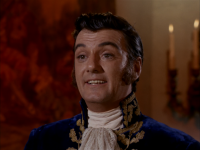
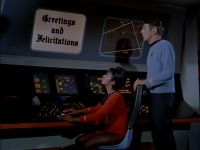
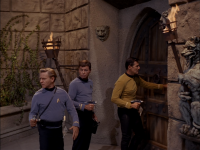
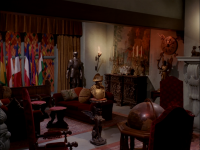
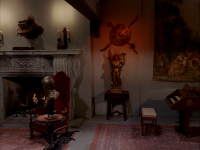
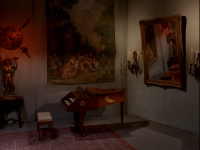
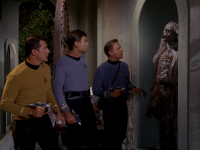
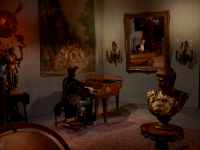
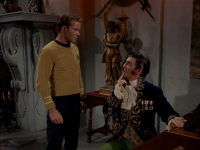
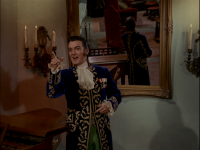

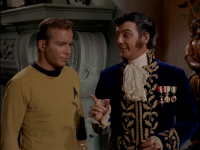
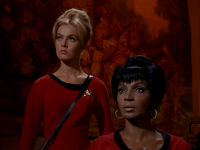
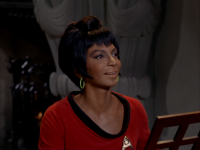
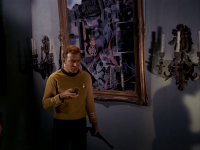
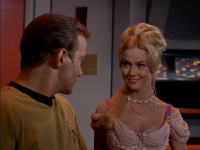
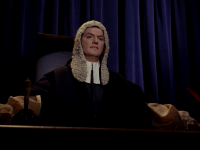
Star Trek TOS - 1x17 - The Squire of Gothos
Originally Aired: 1967-1-12
Synopsis:
A powerful entity known as Trelane torments the crew of the Enterprise. [Blu-ray] [DVD]
Filler Quotient:
2, filler, but an enjoyable episode nevertheless. You can skip this one, but you'd miss out on some fun.
- There's no essential plot or exposition in this episode that renders it unskippable, but it's a decently entertaining story nevertheless.
Problems
- The atmosphere is reported to be extremely hot and toxic with tornadoes raging and volcanos erupting everywhere. So they beam down with no protection other than breathing masks? Why not have full space suits? Or better yet take a shuttle?
- Given that Trelane's information about Earth is stated to be 900 years out of date, numerous details are flagrantly anachronistic including but not limited to references to Napoleon, references to Alexander Hamilton, dueling pistols, the spherical globe, the Rococo style painting and fireplace, the quality of Trelane's mirror, Trelane's too modern for the time period outfit, Trelane's collection of too modern European flags, the harpsichord, the yeoman's dress during the waltz, the waltz itself, and the 17th century dueling sword. At one point Trelane even quotes a play by Christopher Marlowe published in 1604: "Is this the face that launch'd a thousand ships and burnt the topless towers of Ilium?" (The play is Doctor Faustus.)
- Kirk speculates that the range of Trelane's power is probably limited to "the point [they] first entered [Trelane's] solar system." This is a common error. The term they were looking for is planetary system. The planetary system we live in is called the Solar System because our star is named Sol. As such, the term "Solar System" is a proper noun, not a generic term.
Factoids
- The Enterprise is said to be 900 light years from Earth in this episode.
- A stuffed trophy salt monster is featured in Trelane's manor. One of these creatures was originally featured as the primary antagonist in The Man Trap.
Remarkable Scenes
- Trelane making his entrance.
- Spock to Trelane: "I object to you. I object to intellect without discipline. I object to power without constructive purpose."
- Trelane magically giving Uhura the ability to play a harpsichord.
- Spock: "'Fascinating' is a word I use for the unexpected."
- Kirk firing on Trelane's machine rather than Trelane during the pistol duel.
- Kirk arguing with Trelane at his little court.
- Kirk convincing Trelane to be more "sporting."
- Trelane enjoying Kirk's game.
- The revelation that Trelane was just a child.
My Review
This simple but charming story is the first to turn a god-like antagonist into a compelling character, something this show has had difficulty doing in previous episodes. Indeed Trelane is both well acted and for the most part well written aside from a few technical goofs. Unlike previous god-like characters, the narrative of this particular story refuses to take Trelane too seriously, which is its greatest asset. Comparatively, Charlie from Charlie X and Gary Mitchell from Where No Man Has Gone Before were both painfully overwrought.
Much like Shore Leave, this episode proves that Star Trek is adept at doing humor. Unlike Shore Leave though, this episode didn't quite lose itself in whimsy which unfortunately ruins some of the fun. It's obvious from the very first moment that Trelane is up to no good despite his incessant smile, so none of the characters can take much delight in the period eccentricities. One of the most amusing moments of the episode is Uhura's silly joy at suddenly knowing how to play the harpsichord. The reason that small moment is so satisfying is because for whatever reason, Uhura allowed herself to enjoy that small detail in spite of the obvious danger she and her comrades were in. A very human moment.
However, most of the episode is comprised of the crew not trusting Trelane and trying to find a way to escape. In this sense the plot is somewhat slow and repetitive. A better episode would have featured more plot than Trelane toying with the crew and perhaps more substance than merely an immature god-like alien playing with humans like pets. These details are without a doubt fun but more texture and nuance would have enhanced the comedy and provided some actual opportunity for drama rather than leaving us with this slightly oversimplified goofiness. On the whole though the episode is well done goofiness, so at least there's that!
The following are comments submitted by my readers.
- From 411314 on 2009-06-15 at 2:08pm:
This the thrid episode broadcast where a villain assumes cruel power over everyone else (the first two being Charlie X and Where No Man Has Gone Before), but this one is much more interesting then the other two. Trelane is a great character who reminds me of Jay Gatsby from The Great Gatsby. The part where Trelane's parents scold him cracked me up, especially when one of them said something like "let [Kirk] go, or you will not be allowed to make any more planets". The way Trelane whined "aw, but I was WINNING, I would have WON", I woud've felt sorry for him if "winning" didn't mean murdering someone. I thought it was interesting how Kirk cleverly used Trelane's own phsychology against him ("it's not nearly sporting or exciting enough to just hang me, is it? Wouldn't you rather hunt me?") - From CAlexander on 2011-04-23 at 6:11pm:
Trelane is great. He does a wonderful job from the start trying to portray an immature god-like alien.
- As soon as Kirk and Sulu are abducted, Spock orders red alert and full reverse. Pretty quick reflexes. What ever happened to just sitting around dumbfounded :-)
- TOS didn't seem to be very clear on what the year was, or maybe it was just not spread around to all the writers. Trelane was clearly not imitating the 14th century in any way, rather the episode seems to think that Earth time is much later than the 23rd century.
- I like that Kirk tries two very reasonable approaches to defeating Trelane (destroying his machine and playing on his ego), either of which could have been successful in a different episode, but neither of which works here. It shows that Kirk doesn't have to be infallible to be a hero, just persistent.
- From Tooms on 2013-09-03 at 7:49am:
I'm not a fan of any episodes where characters have unexplained god-like powers. Especially when they are bratty kids.
I did enjoy the salt monster (from The Man Trap) being on display in Trelane's room. - From Scott Hearon on 2014-03-20 at 1:02am:
Just watched this episode for the first time. Not a bad one. It was just intriguing enough to keep me watching, though (like many episodes), it probably could have been streamlined into a better 30-minute tale.
The notion of beings who have mastered energy-matter transformation is an interesting one, though it's odd to hear the creatures talking like a bickering, petty family. Is it too much to ask that they be a tad more evolved in their demeanor and behavior?
Also, any story that uses a Deus ex Machina like this one automatically loses a few points in my book. Way too pat a conclusion.
I did enjoy Spock's confrontation with Trelane. His few lines about intellect and power are some of the more thoughtful ones in the series so far. - From Peter Collins on 2015-02-10 at 10:33pm:
I think this episode, despite flaws, benefits from great acting by Trelane, which makes him believable as a truculent kid trying to act grown up. I"m not sure the criticism of the time flaws holds water. First, if he knows earth only from a certain point in its history, it's not unreasonable for him to have picked bits and pieces from different times as he saw fit. As for the crew, isn't it fair enough to assume that they were unclear, without external help, what earth times specifically Trelane had based his role-playing on? Anyway, having just watched that one today, I rather enjoyed it.

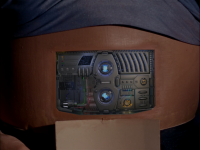
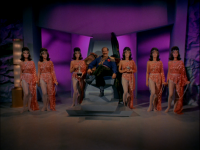
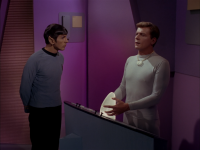
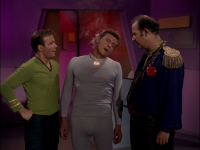
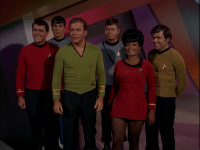
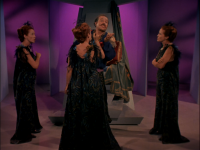
Star Trek TOS - 2x08 - I, Mudd
Originally Aired: 1967-11-3
Synopsis:
A takeover leads Kirk to his old nemesis, Harry Mudd. [Blu-ray] [DVD]
Filler Quotient:
3, bad filler, totally skippable.
- Technically Mudd will recur, but all episodes which feature him suck, so they can all be considered bad filler. On top of that there's a scene early in the episode in which Mudd's backstory has to be explained to Chekov, so it isn't necessary to watch Mudd's first episode to understand what's going on in this one.
Problems
- Harry Mudd had the entire crew of the Enterprise beamed down to the planet. How exactly did they get back up to the ship with no one up there to operate the transporter?
Factoids
- This episode establishes that the Federation has a patent system.
- Chekov makes a reference to Leningrad in this episode, but in 1991, many years after the episode aired, the name of the city was restored to St. Petersburg. Since Star Trek takes place in an alternative timeline which diverges presumably before the 1990s, it's conceivable that the city was never renamed back to St. Petersburg in Star Trek's timeline.
Remarkable Scenes
- Mudd revealed to be behind the androids' treachery.
- Mudd: "Knowledge, sir, should be free to all."
- Androids: "Why should we leave you?" Kirk: "Because we don't like you!"
- The various crewmembers being enticed into staying.
- The crew acting ridiculous to confuse the androids.
My Review
Once again we have androids trying to acquire power and once again Kirk talks a computer to death to resolve the plot. The badly acted androids offered little in the way of intrigue and the recurrence of the Harry Mudd character is most certainly not an asset to the story either. The ending was perhaps the most irresponsible one so far given that Kirk marooned Harry Mudd, a citizen of the Federation on an alien planet. This exposes Mudd to possible unknown dangers in the future, it prevents him from standing trial for his crimes, and also possibly even arms Mudd with an escape route if he can find a way to some day manipulate the androids. Moreover once again Kirk makes no effort to study or harness the android technology, preferring instead to act as though both the androids and Harry Mudd never existed. Then again given how terrible a story this was I think I could live with pretending these androids and Harry Mudd never existed too.
The following are comments submitted by my readers.
- From Simon on 2012-06-21 at 9:28am:
You missed a factoid: type K planets only support life on the surface in pressurized domes with life support systems - or words to that effect. - From Peter Collins on 2015-03-13 at 11:35am:
I think you're a bit harsh on this episode in that it's just a bit of fun, as TOS was prone to. Something that marks it as 'of its time' is the horribly sexist portrayal of Mudd's nagging wife. - From jd_juggler on 2015-03-23 at 12:56pm:
I disagree that this is a "skippable" episode. Roger C. Carmel was a funny guy, and his character actually had a personality, which is not necessarily a given among TOS villains. As for the problem of getting back on board the enterprise, remember that after Norman et al. were defeated, the androids were reprogrammed, and presumably that included the androids that were aboard the enterprise.
Here are a couple of problems, though. McCoy and Scotty were both amazed and delighted at the level of medical and engineering technology (respectively), but there was no mention that they took any of the technology with them. Uhura pretended to be sold on the idea of an android body, but wouldn't it have been a good idea to have one created and standing by (not yet activated) and ready to be "moved into" when your natural life is nearly over? This is assuming, of course, that androids aren't going to turn out like Roger Korby, but since they were made with a different (and presumably superior) technology, that shouldn't have been a deal breaker.
It also amuses me that these androids apparently can serve as sexual surrogates, no doubt with great skill. Having a few of those around would be handy. - From Chris Long on 2018-05-29 at 5:20pm:
This episode could have been a lot better than it was.
I did not find it funny in the least, even as a child when it first aired...
Looking at it recently, couldn't they have found better looking women androids than the ones they Harry with? Yeesh!

Star Trek TNG - 2x15 - Pen Pals
Originally Aired: 1989-5-1
Synopsis:
Data fights for a friend's life. [DVD]
Problems
None
Factoids
None
Remarkable Scenes
- The debate about the Prime Directive.
- Wesley standing up for himself and taking charge of his team.
- Riker: "O'Brien, take a nap. You didn't see any of this. You're not involved." O'Brien: "Right sir. I''ll just be standing over here dozing off."
- Data returning to the ship with the girl.
- Picard's initial reaction to Data bringing the girl to the bridge.
- The Enterprise correcting the tectonic problems on the girl's planet.
- Pulaski wiping the girl's memory.
My Review
This episode is pleasant in both a routine and unusual way. On one hand, it's nice to see a bit of maturation in Wesley by watching him lead a relatively insignificant team on a fairly unremarkable mission. On the other hand, the debate about the Prime Directive and eventual betrayal of it that Data unleashes is fascinating. Even moreso is the conscious hypocrisy of the main cast concerning the Prime Directive. As has been done before, this episode is further acknowledgment that the Prime Directive is routinely reevaluated on a case to case basis by Starfleet captains. This episode also raises an interesting question. Did Picard cover up the events of this episode and not reveal anything that happened to Starfleet? One thing that leads me to wonder this is Riker telling O'Brien to keep quiet about it. I wonder if the whole ship is hush hushed too.
The following are comments submitted by my readers.
- From DSOmo on 2007-06-27 at 9:33am:
- Why did Data even start this whole episode with the little girl? Data is an android. He is not swayed by emotions.
- Picard orders Data to sever the contact with Drema IV. Data responds to Picard's order by piping the transmission from Sarjenka into the captain's quarters! This is NOT severing contact. This is a willful violation of a direct order.
- Picard states that the Prime Directive is "to protect us - to prevent us from allowing our emotions to overwhelm our judgment." And then Picard does a 180-degree turn and decides to help Drema IV. Why? Because he heard Sarjenka's plea for help - precisely the type of action the Prime Directive was designed to prevent. In "Encounter At Farpoint," the Bandi city gets blown to bits while the leader screams for help and Picard calmly discusses his options. In "Symbiosis," the drug-addicted Onarans beg Picard to help them. He refuses because of the Prime Directive. Maybe the leader of the Bandi should have had one of the children call for help. If the Onarans had brought out one of their little girls - writhing in the pains of withdrawal - would that have caused Picard to change his mind?
- When Data takes Sarjenka back home, he places a singer stone in her hand. Data leaves tangible evidence of the Enterprise's presence.
- Did Data produce the stone with a replicator? It looks identical to the one in Dr. Pulaski's office. She agreed that erasing the girl's memory was the wisest course of action. She would not have agred to provide evidence of their involvement. If the stone was not replicated, it was stolen.
- The house on Drema IV is very interesting. It has a door that can evaporate on command. The door represents a very sophisticated technology, a scientific advancement not reflected in the rest of the home. - From CAlexander on 2011-04-05 at 3:24pm:
A terrible episode, everyone is out of character. First, the basis of the episode is supposed to be Data's connection with the little girl, which we never see. Not to mention that it is clearly inappropriate behavior on his part to have a secret conversation with an unknown species for several weeks using the ship's equipment, and we never know why he does it. Then Picard sets up the Prime Directive as an impossibly unyielding strawman, claiming that they can't intervene to save a civilization from destruction, it has to be left to its own fate. They've never had this mystic view of fate before, the Prime Directive was to avoid screwing up the population's natural development. There won't be any development if the planet explodes! Then Data demonstrates that he has developed an emotional attachment to the little girl. What? Then, for the rest of the episode, Picard becomes a spineless jellyfish who gives in to every demand from Data because they have to save the little girl. This, on the other hand, is exactly what the Prime Directive was meant to avoid! Picard becomes a huge hypocrite – it is OK for millions to suffer for the Prime Directive, but if one of them is a cute little girl, apparently that is totally different. It is as though the writer doesn't care about the characters and just wants to write a little morality play, though what the moral actually is I'm not certain.
Wesley's plot is OK but not stimulating television.
- From Bernard on 2011-04-05 at 10:44pm:
I find it interesting that CAlexander brings up the point about the Prime Directive. At this point in the evolution of the Star Trek universe the way that starship captains interpret the Prime Directive seems to be seen as flexible. So in this situation where people will die if they do not interfere then Picard breaks the Prime Directive. He breaks it many times in fact.
Take the actions of Captain Archer in the episode Dear Doctor (I think it's Dear Doctor) where they condemn an entire population through inaction. Captain Archer who, incidentally, baulks later on in the series when the Organians show up and intend to do the exact same thing to him and his crew, i.e. they don't want to interfere with lesser species.
What I'm trying to say is that through the years of writing Trek the creators/writers seemed to decide to turn the Prime Directive into something that it was not supposed to be. Perhaps this episode was the start.
I agree that it is an abominable episode by the way and cannot believe that our webmaster has rated it so highly! - From Alex on 2020-02-20 at 1:38pm:
I absolutely cannot call this episode dreadful. It may be a less stimulating episode but I feel that it belongs in the "skeleton" that composes the whole body of the series.
I also feel there's a rather obvious difference between this case of violating the PD and when they didn't do it with either the Ornarans or the Bandi. Both "Symbiosis" and "Encounter..." dealth with already space-faring races. In both cases it was not a force-of-nature scenario that would lead to tragedy. In both cases there *was* an option that ultimately would resolve it. This time there was no undercover plot. The species would go extinct because planetary mechanics.
Regarding the comments here: How is anybody "out of character"? They're absolutely IN their character when they debate the PD. Worf says that rules are rules and must be obeyed without second thought. Pulaski of course sees the humanitarian angle. Picard himself isn't a robot, he doesn't like condemning a species by inaction, and it was so often that he prefers compromise, this ended up being exactly that. And "Data lacks emotions so why did he bother" simply sounds like not understanding his character, at all. Data doesn't fully understand emotions, but he can think and decide what is right or wrong. This wasn't ever an issue of him being unresponsive to moving situations!
The most "out of character" bit for me was when they theoretically discussed the "cosmic plan" and how it can be factored it. That sounded maybe a little bit unscientific and it was unusual to see several characters at once discussing it like that.
Overall I agree with Kethinov that the episode is "routinely pleasant". I'd rate it a 6.
P. S. Oh one last thing. When Data transports into Sarjenka's house, you can see in the background an endtable-height thingo that is very much shaped like a goat head! So intriguing to find on an otherwise alien planet! - From Azalea Jane on 2021-07-20 at 3:15am:
I heard it pointed out somewhere that the Prime Directive could be seen as a certain kind of apologetics for colonialism. Picard often stresses: "history has shown that any time a more advanced civilization comes in contact with a less advanced civilization, despite the best of intentions, the results are disastrous."
Are they, though? Necessarily? Always? This attitude posits that the atrocities committed by, say, European colonists to the natives of the American continents were cosmically inevitable once they made contact, rather than a product of human ignorance and greed of the time. This, in a way, absolves colonizers of culpability and acts like it's not possible under any circumstances for a "more advanced" civilization to benevolently interact with less advanced societies. (At least to the point of warp, I guess.)
It's a perspective I'm still mulling over. But either way, I think this episode highlights the failures of the Prime Directive. Picard even said it in "Justice": "There can be no justice so long as laws are absolute."
An absolutist approach may seem simplest, but it is not always workable. Failure to prevent harm when you are able to, to me, is ethically questionable. Hiding behind some abstract principle (based on dubious assumptions) doesn't magically change the reality of the harm that is poised to come to these people. I think Picard's faith in the PD is one of his character flaws. For a man of such thoughtfulness and depth, he can also be quite rigid.
CAlexander points it out well: the PD is intended to avoid messing with a society's natural development. But unless the Enterprise intervenes, there won't _be_ any development, for reasons outside the society's control!
It almost feels like an attempt on Picard's part to _feel_ like he's "doing the right" thing by doing nothing. It's a nice reminder that our shining Federation is not necessarily the arbiter of good in the universe.
Data emotionspotting: He's clearly attached to Sarjenka. And when Picard orders him to sever contact, he instead plays a recording -- thereby attempting to appeal to human emotions. It shows an understanding of emotions that enables him to manipulate everyone. And it works! Everyone sees his blatant appeal to emotion and yet it still works! (Also: "Sir, I feel it important...")
In a comment above, DSOmo says "Data is an android. He is not swayed by emotions." This is a little simplistic and misses the point. Data displaying signs of emotion or attachment is not a writing error. It's part of his character. It may be written a little inconsistently, but Data clearly has _some_ rudimentary emotions, even if he doesn't report experiencing them as such. Indeed, you can't completely separate logic from emotion anyway. Logic is a human construct, and human intelligence is a thin veneer over our core of instinct and emotion. At this level of technological ability, one couldn't design an android trying to be human without it showing something that reads as emotion to other emotional beings.
I think it's a very Trek-esque plot point that it is the supposedly "emotionless" (though not really) artificial being that has to remind everyone else of their humanity (humanoid-ity?).
Little peeve: the Enterprise fixing the planet. This is one of many episodes where a process that should take weeks, months, or years takes seconds. Imagine one starship having _that_ kind of immediate power over a planet! Another hasty Trek ending.
Pulaski: "My emotions are involved. Data's friend is going to die. That means something."
Worf: "To Data."
Pulaski: "Does that invalidate the emotion?"
Pulaski admitting Data's ability to have friends???? Wow. Nice character development!

Star Trek TNG - 7x10 - Inheritance
Originally Aired: 1993-11-22
Synopsis:
Data meets a woman who claims to be his mother. [DVD]
Problems
- Geordi can see clear differences between humans and Androids as evidenced by TNG: Heart of Glory. Geordi should have instantly recognized Juliana was an android.
Factoids
- This episode establishes that there were 3 more androids before Lore, one of which is featured in Star Trek X: Nemesis.
Remarkable Scenes
- Data describing Lal to Juliana. Good continuity there.
- I like the music scenes in this episode.
- Seeing Juliana an android.
- Data describing the reasons he suspected Juliana was an android before.
My Review
This is one of the better "Data's past" episodes. Juliana was essentially the perfect android Soong set out to create, despite the ironic circumstances surrounding her creation. She fooled everybody, even herself. But the episode is severely lacking in overall plot. It's nice to get info about Data's past, but it literally dominated this episode. In the end it feels like a big stretched out waste of time, even if a nicely done one.
The following are comments submitted by my readers.
- From Orion Pimpdaddy on 2006-06-18 at 1:43am:
Season 7 seems to concentrate on fully developing the background of the TNG crew. Inheritance accomplishes by filling in more detailed information about his past.
But that is all this episode is, a chronicle of Data. It is only average when compared to the other Data episodes. I give it a 5. - From Orion Pimpdaddy on 2006-06-18 at 1:46am:
Problem:
How can Juliana live her whole life without knowing she was an android? You would think she would set off metal detectors, get an X-ray done, or accidentally open up the maintenance hatch that is on her head.
- From Paul on 2010-08-17 at 9:16pm:
Geordi would be unable to detect her as an android since she was designed to give off human vital signs etc. - From John on 2011-02-05 at 5:02pm:
This episode is ok, though to be honest I've found myself skipping it when re-watching the series. I enjoyed when I saw it for the first time but, like others have said, it really doesn't have much of a plot.
It fits into a sort of sub-category of trek episodes that I find generally annoying: the "charming woman with a secret" episodes. Typically these episodes feature a talented guest actress as a woman who charms one or more of the crew, but who has some hidden agenda or other secret thing about them which eventually becomes the focus of the plot. In many cases, this gets old quick. In the case where the audience actually likes the mystery woman it's just as bad, because they are never referred to again.
I give this one a 4 myself, because it's nothing new, and not all that interesting either. - From Robert Koenn on 2011-07-05 at 6:59pm:
I rated this episode a 5. I found it quite interesting and definitely a good Data episode. The story was fairly well done although there are always those plot lines that are written to carry the story as ridiculous as always. Whenever there is something questionable happening or to explain there is either a well it happened this way or a new technology is involved, not something logical. However my biggest gripe is that it would be ridiculous to think an android, no matter how advanced, would not realize it wasn't flesh and blood. That is totally absurd. It never got sick, it never cut itself, it never figured out that the food it ate was not normally processed as a biological being would be, and on and on. Soong could simply not have made everything so human that a thinking machine would not determine it was a machine. - From Mike Chambers on 2021-10-16 at 4:25am:
I love how the holographic Dr. Soong tells Data that he designed the android Juliana to shut down in the event that she learns she's an android, yet in the next scene, they are discussing whether or not Data should tell her and this fact is never even mentioned. It seems like an important consideration?

Star Trek TNG - 7x19 - Genesis
Originally Aired: 1994-3-21
Synopsis:
The crew de-evolves into prehistoric beings. [DVD]
Problems
- Much of the science in this episode makes little to no sense. Why would a cat de-evolve into an iguana? Or a human (Barclay) into a spider?
Factoids
- According to Data, there are 12 male cats on board that could have impregnated Spot.
- This episode was directed by Gates McFadden (Dr. Crusher). She did a surperb job; though this is the only episode they let her direct!
Remarkable Scenes
- Ogawa pulling cactus thorns out of Riker.
- Barclay's self-diagnosis.
- Worf's "enhanced guidance system" glitching.
- Data describing to Barclay injuries to the crew Spot has inflicted on her previous babysitters.
- Worf and Troi's odd behaviors near one another.
- Barclay with lots of energy.
- Worf's attack on Troi.
- Worf venom attacking Beverly.
- Amphibious Troi.
- Neanderthal Riker.
- Spider Barclay.
- Picard and Data duplicating Troi's pheromones and Picard luring him away from Data.
- Primal Worf.
My Review
This is an extremely entertaining episode. It's a shame the science behind it is a bit questionable. Then again, much of the science of this episode isn't questionable. Data's cure is very innovative. The idea to create a cure based on the natural defenses of a pregnant woman is certainly original. The episode has such a fast and fun pace that by the time it's over, you wonder where the rest of it is. This is a controversial episode because of the bad science involved, but in my opinion the bad science is pretty minimal; compare it to something like Voy: Threshold, or TOS: The Alternative Factor, then you might agree with me that the technical issues of this episode are largely minor. That said, I very much enjoyed this one.
The following are comments submitted by my readers.
- From Orion Pimpdaddy on 2006-06-28 at 4:39pm:
Whether you believe in evolution or not, you'll probably agree that the science in this episode is really bad. This is so in the initial transformations, where cats turn to lizards and humans turn to spiders, but also in the part where everyone returns to normal. How can a brain, like Riker's, shrink in size and then return to its original size while keeping all of the original memories intact? I also question how half the crew did not end up dying from the wild animals running around. Perhaps it was because they were all huddled together in certain areas of the ships, as Data specifies, but I have to believe that a large number still would have died.
If you can get past the bad science of the episode, you may find the rest entertaining enough to watch, deserving of a 5. - From JRPoole on 2008-11-03 at 3:15pm:
Usually episodes that feature truly bad science annoy me to no end, but I'm willing to let it go with this one simple because it's so much fun.
As the person above noted, the science isn't all that bad with some suspension of disbelief. If we all evolved from a common ancestor in the form of a unicellular organism, you can posit that there are reptilian and even insect DNA fragments lying domant in our genetic codes. Human embryos have gills and tails, for instance. Sure it's a stretch, but the visual effects and makeup were all done well and it's great fun if you don't take it too seriously.
What I do have a problem with is the idea noted above about everyone returning to normal. It's ridiculous to think that the structual properties of the new bodies and the memories encoded in the now physically changed brains would remain intact. Still, I enjoyed this one throroughly. I'd probably hide this episode if I was introducing someone to TNG, as it is pretty goofy, but it's action-packed and entertaining, so I gave it a 5. They can't all be classics, and all I ask of filler episodes is to be entertaining, and this one definitely delivers.
- From SS on 2009-01-17 at 3:49am:
The science could have been a lot worse. "Introns" really are sections of the genome that do not code for anything and certain sections have indeed been identified as leftovers of our evolutionary past.
Mammals evolved from reptiles, which evolved from amphibians, so Troi's change works. Ogawa made a good australopithecine, and Riker made a good erectine (although Data identified him as australopithecine, he was much too large to be anything other than Homo). The spider is much harder to justify, as arachnids are not part of humans' evolutionary past, but it made for a good scare.
There are obviously some major problems that others have identified, but it's all in good fun. This isn't one of my favorite episodes, but for season 7 it's well above average. - From Albert on 2009-07-08 at 7:53pm:
Another rare bad episode in my opinion, I agree with another reviewer that it's mainly the bad science that makes it insulting. Sorry to repeat another comment almost word-for-word, but Riker's brain shrinking seems like it would do permanent damage. Unless they are trying to say something unkind about Riker in this episode.
Every crew member surely would have suffered permanent brain damage and physical deformities from this illness.
The primordial version of Worf is the best part of this episode, it makes me wonder if in a first draft he was to be the only on affected, and started to hunt through the ship like the alien in Alien. I would have liked a version like this better. - From Keith on 2013-02-03 at 3:54am:
Continuity Error
Troi is in Sick Bay after Worf's attack, then in her quarters when Picard and Data reenter the ship, then back in sSick Bay when Worf is intent on mating with her. Surely Picard and Data did not bring her back to Sick Bay. - From TheAnt on 2013-11-05 at 3:38pm:
Biology violated
This is one questionable episode indeed, but it made in a way that almost make me think that the authors of the script told themselves that 'We've violated physics so many times, and the internal ideas of Star Trek, so we better violate Biology bigtime now in the last part of the series as well."
When I did see the episode the first time, U initially thought it were some sort of anti-genetic engineering propaganda piece. But the solution which indeed utilized genetic engineering contradicted that idea.
(So that was one idea I got when still watching this.)
SS is indeed correct about the introns, but those loose segments left over from our earlier stages of evolution would not combine to make other complete organisms.
Even so with the extremely bad science the story might still have been able to fly, if they had made a few details more believable.
Sadly that's not the case, and with one completely deflating ending, that the shot Crusher gave Backlay had started all this. I can only give this episode a weak 4, and those points given only for the horror action elements and SFX such as Barclay as a spider and Neanderthal Riker.
- From Axel on 2015-03-07 at 3:45am:
The science problems don't really bother me as much as some people. If someone watches this episode and thinks, "Wow, I had no idea humans evolved from spiders!" I think that speaks more to the failure of public education than it does Star Trek's handling of evolutionary biology. Besides, most of the transformations are believable, such as Riker, Ogawa and Picard himself. And as mentioned before, it's not as if Star Trek hasn't sometimes fumbled other scientific concepts.
The acting is what I enjoyed most about this episode. It gave the cast a chance to try some new things, and for the most part I think it was very entertaining. Dorn's performance was a lot of fun; Frakes did a great job playing the smaller-brained devolving hominid; and Schultz got to play Barclay on steroids, which was pretty enjoyable.
As opposed to DS9 with its story arcs, TNG's 7th season feels like it was just wrapping things up as it went along while also pushing the sci-fi envelope a bit. Some of it worked, some of it didn't. This episode wasn't memorable, but it was fun enough. I'd give it a 6.

Originally Aired: 1995-2-6
Synopsis:
An alien race harvests Neelix's lungs. [DVD]
Problems
None
Factoids
- This episode is the first to feature the Vidiians.
Remarkable Scenes
- Neelix having taken over Janeway's private dining room and turning it into a galley.
- Neelix attacked by the Vidiian.
- The Doctor coming up with the idea of holographic lungs for Neelix.
- The Doctor demonstrating how real holograms can be by slapping Paris. :)
- The Doctor: "I'm a doctor, Mr. Neelix, not a decorator." Count 10 for "I'm a doctor, not a (blah)" style lines, which McCoy was famous for.
- Tuvok: "Captain, may I suggest you consider carefully what you are about to do?" Janeway: "How do you know what I'm about to do?" Tuvok: "I could describe to you in detail the psychological observations I've made about you over the past four years which lead me to conclude you're about to take this ship inside the asteroid. But suffice it to say, I know you quite well." Janeway: "One of these days I'm gonna surprise you Tuvok. But not today."
- Tuvok's phaser locator beam trick.
- The Vidiians insulting the Doctor's "primitive" medical knowledge.
My Review
The first Vidiian episode is certainly interesting. It's easy to develop a certain sympathy for them; it's not their fault what's happening to them, and what else are they supposed to do to survive? This makes the episode far more serious than the similar one TOS: Spock's Brain, and much more enjoyable. Janeway's evaluation of her moral options regarding the Vidiians was quite correct and very well executed. And I like how the Vidiians were willing to help, to try and demonstrate in some small way their good faith. A pleasing episode.
The following are comments submitted by my readers.
- From Fenix on 2011-03-25 at 3:00pm:
I'm a bit confused as to why an external donation was needed. Why didn't the Vidiian simply give Neelix one of his own lungs back? - From Rick on 2013-03-19 at 2:32am:
I think the ethics of this episode are completely wrong. If it was Kirk, it wouldve been off with his head immediately, as it shouldve been. - From Inga on 2013-07-14 at 8:02pm:
Kirk wouldn't murder anyone. He valued life just like any other Star trek captain and it's one of the things I like the most about the franchise. - From Rick on 2013-10-09 at 8:12pm:
Not murder. Punishment for attempted murder. And if not that, then stick them on an abandoned planet like Kahn. Point is, no way Kirk would let a murderer go.
What if they let them go and just before they leave they grab a phaser and kill a crewman. What them, still send them on their merry way? How many times to they have to try to commit murder before you stop letting them go? For me, 1.

Star Trek DS9 - 3x23 - Family Business
Originally Aired: 1995-5-15
Synopsis:
Quark returns to his home planet to confront his mother, who has broken the Ferengi law prohibiting females from earning a profit. [DVD]
Filler Quotient:
0, not filler, do not skip this episode.
- Numerous major long term plot threads are serviced here.
Problems
None
Factoids
- This is the first episode to show us the Ferengi home world.
Remarkable Scenes
- Kira: "You know at the rate we go through Runabouts, it's a good thing the Earth has so many rivers."
- Dax to Sisko regarding Yates: "Let me put it this way. If I were Curzon, I'd have stolen her from you by now."
- Quark and Brunt's reaction a dressed Ishka.
- Bashir and O'Brien breaking into Quark's with Odo not particularly caring.
- Sisko's first meeting with Yates.
- Quark discovering the full extent of his mother's activities.
- Rom yelling and Quark and Ishka.
- Sisko and Yates discussing her brother's baseball activities.
- Rom and Ishka discussing how she hid the bulk of her profits from both the FCA and Quark.
- Morn Appearances; 1. At Quark's bar when Quark and Rom argue about Nog joining Starfleet.
My Review
Good continuity with the last episode, Jake is still trying to set Sisko up with this freighter captain Kassidy Yates. Jake is wise beyond his years, the match was made in heaven. She even likes baseball. :) I'm extremely fond of the Ferengi plot in this episode. The way Ferengi treat women in this episode is hilarious! A very successful satire, I must say. This episode is a fine example of how DS9 took the silly TNG Ferengi and molded them into one of the most loved species of all of Star Trek. This episode is just articulate in every way while maintaining a certain level of humor too. Very nice.
The following are comments submitted by my readers.
- From rpeh on 2010-07-29 at 9:08pm:
Decent episode, but one problem. When Quark is blocking his ears, his skull visibly compresses. I don't recall any information about Ferengi skulls being made of rubber... Apart from that it's a good episode for background on the Ferengi. - From Lt. Fitz on 2012-06-26 at 1:40am:
Best line: Rom about his father, "He couldn't hold on to latinum if you sewed it into his pants!"
I liked this one. - From Azalea Jane on 2021-12-17 at 9:23am:
This episode, if any so far, puts the lie to Quark's protestations that the Ferengi have never practiced slavery. How their society treats women is, no two ways about it, abject slavery and utter degradation. It's completely inexcusable, given the glaringly obvious evidence from both Ishka and Pel that Ferengi women are just as capable as men -- and in many cases, more so. I know it's portrayed in the show as backward and wrong, but it's still kinda hard to watch. It might be funny if it didn't resemble the way many women are still treated right now in the real world. I try not to judge individual Ferengi characters too harshly -- after all, the sexism is systemic and deeply conditioned.
From a practical economic perspective, these male-dominated races like the Ferengi, Jem'Hadar, Pakleds, etc. are unfortunate, simply by the fact that they end up employing way more male actors. Give us a recurring race of women, already! (Like the Gems in Steven Universe. It is doable, has been done, and is very refreshing!)
I do have to hand it to the DS9 writers for developing the Ferengi, though, after the joke they were on TNG. As problematic as they are in-universe, they've certainly become much more multi-dimensional since they were first introduced. A fine salvage operation.
OK, I changed my mind on one point. The way the men look utterly scandalized when they see a woman NOT naked -- that's fucking hilarious. My dudes, get over yourselves.

The following are comments submitted by my readers.
I really enjoyed this episode and seeing the reaction of a character from when this was made seeing the future as presented in Star Trek. The slingshot effect didn't bother me at all. Obviously, Star Trek takes place in a fictional world where the rules are different from what they are in the real world.
Also one of my all-time favourite episodes. The dialogue was excellent, the acting on a par to the dialogue. I really think this is one of Shatner's best episodes.
The slingshot effect is probably very daft (so is the whole time-travel thing; they managed to drop their visitors off at the exact moment after they had taken them?), but then so are most of the premises of Star Trek or any other Sci-Fi show. (Ever seen Doctor Who? Now there's suspension of disbelief for you.)
This is one of my favorites, too. I liked that Captain Christopher was strong and not easily intimidated, and that he both gave respect and earned the respect of the Enterprise's officers. I could really see him becoming a starship captain if he'd been born at the right time. When Spock stopped him from holding them hostage at the end of the episode, I got the sense Spock knew what to do because he knew Jim so well, and Captain Christopher was the same kind of man.
As far as time travel goes...if this happened to me and my crew, it would never make it into my log. I wouldn't want Starfleet or the Federation to have that information.
TOMORROW IS YESTERDAY
Ridiculous time-travel problems, but if you can swallow them, this can be a fun episode to watch. Ok, let's go!
>----o----<
Near the end of the episode they're heading for the Sun. What do we see on the screen? Stars whizzing by and no Sun. Where is the Sun? They're heading straight for it and it's not on the screen! What are all these "stars" moving by doing in the Solar System? At times the ship doesn't look like it's moving at all.
>----o----<
There's another problem with the scene with the Moon in the background: Not only can you see stars through its dark side, the moon, as rendered, is WAY TOO BIG! It wouldn't look any bigger from low-Earth orbit than it does from the ground. Still yet again, the remastered effects make things LESS realistic.
>----o----<
Yeah, the time-travel paradoxes are a nightmare. My additional question: How can you change a future that already happened? Does this question even make any sense? If it does, then they can't screw things up; otherwise, the Enterprise and its crew wouldn't already be as they are/were in the 23rd century in order to go back to the 1960's to be as they are/were then to mess things up in a way that makes everything happen as it did the "first time", as there is no "second time". Got it?
And what about the butterfly effect? Well, it turns out that it is irrelevant.
OK, analysis: There is a time interval in which there are four Enterprises at the same time. One is the one that first went back in time. The second is the Enterprise going forward again, splitting off from the first. If those on the second Enterprise could see their counterparts on the first one, they'd see them going backwards, and vice versa. The third Enterprise is going back in time as it heads toward and then away from the Sun. The fourth is the ship going forward in time again, back to the 23rd century. Again, each crew would see the other going backwards. And, as I mentioned in my review of "The Naked Time", there will be two overlapping enterprises near each turnaround point. Sorry my diagram didn't make it over intact in that review. Think of it this way: You're in one place at 2:00 going backward in time. At 1:00 you switch to going forward in time and at 2:00 your in another place. So at 2:00 you're in two places at the same time, going backwards in one, and forwards in the other. At 1:00 your two places are overlapping and begin to separate. So from the viewpoint of an outside observer, you suddenly appear as two overlapping ships that separate, with one crew going forwards and the other going backwards. Cool, huh?
Things like this are what you'd have to accept in order to believe in time travel, unless you make a discontinuous jump in time, in which case you can avoid this overlap paradox.
As for Captain Christopher: If Spock and crew got the timing just right, Christopher was being beamed out of the plane by the Enterprise going forward in time the first time at the same time that the Enterprise going forward in time for the second time beams him back in. And that time one beaming him back is going faster than warp 8 while beaming him back! If Spock's timing is off, there will be a time interval with either no one in the plane, or two overlapping pilots in the plane. Yuck! Now the hardest part. Does the plane break up, or return to base? Both possibilities are going forward in time. The episode has him doing the latter, but I think in fact it would be the former, with our new Christopher ejecting or dying in a crash. Why? At this point there are four Enterprises. And one of them destroys the plane with a tractor beam. None of the other three can do anything to prevent that, so the show is inconsistent. And he would later appear out of nowhere to snoop around the base with Kirk and Sulu. Sometime after that he'd be beamed up and never appear on Earth again! But that's not how it happened on the show. We have the same problem for the sergeant encountering Kirk and Sulu, but this has the same contradiction problem. So according to the episode, all this trickery somehow wiped out the version with the plane breaking up and the sergeant finding Kirk and Sulu looking for films. Sorry, that doesn't fly. It's a total mess. Well, I almost got it to work.
So what would this look like to an outside observer? This is basically what I said above, but in chronological order. She'd first see the Enterprise, with our "stowaways" on board, pop out of nowhere. It would immediately turn into two overlapping ships and would begin to separate. (This violates conservation of energy, energy in the form of mass, i.e.) The overlapping ships then continue to separate with one heading for the Sun, with its crew doing everything backwards, and the other heading for Earth, doing everything forwards. Both have Christopher and the sergeant on board. Both Enterprises then pass near each other by Earth. One transports Christopher from the plane to the ship. The other from the ship to the plane. Note that the Enterprise coming from near the Sun is traveling at over warp 8 while they beam the stowaways back to Earth! The outside observer would then see another pair of Enterprises pop out of thin air and separate. One would be in orbit with the crew going forwards. This one would beam Christopher and the sergant up to the ship. It would later head for the Sun. The other would head for the black star with its crew going backwards. So we find that at two points, one Enterprise would beam people up from Earth, and another would beam them back down. Then the unavoidable contradiction.
AEF, a.k.a. betaneptune
Not a very good episode, for all of the reasons that Kethinov points out. Time travel is always a tricky one, and unless handled very deftly, a ruinous one. Some people don't mind the paradoxes, contradictions, and willful ignorance of writers towards the ramifications of time travel. I, however, am often greatly bothered by sloppy time travel stories. This was one of them.
I found Kirk's attitude in this episode pretty annoying, too. Partially due to the script and partially due to Shatner being Shatner, the smarmy, self-satisfied demeanor was a nuisance. His sarcasm and condescension towards the Air Force officers, who were only doing their jobs, seems far beneath one of Kirk's station.
If had been watching this episode back in 1966, I probably would have been pretty disappointed. Much of the story takes place on "modern" Earth, which is not what I'm watching a science fiction show for. Add in the fact that the "science" in the fiction is weak, and it's not a very strong entry into the canon.
TOMORROW IS YESTERDAY - My 2nd post
Correction to my first post:
I got the time-order of events as seen by an outside observer not quite right, or at least not clear enough! I will correct it here. (Recall that we get multiple ships as follows: Say at 1:00 you're going forward in time. At 2:00 you start going backward in time. So at 1:00 you're going backward in time. And now your ship is in two places at the same time!)
There are basically as many as five ships from the viewpoint of an outside observer present at a single time. As viewed by our heroes, there is one ship on one trip, but divided into five parts in time. I drew myself a space-time diagram to figure this all out, but unfortunately I am unable to post it here. I'm forced then to leave this as exercise for the reader: Draw 7 parallel horizontal lines on a sheet of paper (landscape mode). Label them t0 at the bottom through t6 at the top. Draw a vertical line on the left (leave a little room for ship A). That will be the black star. Draw a vertical line down the middle to represent Earth, and one on the right to represent the Sun. Draw the path through space-time based on my description below.
A - going forward in time, from before any of this happened, to the encounter with the black star, t0 -> t6.
B - going backward, from the black star to earth, t6 -> t2
C - going forward, from earth until zooming toward the sun, t2 -> t5
D - going backward, as they zoom to, and then away from, the sun, t5 -> t1
E - going forward, passing Earth for the beam-backs at t3 and t4, as they return to their own period, t1 -> t6 and forward.
An outside observer would see A through E as five distinct ships. Here's the timeline. Each t<n> is a point in time:
t0 - Just one Enterprise, zooming along before any of this happened.
t1 - Ships D and E appear out of nowhere at the same place -- yes, overlapping -- and then separate. Inside D, from t1 to t5, things are going backwards. This is the second turnaround from going backward in time to forward in time as seen by our heroes. Ship A is also present.
t2 - Ships B and C appear out of nowhere at the same place and then separate. Inside B, from t2 to t6, things are going backwards. This is the first turnaround from going backward in time to forward in time as seen by our heroes. Ships A, D, and E are still present. There are now five ships existing at the same time!
t3 - Ship C beams up the pilot, while at the same time ship E beams him back to the fighter jet. Ships A, B, and D are still present. Shortly thereafter, the fighter jet breaks up.
t4 - Ship C beams up the sergeant, while at the same time ship E beams him back to the base. Ships A, B, and D are still present.
t5 - Ships C and D merge together and disappear. Ships A, B, and E are still present. This is the second turnaround from going forward to backward in time as seen by our heroes.
t6 - Ships A and B merge together and disappear. This is the first turnaround from going forward to backward in time as seen by our heroes. Ship E continues to the next episode.
At some unknown time between t1 and t5, ship D reaches its closest point to the sun, and then reverses to move away from the sun.
Kirk and Sulu are on the base at some time period between t4 and t5.
From t2 through t5 there are five ships present!
There are then two problems: (1) the sergeant would remember what happened when he was on the Enterprise, and (2) at time t3, ship C destroys the fighter jet, while ships A and E do nothing to put it back together. Too bad for Captain Christopher!
But if we follow what Kirk says, from Christopher's viewpoint, what happened from the time when he was beamed up to the time when he was beamed back, somehow "never happened". And similarly for the sergeant. This is quite problematic for what the outside observer sees!
Yes, this is what you get when you work it out. And having multiple Enterprises popping out of thin air, so to speak, and disappearing, violates conservation of energy (energy in the form of mass), which is one of, if not the, most firmly established laws of physics.
>----o----<
Some new comments:
Spock complains about "poor photography" (funny!) while he's smearing up the film with his hands!
Capt. Christopher is credited as _Major_ Christopher in the ending credits.
Can you imagine what it would be like to be transported by surprise, and not having watched Star Trek? I think Capt. Christopher was surprisingly rather underwhelmed by it. I mean, really. He was flying a fighter jet, then suddenly he's standing in the transporter, and his first words are, "You speak English." Only later does he start asking the obvious questions and such. He then adjusts to the situation rather quickly. The sergeant's reaction seemed like a much more likely and believable one to me -- well, perhaps a little too overwhelmed.
"Now the experts can figure out who you are, what you are."
"I'll have it disassembled and examined. We are not dummies, mister. We know how to find out things we want to know."
Who are these experts, and how can they be this good?
>----o----<
To Kethinov, who asked, "What was with that whole transporter merging memory wiping thing anyway? . . ."
Yes, the beam-merging makes no sense. But it's not just that. They have to wipe out the part where Christopher's jet is destroyed. I don't see how the beam-merging is supposed to fix that. It's nuts, but if you go with it you get a fun episode. I still enjoy watching it, though I do cringe during the beam-mergings. And the reason to watch it is the interactions between our heroes and 1960s people. Oh, and the computer being affectionate, with Spock being disgusted by it being female! "Computed"!
>----o----<
To Scott Hearon:
I like the scene with Kirk being questioned by the Col. Fellini. I think Kirk did just fine. So he made a single smart-ass remark. I don't think it's _that_ much of a big deal. And here we have clear evidence of our heroes normally being 200 years, not 300, in the future (from c. 1967).
As far as this episode taking place on "modern Earth," we also have our heroes and the Enterprise from 200 years in the future interacting with present-day people (assuming you're in the late 1960s, of course). That, and the fact that there is some time travel going on, make it science fiction.
Weak science in just this episode? The entire series is loaded with weak science, and occasionally really, really bad science ("The Alternative Factor" comes to mind). Still a fun show to watch, except for a very few episodes.
AEF, a.k.a. betaneptune
"TOMORROW IS YESTERDAY" Post 3
Another problem with the scene with the Enterprise, Earth, and Moon in
http://kethinov.com/images/startrek/TOS1x19g.png
The lighting on the ship is not consistent with that of the moon. From the moon we can see that the Sun is behind us. But the Enterprise is lit from a Sun in front of us. What's the point of trying to make things more "realistic" if they screw things up like this? It would not have taken much to get it right. So we have at least three things wrong with this picture:
1) Can see stars through the dark side of the moon.
2) Moon is way too big. (It wouldn't look any bigger from low earth orbit than from the ground. And you can't see that much detail from the ground. And it can't be a telephoto shot because in such a shot the engines would _look_ parallel or at least _much closer_ to parallel.)
3) Angle of the sun is different for the ship than for the moon. (Explained above.)
One additional problem with this episode aside from everyone else's!!!
Cap't Chris somehow says, "You seem to have a lot of 'em..." Referring to problems on the Enterprise, yet he's seen no problems of any kind!!!
THANK YOU VERY MUCH!!! Just sayin'... ;-)